We built the NHS: past and present






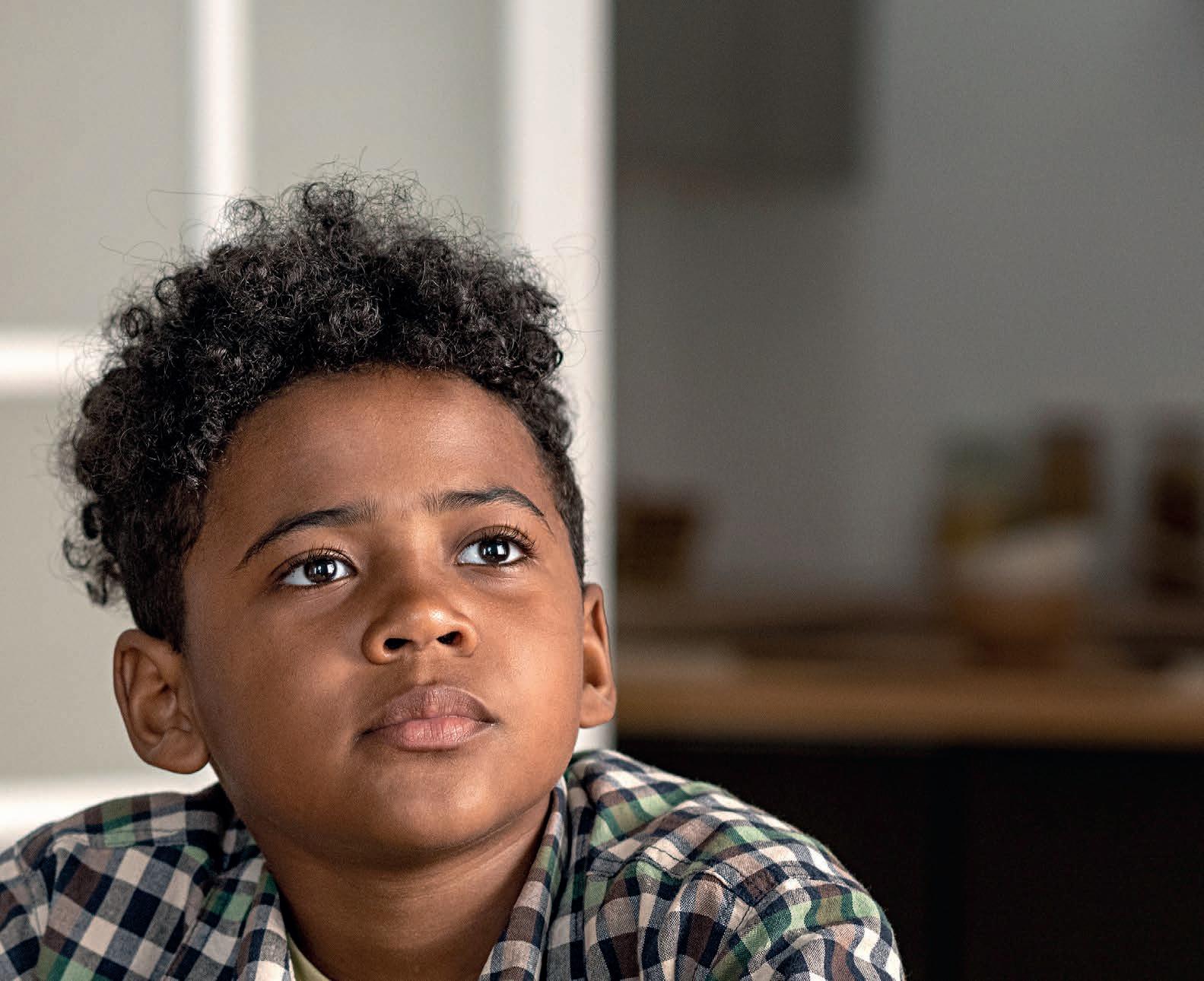
BLACK PARENTS say they are being hoodwinked by schools to send their boys to Pupil Referral Units (PRU).
We can reveal just one percent of children get five good GCSEs at these units.
They have been described as schoolto-prison pipelines, and are compared

to the old Schools for the Educationally Subnormal.



Black education experts say the community needs a revival in supplementary schools to help children through the system.
FULL STORY PAGE 4, 5 & 6
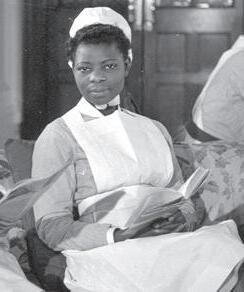
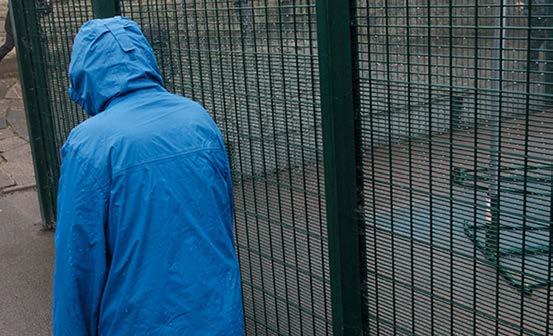
DESPITE decades of debate about racial disparities in school exclusions, the issue is very much unresolved.
Black Caribbean children are still over twice as likely to face permanent exclusion, almost certainly an underestimate due to the extent of schools not recording et nicity in t e first place. is unaccepta le situation is allowed to persist because of the education system; the power given to headteachers to exclude at will, and the relative lack of accountability.



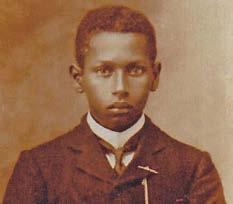

While some exclusions are unavoidable, a large proportion are unnecessary. Often the result of a series of minor demeanours rather than one serious incident.
The motivating factor for many schools is their desire to massage exam results upwards to climb the league table and impress Ofsted inspectors.
Ofsted pays little regard to the failure of the school to work with the pupils to turn bad behaviour around and bring out the talent within them.
Extracurricular support is frequently inadequate, and assessments for special needs support are subject to delays. When Black children are expelled, too many disappear from school rolls altogether.
Teachers also encourage parents to take their children out of sc ool ic amounts to ‘unofficial e clusions.’ Schools are also reluctant to take children who have been permanently excluded from other schools.
Our feature (pages 4-5) also highlights how teachers try to persuade parents to send their children to Pupil Referral Units (PRUs). This, despite the fact that just one per cent of PR pupils et fi e oo Es.
Other children end up in PRUs because after a permanent e clusion ‘ oo sc ools’ on’t accept t em. There are no doubt some PRUs doing a good job, but the overall picture is an alarming one.
Too many PRU children end up in the criminal justice system, making it a school to prison pipeline.

An Black c il ren are fi e times more likely to e in ‘Alternati e Pro ision’ APs t an ite c il ren.



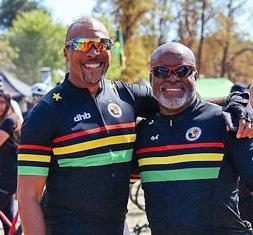



Because PRUs are lumped together with Free Schools, t e AP et nicity fi ure almost certainly is uises e en higher rates of Black children in PRUs.
This is the sharp end of school exclusions; the education system giving up on Black talent and leaving them without exam results and without hope.
PRUs and schools are different sides of the same coin. Both are in need of urgent reform.
AFTER A SUCCESSFUL 75th anniversary Windrush Day, campaigners are now pushing for the story of the Windrush generation to be a mandatory part of the national curriculum.
The Voice, which is backing the campaign, is demanding that politicians listen to schoolchildren, who want to learn about the Windrush pioneers.
A recent survey of 35,000 schoolchildren found that three quarters of them said they wanted to know more about the Windrush generation and their contribution to Britain.
A total of 76 per cent of students in the primary school age category (5 to 11-years-old) also said the Windrush generation should be celebrated more.
Over 77 per cent of pupils in the secondary school age category (11 to 16-years-old) felt that they should learn about the Windrush generation at school.
The poll, by social enterprise Votes for Schools, has sparked renewed calls by education campaigners and community groups for the contribution of the Windrush generation, and the teaching of Black history in schools, to be included as a mandatory part of the national school curriculum.
Author and campaigner Pat rick Vernon says the survey makes a strong case for the sto ry of the Windrush generation to be included on the national curriculum.
They point to the critical role that education plays in creating a better understanding of the Windrush generation’s legacy in helping to create today’s multi cultural Britain.
Social commentator and cam paigner Vernon, who has been at the forefront of several high-profile campaigns on cultural heritage and social justice in the UK, told The Voice: “The survey defi-
nitely makes a strong case for including the contribution of the Windrush generation case in the national curriculum.
“But the campaign has to be part of a wider one to get the education system to acknowledge and teach Black British history.
“A number of community organisations have been campaigning on this issue for some time. But the question is does the government see it this way? And are they going to take actions that incorporate these demands? We have to remember that the conversation around Windrush, and Black history isn’t just about history, it includes geography, literature, the arts. That’s why this is so important.”
Recently, organisations such as the West India Committee and the Black Cultural Archives have offered to support the Department of Education with their educational and archival resources in order to help the national curriculum be revised to more accurately reflect British and Caribbean history. However, there has been a lack of response from the government to the offers.
curriculum have highlighted the fact that sharing the stories about the Windrush generation and their contribution to the UK was one of the key recommendations of the Lessons Learned Review, an independent report commissioned by the government and published in 2020 which examined the causes of the Windrush Scandal.
Juliet Coley-Bremmer, former Senior Deputy head at Gladesmore Community School in Tottenham, north London, agrees with campaigns to get the Windrush generation on the curriculum but says the subject must be taught in an imaginative and collaborative way.
The review, written by Wendy Williams, was one strand of the government’s response to the scandal which saw hundreds of people who arrived in the UK from the Caribbean between 1948 and 1973 wrongly detained, deported and denied legal rights as a result of the Conservative government’s ‘Hostile Environment’ legisla-
Jamila Thompson, a Youth Advocate and researcher with BLAM, a charity that campaigns on Black learning, achievement and mental health
The Voice: “The survey does indeed add further weight to the need for the story of the Windrush generation to be put onto the national curriculum. We have conducted our own research project for over a year into racial discrimination in
the education system and the need to decolonise the curriculum.
“One of the topics that came up in our surveys and teacher focus groups was about ensuring that histories such as the Windrush generation’s are included in the curriculum but also, the difficulties around doing so.”
Thompson continued: “At BLAM we are very aware of the anti-Blackness and anti-Black racism which continues to persist in the education system and the ways in which negative narratives relating to those racialised as Black are pushed through the curriculum.
“Thus for us, teaching about the Windrush generation as part of the national curriculum will ensure that young people have historical knowledge about the contributions of Black people.
“However, that’s only one element. In order to dismantle the anti-Black stereotypes which young people and adults in British society are continuously made aware of, teaching such histories offers another way in which for Black people to be viewed. Such positive representation can help to raise cultural awareness, the esteem of Black students and provide better historical knowledge.”
Campaigners have pointed to former education secretary Michael Gove’s time in office as a key factor leading to the stifling of Black history and literature on the national curriculum.

In February 2013, when Liz Truss headed up the Department
Children want to learn about the Windrush pioneers; Patrick Vernon carries Windrush petition to Downing Street (photos: Getty Images)

of Education, it consulted on draft changes to the curriculum which said that children should be taught about “the Windrush generation, wider new Commonwealth immigration, and the arrival of East African Asians; society and social reform, including the abolition of capital punishment, the legalisation of abortion and homosexuality, and the Race Relations Act”.

Changes to the curriculum were proposed in February 2013 when Truss was education secretary. These included teaching students about the Win-
drush generation, wider new Commonwealth immigration, and the arrival of East African Asians.
However, later that year, when Gove replaced Truss as Education Secretary, this paragraph was removed and replaced with a vague reference to “social, cultural and technological change in post-war British society” and the suggestion that schools could study “an aspect of social history, such as the impact through time of the migration of people to, from and within the British Isles”.
PUPIL REFERRAL Units are failing Black children, who are over five times more likely to be sent to the institutions after being permanently excluded from mainstream schools.
Black parents are demanding the “education to prison pipeline” system be reformed after it was revealed that just one per cent of Pupil Referral Units (PRUs) get good GCSEs.
The number of young people in PRUs has rocketed by 13 percent in the past year, with children often sent there after being kicked out of school for a series of minor offences while other mainstream schools refuse to take them.

Critics say PRUs are reviving memories of the infamous Schools for the Educationally Subnormal, which were abolished in 1981.
The Voice spoke to Black parents who regret allowing their children to attend such institutions, saying the experience has ruined their lives.

Many Black parents are warning others not to accept PRU placements because “your child comes out worse”.
Speaking to The Voice, Cynthia Kirton says she regrets sending her 15-year-old son, JK, to a PRU and now fears for his safety after his friend was stabbed 17 times.
Ms Kirton claims she was forced into sending her son to the PRU and was told at a school meeting that if she does not agree to JK going to the PRU, he would be permanently excluded from school.
Ms Kirton says many of those attending PRUs are heading towards a life of crime, unless there are urgent changes to the system.
Determined to keep her son safe, she is considering drastic action by sending him abroad for a fresh start and for his own safety.
She said: “I want him to experience a different life and be in a different environment without having to live your life looking over your shoulder.”
In September 2021, the mother-of-two says JK was permanently excluded from a north London secondary school, in what she calls the direct “tar-
geting” of her son. She said: “It just felt like on a weekly basis he was being targeted and being given detentions. The detentions were so silly.”
Ms Kirton believes her son was more severely punished for things such as walking out of the classroom, because he is a young Black boy.
She said: “The school was giving him daily detentions and this is how they do it, to tell you your son is no longer welcome.”
Ms Kirton said her son’s former school tries to convince the parents and students to find new schools, but she says when you arrive at the PRU you are in for a shock.
“They sell it to the child and the parents that it is reset, it’s a new school, you can make new friends, it’s a new building.
“But they are throwing chil dren into the PRUs knowing that is where everybody has some sort of issue.”
Ms Kirton said the environ ment at the PRU her son attend ed in north London, is a breed ing ground for criminality.
His mother believes this is down to the toxic culture that is present in PRUs, and says it is not the right place for Black children, who already have so much stacked against them.
“Their expecta tions of the child are very low and I found that they don’t challenge the child enough,” she added.
When her son started the PRU they discovered his reading level was three years behind where it should be, which she says should have been picked up at his previ
ous school. She’s adamant his low reading levels hampered his chances of sitting all his exams.
JK spent his final year at secondary school in a PRU.
According to his mother, he has only done five GCSEs instead of the standard nine. She says this is “because he was so behind where he should be”.
She feels the school has “failed her son” as it was “not equipped to give more attention to a child that needs it”.
Ms Kirton feels the school wrongly labelled JK as badly behaved without con-

sidering he may have additional needs which was triggering his behaviour.
JK told The Voice about an incident at his old school. “I got a detention for wearing a blue surgical face mask back when Covid started and I got a detention after that.
“Then two or three days after, when you were asked to wear a face mask and I didn’t wear one, I got detention for that also.”
Ms Kirton, who works fulltime to provide for her children as a single mother, said the teachers would use detention to get her son “out of class” rather than take time to see if he had any undiagnosed issues or offer him extra support. “It was so evident that they did not care.”
Ms Kirton, who raised her
sons with a strong church background, said she had concerns her son had undiagnosed needs.
JK was tested for attention deficit hyperactivity disorder (ADHD) and autism but both tests came back negative. “He is on the SEN register for his temper,” she added.
According to the school census, there are different types of state-funded Alternative Provision (AP) schools, which include PRUs, Alternative Provision Academies and Free Schools.
Pupils can be sent to AP schools because of exclusions, illness, being bullied, or other reasons.
These schools are for pupils who would not otherwise receive suitable education, but educationalists say schools are excluding pupils to inflate their exam success in an effort to climb the performance league
They sell it to the child and the parents that it is a reset, it’s a new school
ofthe child STRONG VIEWS: Professor Gus John (photo: Getty Images)
tables and impress Ofsted inspectors.
According to the latest national statistics, the number of pupils attending AP schools has increased by 13 percent to 13,200 in 2022/23. Over 70 per cent of PRU attendees are boys.
The latest statistics exclude the specific race or ethnicity of pupils who attend PRUs, but over a quarter of students in AP schools are from an ethnic minority background.
The absence of ethnicity recording for PRU’s specifically is widely believed to disguise even worse disproportionality for Black children, with some speculating that the majority of children in PRUs are Black despite making up four per cent of the overall population according to the 2021 census.
Several educational campaigners and reports suggest
that Black children are disproportionately being sent to PRUs, which have been described as “a dumping ground” for excluded Black boys, some of whom are kicked out of school for “challenging authority.”
The Institute of Race Relations found the proportion of pupils in PRUs and AP schools in London is almost double the national rate, with young boys of Black Caribbean heritage significantly overrepresented in the sector.
In 2022/23, there are 7,470 pupils attending 177 PRUs in England compared to 6,774 in 2021/22. A Department for Education (DfE) report published in June 2022 into Special Educational Needs and Disabilities (SEND) pupils in Britain found Black Caribbean pupils have the second highest percentage (5.4
per cent) of pupils with an Education, Health and Care Plan (EHCP) with only pupils of an Irish Traveller background having a higher rate.
The term school-to-prison pipeline is a popular phrase which was first used in the United States to describe the excessive number of youths in prison, where the first signs of problems occurred during their time in the education system.
For example, being sent out of class, being placed in an isolation room, suspended or permanently excluded are considered the start of the school-to-prison pipeline.
In 2016, the University of Edinburgh found that an excluded student is four times more likely to be jailed as an adult.

Lifelong educational campaigner, Professor Gus John, believes PRUs and other APs are
where children are “cast off” and negatively “labelled for life.”
Speaking to The Voice, he said: “Too many of those PRUs become the antechamber for further institutions.The only graduation those pupils know is from the Pupil Referral Unit to the Young Offenders Institute, and that cannot be right.”
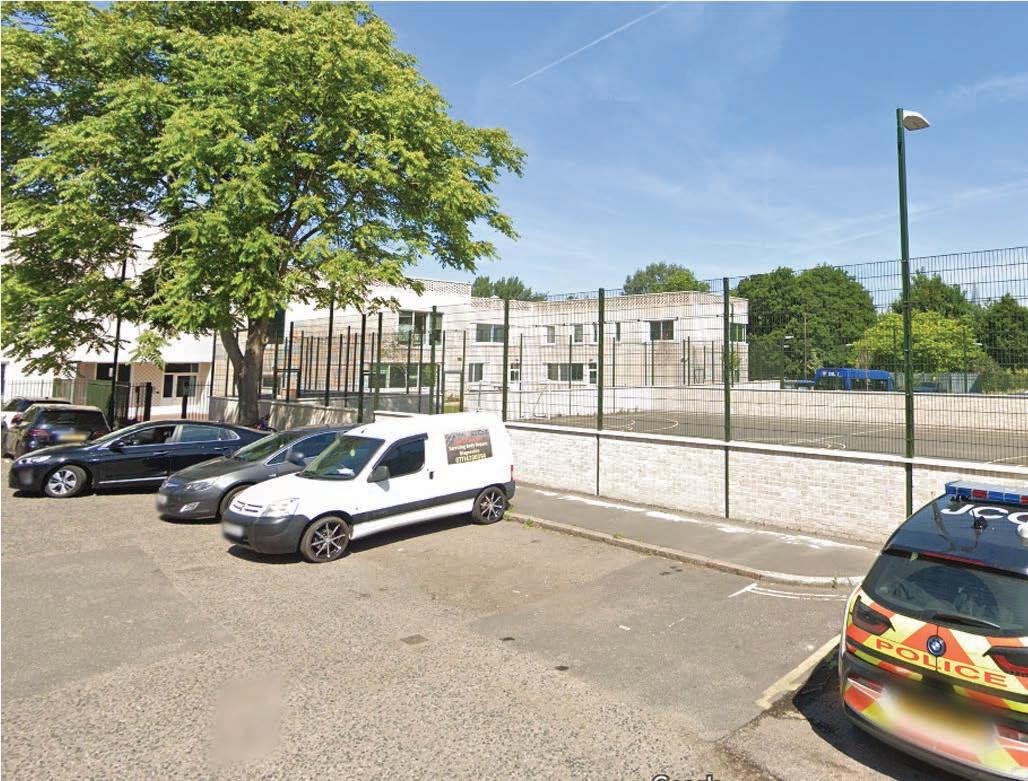
In 2017, the Institute of Public Policy’s report noted that only one per cent of students in PRUs go on to receive five good GCSE
grades. “It’s condemning young people to a life of hopelessness,”
Prof John said.
The researcher and lecturer feels PRUs are just a modern day version of special schools, where hundreds of Black Caribbean children were sent during the 1960s and 70s after being labelled “educationally subnormal”.
Prof John said the Black community needs to urgently address the fact that PRUs are made up disproportionately of young Black children, which is a “major problem.”
He added: “None of our children are safe until we collectively make sure that all of our children can be safe.”
He said sadly it is only a “miniscule number of pupils who get reintegrated into mainstream school once they get sent to a PRU.” Prof John runs a charity called Communities
BACKWARDS STEP: Far left, many Black parents are warning others not to accept PRU placements because ‘your child comes out worse’; above, school to prison poster; left, a Pupil Referral Unit (photos:

Empowerment Network (CEN), which he founded with three others in 1999 and the charity deals exclusively with school exclusions.
He said: “We have dealt with sometimes between 750 and 1,000 school exclusions a year and more than 90 per cent have been Black boys.”
According to the lifelong educationalist, APs and PRUs have created a “two-tier schooling system” which is destroying the lives of those sent to such institutions.
He added: “The regimes that lead to school exclusions are in the main punitive, they are about getting young people to conform to particular behaviours, styles and regimes, rather than helping them to establish a personal individual moral compass.
Continued on page 6
None of our children are safe until collectively all of our children are safeRed Pepper/ Google Maps)
Continued from page 5
“The balance has shifted from educating children in all aspects of their development to focusing on getting them to do academic work and pass exams.”
Prof John started the first Black Supplementary School in Birmingham with a group of colleagues in 1968, which acted as a mainstream alternative to serve the Caribbean community.
According to the professor, disruptive behaviour in the classroom is a legitimate concern but says it should be dealt with in a way that doesn’t include permanent exclusions.
He wants the money that is poured into PRUs and APs spent on keeping children in mainstream education.
He added: “The amount of money spent on these alternative provision spaces, that money might be better spent on reducing class sizes, by having more adults with different skills and competencies work with young people, like youth workers and clinical therapists as part of a schooling team.
“One size does not fit all, children do not all perform the same,” he said.
He added with extra funding, schools would be able to pick up and detect children who have neurodiverse conditions like autism and ADHD, rather than just labelling children as badly behaved.
When asked how he would describe PRUs, Prof John said: “Places that contribute to the destruction of hope and the death of aspiration.”
For other Black parents, sending their child to a PRU has been a positive experience.
Siobhan Clark (not her real name) from Lewisham, south east London, told The Voice her 13-year-old daughter recently started a PRU, after she was continuously suspended from her secondary school.
The suspensions started to affect her daughter’s self-worth and one day she said “I don’t think I’m going to amount to much.”
With the smaller classes at the PRU, Ms Clark said it has been beneficial and her daughter is “thriving”.
The proud mother described her child as “well-mannered and well behaved” but says when she started secondary school her behaviour started to deteriorate and problems would only occur at school.
“She would get detentions
because she was walking out of lessons, answering back the teachers and being disruptive,” she explained.
Instantly alarm bells started to ring in Ms Clark’s mind, as the issues would only happen once her daughter walked through the school gates.
Ms Clark, who is also a school governor, pleaded with the school that she thought there was more to her daughter’s behaviour than just being naughty. She managed to keep her daughter at the school during Year 7.
But by Year 8, she recalls the school regularly suspending her “every other day” which affected her “confidence and selfworth”.
Ms Clark said she asked her daughter why she was walking out of class, to which she replied “I don’t know, it’s too noisy.”
She told the school she felt “there was something else going on” and not to brush it under the carpet as a behaviour issue — but subsequently she ended up spending more time at home than at school.

Ms Clark took drastic action and paid for a private Educational Psychologist to spend time with her teenage daughter.
Following a few sessions, it quickly became clear that her daughter was struggling to understand the school work and did not like loud or chaotic environments.
She said: “She was masking the fact that she does not understand what’s happening, so she has undiagnosed Special Educational Need (SEN) needs.”

Ms Clark said she is disappointed that her daughter’s mainstream school failed to pick up that she had signs of undiagnosed SEN needs.
The Educational Psychologist gave Ms Clark a report with recommendations about how her daughter should be supported in school, which included things like a smaller class size and a one-to-one.
Armed with the recommendations from a professional, she
took them to the school’s SEN team but soon after, they told her they tried all the recommendations and said “it’s not working”.
She added: “The teachers were seeing her as the problem child.”
Ms Clark said she did feel that individual teachers were quick to label her daughter and said race played a part in how her daughter and herself was treated.
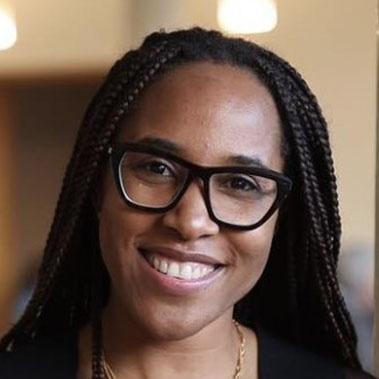
been referred have not been identified. Some mainstream schools just simply don’t have the resources to facilitate. Sometimes it’s impossible for even skilled teachers of big classes to adapt sufficiently.”
teachers toldcontive provision.
Just before the Easter half-term this year, the teachers told Ms Clark her daughter was at risk of exclusion and she would have to con sider an alterna tive provision.
Ms Clark, who works full-time, said she paid almost £4,000 for her daughter to have an Autism Spectrum Disorder (ASD) assessment as the waiting list in her borough was nearly two years.
She said: “She has had an ASD assessment and they don’t think it’s ASD, they do think she has a form of ADHD, which shows up in girls very differently to the way it shows up in boys, you don’t tend to have hyperactivity.
“Ultimately, she has ended up in a PRU because school kept excluding her for behaviours that are a result of undiagnosed SEN needs.”
eli gible for free school meals (57.8 per com pares to 23.8
the overall popu
Over half of pupils in statefunded AP schools are eligible for free school meals (57.8 per cent), this compares to 23.8 per cent for the overall school population.
to the outcomes of pupils who would have nowhere else to go.
Ms Miller said expecting all children to fit under one framework whilst mainstream schools are better trauma informed, they simply can’t adapt the teaching to meet all the needs.
Ms Clark have the finances ASD assessments and are months,
Ms Clark said too many parents do not have the finances to pay for private ASD assessments and are forced to wait months, even years, and by the time they get a formal diagnosis it could be too late.
“There are a lot of children sitting in PRUs or APs that shouldn’t be there because they have additional learning needs or they have undiagnosed SEN needs.
“Something that has got to change, it can’t be that your whole educational future is laid out for you depending on whether your parents can afford to go private or not.”
For those running alternative schools, they say they are actually making a big difference
Lisa Miller, pictured inset left, is the founding principal of Arco Academy in Camberwell, south east London, which is not a PRU but an alternative school for pupils.
She describes her academy as an alternative option to mainstream schools and PRUs and says her academy isalso a “preventative” option for pupils before they arepermanently excluded andend up in PRUs.
She said: “We try to prevent exclusions from happening, however there are some students who are referred, who have been excluded up to three times from their mainstream school.”
Ms Miller said the majority of the students who are excluded “are neurodiverse, so they could have ADHD or ASD.”
She continued: “Very often, the needs of pupils who have
She said those students need to be supported and “they are children who need support to help regulate their emotions.”
Ms Miller said schools need more funding to provide specialist teams who can support students having difficulties and it is becoming increasingly difficult to provide the right resources with funding cuts.
She warned that without the right intervention and setting, it will mean a “perpetual cycle of failure” for children in the future.
Arco Academy is an Independent Sports Specialist School that has smaller classroom sizes; no class size exceeds ten pupils.
“At Arco, we empower all our students to be the best version of themselves —it is always good enough” she said.
There are a lot of children in PRUs or APs that shouldn’t be there
At Arco, we empower all students to be the best version of themselves

BABY AMES Glover went missing in 1990 in Southall, west London, 33 long years ago. He was just five months old. To date there has been no trace of him.
Police appeared to lose interest and the distraught mother, Shanika Ondaatjie, had to plead with them to reopen the missing person’s case 13 years later.
Today, the Metropolitan Police initially told The Voice their records did not go back longer than seven years, despite the case of Madeleine McCann remaining a focus 16 years after she disappeared in Portugal.

After further enquiries, the Met said the case was still open, but then said they were unable to say anything more about it, in reality their files are dusty.
And while a reservoir in Portugal was drained last month in the search for clues about Madeleine’s disappearance, there has been no indication of anything police were doing for Ames.
Baby Ames, now 33 if he is still alive, has slipped off the missing person’s radar. No one in officialdom seems to care whether he is living or dead. Another forgotten Black missing person.











The baby’s father, Paul Glover, said Ames was snatched from the back seat of his car as he went to a cashpoint. Both parents were interviewed by police but no charges were brought.
parents were interviewed by no search-

The mother, Shanika, spent the subsequent years campaigning and searching for her child.
But there has been no news for the last 20 years, since cops visited Ghana in 2003 and offered an appeal after Shanika publicly criticised the Met.
In 2020, she said: “Although I have tried to move on, there will always be a part of me that cannot. I need to know what happened to Ames.”
Black children are four times more likely to be missing than white children. They are less likely to be found a week after disappearing and, astonishingly, Black kids are less likely to have a missing person’s appeal put out to even find them.
Research from the charity Missing People found that missing white people accounted for 61 per cent of publicity appeals while only 22 per cent of missing Black people got one.
Inaction can have fatal consequences, as witnessed by the case of 19 year old Richard Okorogheye, a sickle cell sufferer who was found dead two weeks after he was reported missing in 2021. His family were highly critical of the police, leading to an in-
vestigation by the Independent Office For Police Conduct (IOPC) watchdog which found a series of issues, leading to an apology by the police.
But have lessons been learned?
Dominic Norton, founder of the group Missing Black People, said official record-keeping was inconsistent, but wider issues around race were still not being taken seriously.
“With Madeleine McCann, she was a young girl, but there is lots of research now on ‘missing white woman syndrome’, and that’s what these editors and producers resonate with.
“Typically these women are not Black or from our social economic backgrounds.
“We have to be realistic about the machine of the media. When talking about Black communities what they are leveraging is Black trauma.
“There is no genuine interest in promoting or amplifying the story or campaigning for the family.”
Norton added: “When I speak about the police, whether you’re talking about stop and search, domestic violence, missing people, the issue with them is transparency and communication.
“The response The Voice received from them was not

transparent at all. Are they still searching? Are they not search ing? What does that actually mean?












“The collecting of data needs to be improved. Different police forces report differently, especially when it comes to missing people. There is no consistency across police forces.
“Our recent ethnicity and missing research showed that 14 per cent of missing incidents reported to the police are
for Black children, even though Black people make up just four per cent of the population.
“This over-representation is really concerning because of the risks of harm that missing children face, and so we are working with Listen Up on new research to find out more about Black children’s experiences of being missing to help us understand what more could be done to prevent them coming to harm.




“Our research also found that
Shanika





















Ondaatjie and baby Ames –no one in officialdom seems to care whether he is alive or dead far left a feature from he oice in anuary reporting on a number of missing Black people



Black children are likely to be missing for longer than white children, with families telling us that they struggled to get police and media attention for their missing Black children.
“We are working with partners including Missing People, media agencies and the police to try to address these disparities.”
Missing People recorded that Black children are four times more likely to be missing longer than a week compared to white
children. This raises questions about whether this is just about the individual circumstances of the child, or whether the authorities are spending less time and effort looking.
Research from Missing People published earlier this year revealed that only 16 per cent of missing Black children are found by police, while 23 per cent of white kids were found. The disparity is even higher for looked after children.
MEDIA ATTENTION:
Gerry and ate cCann by a poster for their daughter the case remains in sharp focus years after her disappearance in ortugal (photo: Getty Images)
Jahinine Davis, co-founder and director of Listen Up, said: “You can’t talk about disparities with missing people without acknowledging the impact of racism; without acknowledging adultification; without acknowledging sections of Black children being more seen as deviant, and how these things influence our safeguarding responses to them.”
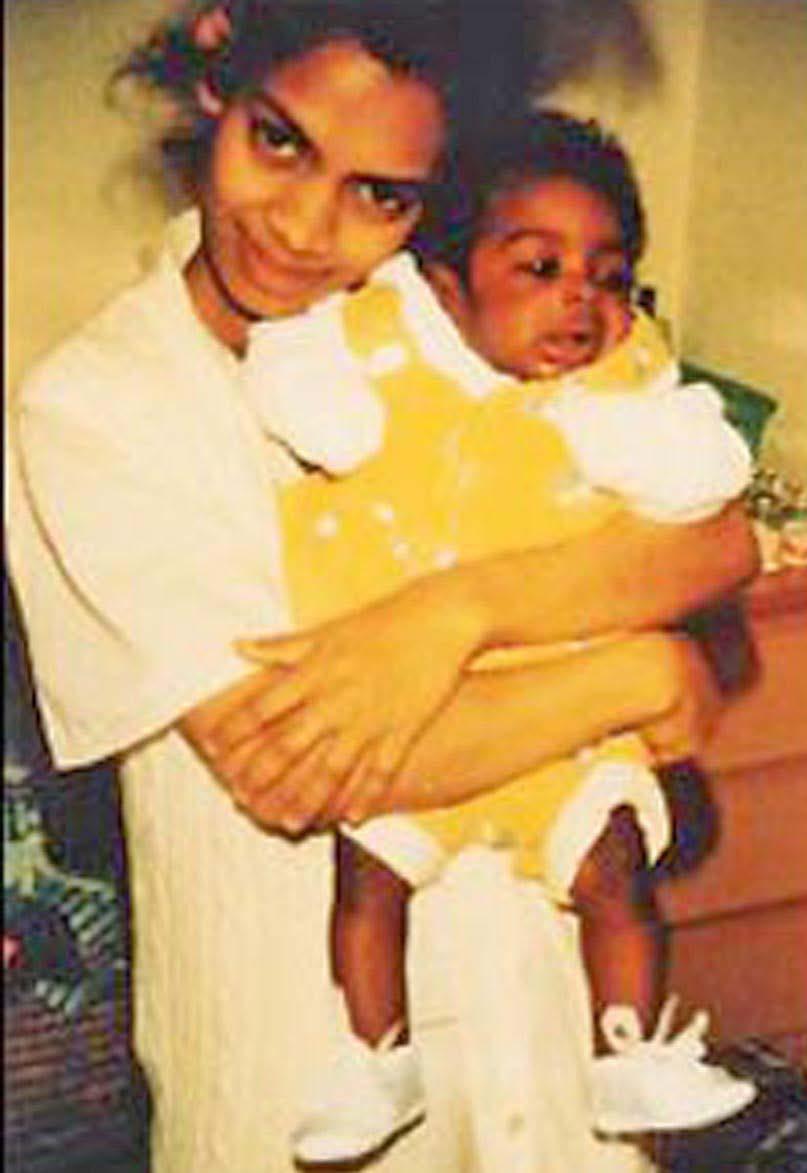
The Met Police said the investigation into Ames “remains ongoing”, with a spokesperson adding they were “not prepared to discuss it any further at this stage”.
The stage being 33 years since Ames went missing and 20 years since the last known action by police to find him.
Baby Ames Glover went missing 33 years ago and authorities have long appeared to give up looking — in contrast to some other cases. By Rebecca MillsBlack people are almost fi e times as likely to e reporte miss failin to take cases seriously sometimes it ea ly consequences. Leah Mahon FORGOTTEN: Steven Durand, Thomas Ogunmuyiwa, Konjo Tesema and Haitham Abaker. At the time of going to press, these were just some of the black people who were classed as ‘missing’
OVER TICKETS18s£18
Friday 14 July 2023 Voices of London
A Making of Black Britain and London Transport Museum event.
Crafts | Talks | Drinks | Music Book at ltmuseum.co.uk


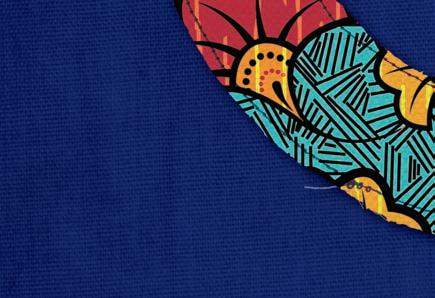



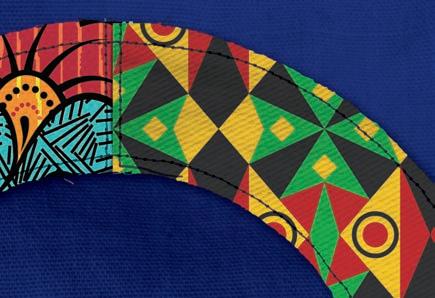








BLACK LICENCE fee payers will increasingly question why they are paying the TV tax if Black radio shows are axed, a BBC insider has said.
As Black communities increasingly turn away from the state broadcaster, the regional Black-interest magazine programmes are the “one remaining reason” to pay the licence, they said.
Less than a quarter of African, Caribbean and Black mixed people watch BBC One, according to new calculations based on the corporation’s latest annual figures and population census data.
With Black viewers increasingly switching to alternative news sources, the radical shake-up of Black interest programming will “take away the legitimacy of the BBC as representing Britain in its diversity”, the source said.
“Black people will be asking; ‘I don’t listen to the BBC (generally) just this show… if it’s axed why am I paying the licence fee?’”
The row over how the Beeb serves Black communities could resurface ahead of the BBC Charter renewal in 2027 unless the corporation can turn the tide.
Discontent is growing among Black producers and presenters, as the Beeb puts the final touches to its reorganisation of local radio output amid a growing listener backlash.
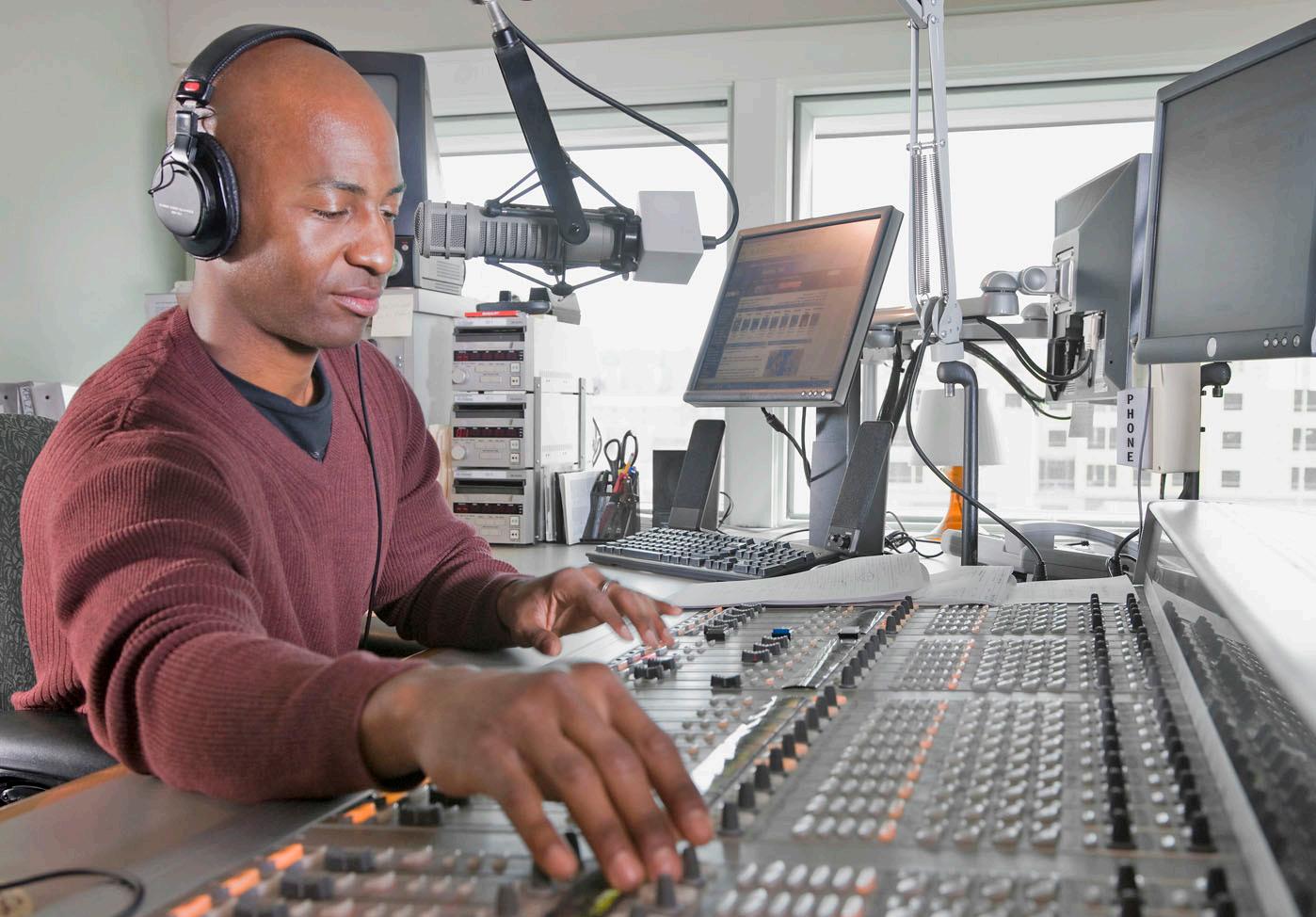
Last month saw vocal opposition to the plans from MPs across the political spectrum, and two strikes organised by the National Union of Journalists.
Rhodri Talfan Davies, Director of Nations who sits on the BBC’s Executive Committee, also got a roasting on the Jeremy Vine show, including criticism that long-standing BBC presenters are having to make “demo tapes” to prove their worth.
Despite a BBC statement issued to The Voice in January suggesting that the Sun-
day evening Black local radio shows would be saved, mergers of regions are still believed to be going ahead in September this year.
The BBC said at the time:
“We have listened carefully to the feedback. As a result, we are making a number of amendments to the original plan in order to strike the best possible balance between live and ondemand services.”
Since that statement, we have revealed that popular Black presenters were denied the opportunity to apply for their own jobs because they were technically freelancers.
Black presenters have told this paper the reason they are freelance is because their shows are chronically under-funded, with some well-known talents getting as little as £200 per weekly show.
Speaking to The Voice, an anonymous source said: “They’ve strung everyone along and hoodwinked everybody like The Voice and BEO (Black Equity Organisation) into believing the shows were saved.
“Some people have kept their shows but it’s very piecemeal across the country. The plans are shrouded in secrecy, and there’s a climate of fear about speaking out with some staff being told they’ll lose their redundancy if they speak out.”
“It’s messy and it’s shambolic, and shabby that freelancers who are effectively staff in all-but-contract can’t apply for these positions. It’s absolutely appalling that it took this long to tell people.”
News about the threat to local Black radio shows first emerged last November, and there was an expectation that decisions would be announced in early spring.
The source said individuals are being told they are saved while being warned to keep it secret, while others fear the axe.
A second source said some Black staff were taking voluntary redundancy as frustration grows about decisions being “strung out”.
There is speculation that London, Bristol and Leicester
shows could survive, but Manchester is still set to merge with Liverpool and Cumbria, and Leeds might not get a Black show at all.
There is discontent that BBC bosses are failing to discuss what kind of content the revamped shows will actually broadcast.
Speaking to Jeremy Vine on his show in a debate about cuts to local radio across the schedules, BBC boss Talfan Davies responded to a question about long-standing presenters having to make demo tapes: “We have to make a reduction in the number of presenters we have.
“It’s really important when you go through an interview process that you allow each candidate to show off what they do, and once we’ve finished the process we’ll publish a station by station schedule.”
Last month BBC journalists held their second 48-hour strike in protest at cuts to local radio output and the prospect of redundancies.
The BBC faces a £285 million shortfall in its income by 2027 due to the decision by former Culture Secretary Nadine Dorries to freeze the licence fee.
However, The Voice has calculated that Black local pro-
grammes get 0.001 per cent of the overall licence fee, which is proportionally 10,000 times less than Gaelic radio service gets per head of population.
The BBC have axed several BBC Africa shows, with sources saying over 600 jobs would be lost.
The BBC say the figure is 382, and it is believed the disparity between the two numbers relates to freelancers.
John McDonnell MP, secretary of the NUJ parliamentary group said: “London needs a specific service due to its range of ethnic diversity, its differing levels of affluence and poverty,
and the scale of its vulnerable audiences.”
The BBC claims changes are needed not just to address the cash shortfall but also to move towards more digital content which appeals to younger audiences.
However, critics claim the BBC has a long history of producing programmes that fail to appeal to young people, and their first priority should be to not lose existing Black audiences.
The corporation’s figures show they are only reaching 77 per cent of the ‘BME’ population across all channels and platforms in an average week, compared to 92 per cent of the white population.
The BBC is putting the final touches to its reorganisation of local radio output

A BBC spokesperson said: “We are fully committed to having black voices on Local Radio and any suggestion to the contrary is completely wrong. When we have made appointments to all of our programmes, we will share that news with our audiences.
“We are maintaining the funding to community programmes, and they will have more broadcast hours not less under the new plans.”












LABOUR HAVE committed to making a Race Equality Act a “core part” of their manifesto for government.
In an interview with The Voice, Labour’s chief equalities spokesperson, Anneliese Dodds, gave her strong backing to plan to prioritise tackling systemic racism.

Dodds, the Shadow Secretary for Women and Equalities, moved to tackle scepticism in the Black community over Labour’s programme for government as she endorsed the work of the race equality policy group led by Baroness Doreen Lawrence.
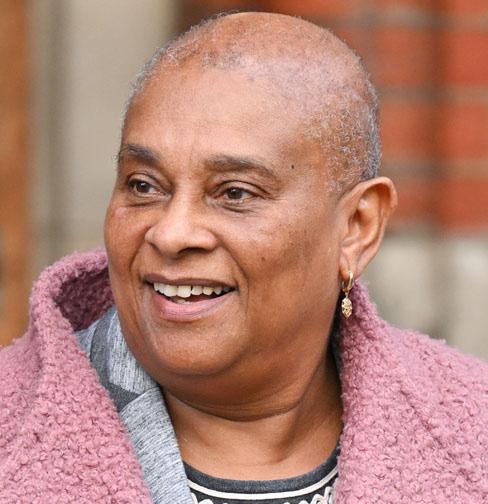
Plans for a Race Equality Act, first announced in 2020, would form a core part of Labour’s manifesto at the next general election.
She said: “Keir Starmer, two years ago, was absolutely clear that he wanted to see a new Race Equality Act and that was one of the first legislative commitments that the Labour Party has made under Keir’s leadership, and there’s really strong political backing for this.
“We want to make sure that this is a really easy to implement set of policy proposals that we’ll be able to put in place quickly to make that change that’s so desperately needed.”



Labour’s move to reaffirm their commitment comes amid growing scepticism within the Black community over the party’s prospects of tackling systemic racism.
Recent months have seen several Black MPs speak out over what they say is a lack of real response to the Forde Report, which identified a hierarchy of racism and anti-Black racism in the party.
Martin Forde KC, who was commissioned by Starmer to write the report, has been openly critical of “lack of action” to address his recommendations.
Labour are currently procrastinating over what to do concerning the suspension of Diane Abbott MP, who was kicked out
of the parliamentary party after a letter to the Observer newspa per in her name, on the topic of the hierarchy of racism, was ac cused of underplaying the Holo caust against Jews.
A petition to restore the whip has attracted over 1,800 signa tures, and any move to prevent Abbott from standing as a La bour candidate at the next elec tion is certain to provoke a major backlash among Black voters.


Dodds branded the govern ment’s Rwanda deportation scheme “immoral”, suggesting that the party would scrap it if they win power.
Tackling the disproportion ately low rates of pay by fining companies not acting on the data is a Labour priority accord ing to Dodds, as is confronting workplace discrimination.

She added: “On ethnicity pay gap reporting we think the evidence is extremely clear that this is necessary, we’ve introduced ethnicity pay gap reporting for the Labour Party and its staff, we think it’s just excuses being put forward at the moment, we want to see it enacted.
“That’s a clear policy commit ment. We need to have a really strong focus on looking at those inequalities within the labour market.”
Dodds also reiterated that La bour would follow through on the remaining recommendations of the Lammy review while tack ling disparities in healthcare, in cluding Black maternity deaths, another key area agreed on by experts and stakeholders draft ing a list of priorities to poten tially make the manifesto.
“There’s a focus on health inequalities, including our de termination that we will not ac cept that enormous gap in Black maternal mortality obviously now four times higher (for Black communities) we would have a target to drive that down, we’d have that massive workforce boost to drive that continuity of care,” said Dodds.
SUPPORT: Labour’s chief equalities spokesperson, Anneliese Dodds, left, endorsed the work of the race equality policy group led by Baroness Doreen Lawrence, right (photos: Getty Images)
Get a new pair, at a new price
Glasses now from just £15By Leah Mahon
AS A survivor of domestic abuse, Penelope* wants to ensure that how the intersection of race and gender impacts Black women is never lost in the fight to end violence against women and girls.
The police and specialist agencies supporting domestic abuse survivors are being challenged to implement cultural awareness training through Valerie’s Law, something that Penelope believes is more important now than ever.
In 2014, on a night out in south London, Penelope would go on to meet her now ex-partner who would become the father of her first child.
Her ex, a white man, had a ‘type’ with all his previous partners having been Black women, just like her. She says that race was always a part of their relationship, but she wouldn’t realise it till much later.
“I feel he sought me out because he thought he’d be able to control me, that somehow because I’m a Black woman I might have had low self-esteem.
The way Black women are depicted in society and especially in the media, he saw me as an opportunity to take advantage of that situation and those stereotypes,” she tells The Voice
“It wasn’t just about the relationship, it’s very much about what he could get out of it. He viewed me as someone with assets that he essentially wanted to get his hands on. He lived beyond his means constantly and needed someone to help support and fund that lifestyle, for example he asked me to lend him money to buy a car, even though he already owned more than one car.”
In the early stages of their relationship, the mother-of-one recalls how she was frequently ‘love bombed’, told how much he was in love with her, and had a ‘pre-mediated’ approach that eventually saw him move in with her. Penelope says that’s when the abuse took a violent turn.
“It was moving away from all the love bombing. Things that he would do were have crazy outbursts of rage, breaking your stuff, he smashed my wardrobe with his mobile phone,” she says.
“There were always threats to knock me into the middle of next week… basically a threat
to kill somebody.” Penelope was subject to what she calls extreme name-calling, where he regularly referred to her as a c**t, and once pushed her so hard she cracked her head on a table.
“After I had my daughter, I had a Caesarean section and basically it was maybe three days after she was born. He rugby tackled me because I was cleaning the kitchen with the wrong sponge.”
She became trapped when she realised that DIY work that he had started on her house involved him taking it apart and never putting it back together.
She describes a time how she and her daughter were forced to live in her home with the windows boarded up and electrical wires undone as a ‘death trap’.
Looking back on her ordeal, Penelope says that her ex-partner definitely made race a part of the abuse, but only now realises the nuances.
“He used to mock me and call me this ‘independent Black woman’. So, for him race absolutely played a part. But, not being ashamed of my race or not having an issue with it, I just thought nothing of it, because I am independent. And I am strong. Racism was always a part of it, but I didn’t know it yet.”
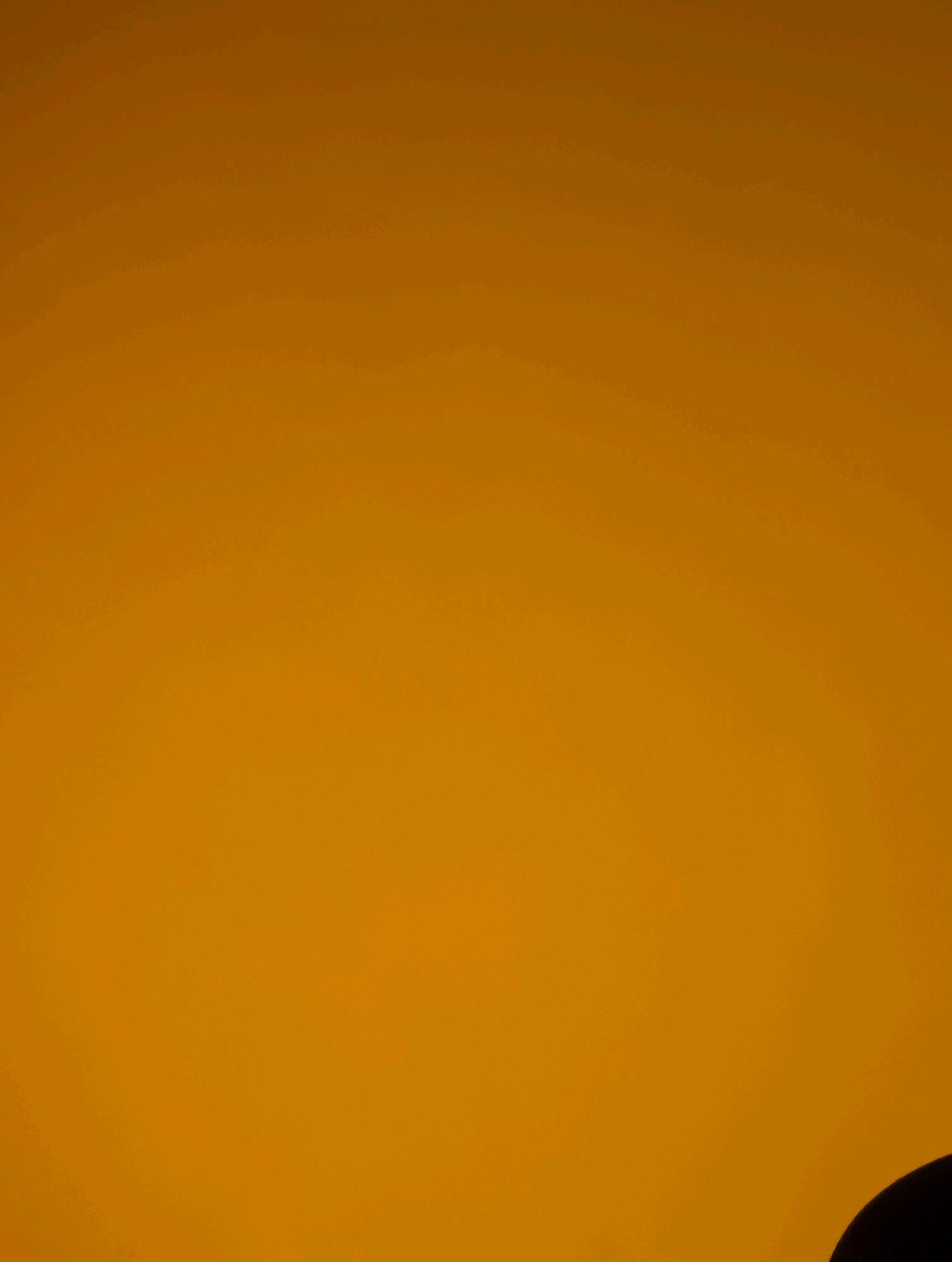
Savannah Fuller, who works closely with domestic abuse survivors at Sistah Space, tells The Voice that Black women often deal with this “double oppression” in the abuse they suffer and from the responses of those meant to protect them.
“There is this masculinisation of Black women. It’s not just the physical things, you might not notice that my skin’s bruised, you might have a stereotype or prejudice that Black women are always angry or agitated,” she explains.
“So, [agency workers] might not understand that someone might be going through mental health issues because of this domestic violence.
“There’s also a general institutionalised stereotype that Black women or Black people in general can handle a lot of pain, and that their pain might not be as severe as someone else.”
Earlier this year, the Casey Review only affirmed this stark reality when the Met was branded as institutionally rac-
ist and sexist; over policing and under-protecting Black people, and failing countless women who were victims of abuse.
Before she went to court, Penelope admits that she found the police involvement at first “reasonably helpful,” but things took a turn for the worse when her ex-partner chose to use their daughter as a “pawn in his own game” after she raised concerns about her welfare while in his care.
On the advice of her doctors, they told her to get out.
“He actively went to the police and told them that I was harassing him because I sent him a series of emails concerned with his neglect of the child we share. Her teeth hadn’t been brushed, and she was crying because she hadn’t eaten. So, it was a welfare issue,” she says.
Once the police were aware she was in a mixed-race relationship, Penelope says they refused to investigate the complaint and she was left with the
allegation on her file till this day.
They even went as far as to claim that the countless incidents of abuse she reported were untrue, until the court dismissed their argument.
Throughout the court process, she recalls how the defence frequently made her out to be “resilient enough” or that she felt she had to live up to notions of being the “perfect victim”.
She says: “When we broke up, he [her ex-partner] used my race against me at every single
opportunity… everything was about race, [during the court process] without actually bringing up my race.”
According to Victim Support, around 48 per cent of Black and ethnic minority victims who reported domestic abuse to the police felt they were treated differently compared to other victims because of their ethnicity.
In February 2022, The Voice reported that police forces charged alleged perpetrators in 6.7 per cent of cases where the
After experiencing domestic abuse, Penelope tells how race impacts survivors.
Racism was always a part of it, but I didn’t know it yet
domestic violence victim was White compared to just 5.5 per cent where the victim was Black. In the UK, there are fewer than 30 specialist refuges by and for Black and minoritised women, leaving a considerable gap in the way that racial trauma is dealt with by trained professionals.

Fuller believes that there needs to be a complete overhaul of responses from organisations meant to protect Black women

who experience domestic abuse from the police, criminal justice system and specialist agencies.
The Voice is supporting the Valerie’s Law campaign by Sistah Space to make it mandatory for government bodies and support agencies to undertake cultural awareness training geared towards the needs of Black abuse survivors.
Whilst campaigning for the historic legislation, Sistah Space are still offering their specialist training throughout the UK.
“As much as we work with
Black women, Black women are just people, so if you are a domestic violence charity, you should be able to do your due diligence with a client who is a Black woman who may need specific care,” explains Fuller.
“They are important [Blackfocused domestic abuse agencies] because it’s the comfortability and awareness that we’re listening to them, and that they don’t need to explain the racial trauma, or they don’t have to go into depth on why they think certain things are off.”
Fuller says training domestic abuse services to understand the specific needs of Black women could begin with how to interact with the police to have the right products for Afro hair in refuges, and refuges being in mutli-cultural areas.
Now in the post domestic abuse phase, which usually focuses on litigation abuse and financial abuse, Penelope has been supported by domestic abuse charity Refuge. She says the agencies
VICTIM : Valerie Forde and her baby were murdered by her ex-partner in 2014. Police and specialist agencies supporting domestic abuse survivors are being challenged to implement cultural awareness training through Valerie’s Law (photos: Sistah Space and Nicole Jacobs) she did turn to in the aftermath of the abuse didn’t know how to deal with complexities of her racial trauma, but is sceptical of progress being made amid “antiwoke sentiments”.
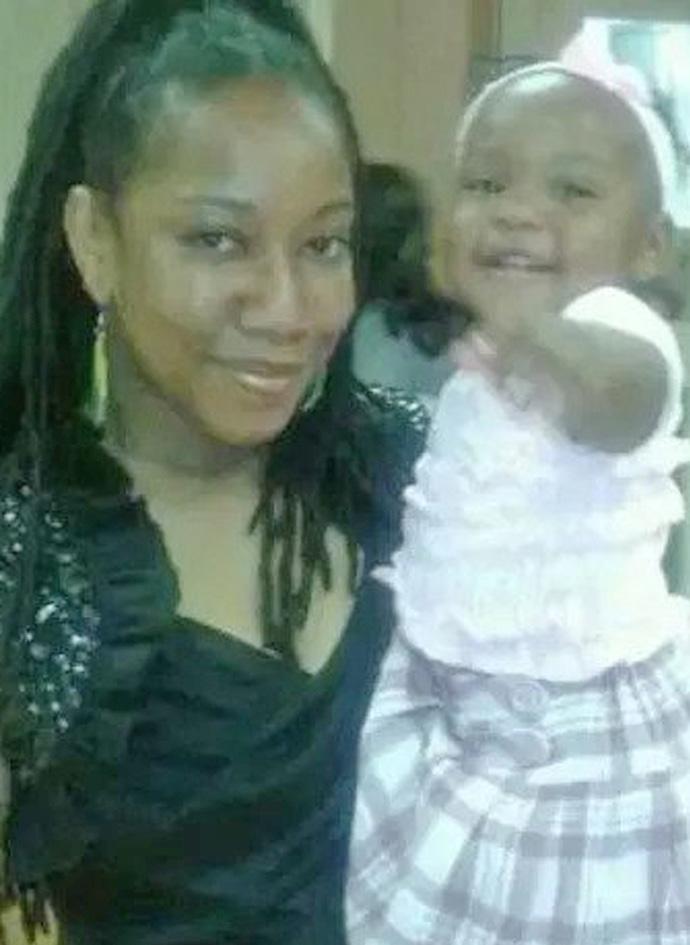
“There’s always someone saying not all policemen, not all men are abusive, not all women are this, but there is never, ever anyone to say not all Black women are aggressive,” she says.
“We can say, there needs to be training, there needs to be antibias training. But if the white person who’s delivering this anti-bias training is worried about whether their children are going to have a job, they’re not going to promote it.”
For’ organisations. This funding would help build capacity in ‘By and For’ organisations, providing vital support to Black and minoritised survivors who often face severe barriers in accessing services,” she says.
“We also know that many survivors with no recourse to public funds (NRPF), who specialist ‘By and For’ organisations often support, will not report their experiences to the police because they are frightened that their information will be shared with immigration enforcement.
-ac-
A 2023 re port by the Domestic Abuse Commissioners showed 78 per cent of Black and minoritised survivors felt safer when they had ac cessed service run by and for their ethnic group.
However, these organisations are six times more likely to not receive any statutory funding than other types of specialist VAWG groups.
Nicole Jacobs, inset, the Domestic Abuse Commissioner for England and Wales, tells The Voice they are introducing plans to not just train professionals in the sector, but also ensure they are funded enough to thrive.
“My office is developing a proposal for the Government to create a funding pot for ‘By and
“I strongly advocate for a firewall to be established between the police and immigration enforcement to enable survivors with NRPF to safely report domestic abuse. My office continues to push for this firewall to be introduced in the Victims and Prisoners
immigration enforcement to sur domes contin for Prisoners Bill.”

She added: “The tragic case of Valerie Forde is indicative of the experiences that many Black victims and survivors face when they try to disclose domestic abuse to the police. This is why it is so critical that police have training to understand the nuances of the experiences of Black victims and survivors of domestic abuse, and we thank Sistah Space for their tireless campaigning for Valerie’s Law.”
* Name changed to protect identity
Studies highlight how chemical relaxers can have a damaging impact on a child’s health, so why aren’t we prioritising their well-being?
IRECENTLY DROVE to Brixton to buy some products for my hair. As I browsed through one of the stores, I noticed the huge range of chemical relaxers on display, many of which were explicitly targeted at children. In fact, they were explicitly targeted at little Black girls, to be precise. It reminded me of my own childhood, and the different hairstyles I went through whilst in my school years. Many of my friends and I had relaxed hair growing up. It was often perceived as “easier to manage”, especially when having to do swimming lessons and water activities at school. Getting
fairly common in Nottingham. But just because something is common, does not mean it isn’t damaging.
Now, a hair relaxer isn’t some sort of soothing, luxurious, beauty treatment. I very clearly remember the cream smelling like bleach, and how it used to burn if my hairdresser left the product on for a minute too
hairdresser telling me to let her know when the relaxer “starts to sting my scalp”, so that she could then wash it off. Looking back, it’s pretty shocking to think that this was, and in many cases still is, considered a completely normal hair treatment for children.
I suppose it goes back to the idea mentioned before — that hair relaxers are all too frequently seen as a quick way to make a child’s hair more “manageable”. But we have to take a moment to ask ourselves, is this really the case? Is straighter hair genuinely easier to manage, or do societies simply spend more on educating us about how to take care of straight hair?
Now I know some may be thinking “it’s my hair, my choice” — and I do understand that. It is up to grown adults to decide what they do to their hair and how they want to style it.
of around 34,000 women aged 35-74, found that the women who reported using chemical straighteners had double the risk of uterine cancer compared to the women who did not use these products.
CHEM TRAILS: Hair relaxers contain damaging chemicals (photo: Getty Images)
natural hair as it is, and knew from a fairly early age that relaxers weren’t for me.
your hair relaxed as a child was long. I even remember one sus expe dermatolo ac educa
Let’s not forget that fine hair is prone to split ends, and straight, fine hair is highly susceptible to breakage. A lot of us already know this. But what I also know from first-hand experience is that (in the UK) there is a significant lack of dermatologists, experts, trichologists and even doctors who are specialists in Afro hair.
And that’s why I think it’s so important that we move away from this preconceived notion that our hair is difficult and hard to manage, when in actual fact, it may be the case that there’s simply a lack of education, and a considerable amount of misinformation, about our natural hair.
But children on the other hand? I think there needs to be greater regulation and more protection for this age group. As an adult, you can make the decision for yourself knowing the long-term damage it can have on your hair and overall health, but how are children meant to understand these risks? Should they honestly be tasked with making such serious decisions?
Calling a hair relaxer a “serious decision” might sound like I’m being overly dramatic, but the genuine dangers associated with them have been uncovered by a variety of studies recently. In cutting-edge research released in October 2022, a National Institutes of Health study
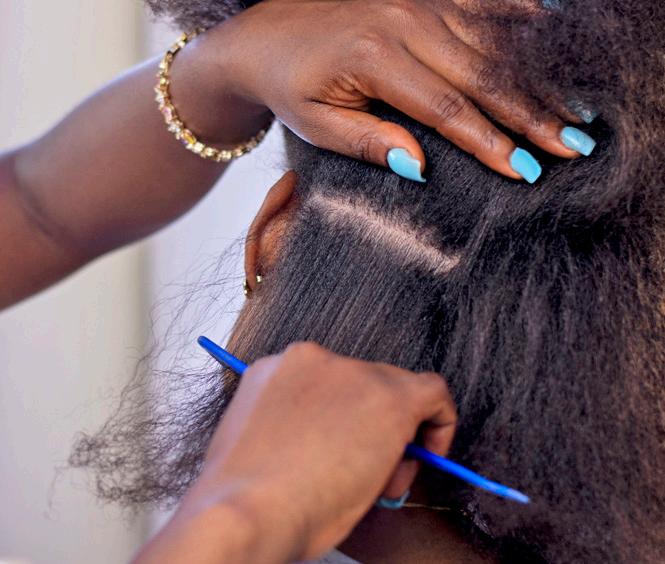

In addition, a 2021 Oxford University Carcinogenesis Journal study found that frequent, long-term use of lye-based relaxers could have serious health effects, including breast cancer. And let’s not forget it was only two months ago that L’Oréal was publicly urged to withdraw their hair relaxers after studies showed potential linkages to cancer.
The above really does highlight how serious the issue is. One thing I will say is that I’m so happy that I didn’t continue to relax my hair as I grew through my teenage years and left school. I remember getting older and starting to reflect on why straight hair was perceived as more desirable, realising that it clearly had ties to eurocentric standards of beauty. I love my
As I finish typing this article, I know there will be some readers still thinking that “parents should be able to do whatever they want to their child’s hair”. But most of us happily accept the fact that the majority of societies, including the UK, already have a range of laws in place to protect the health of children.


The fact of the matter is, there are countless studies that highlight how chemical relaxers can have a damaging impact on a child’s health. So if not now, then when will we prioritise the well-being of children? In my opinion, a child’s health and well-being should always take precedence over beauty norms — especially norms that reinforce eurocentric, racialised standards of beauty.
A hair relaxer isn’t a soothing beauty treatmentRELAX? DON’T DO IT:: A stylist taking care of her client’s Afro hair (photo: Freepik)
TrinitySELT,helpingyoutolive,workandstudyintheUK
SecureEnglishLanguageTests(SELTs)

approvedbyUKVisasandImmigration(UKVI)
Citizenship,SettlementandParent/PartnerVisaApplication(A1-B1)
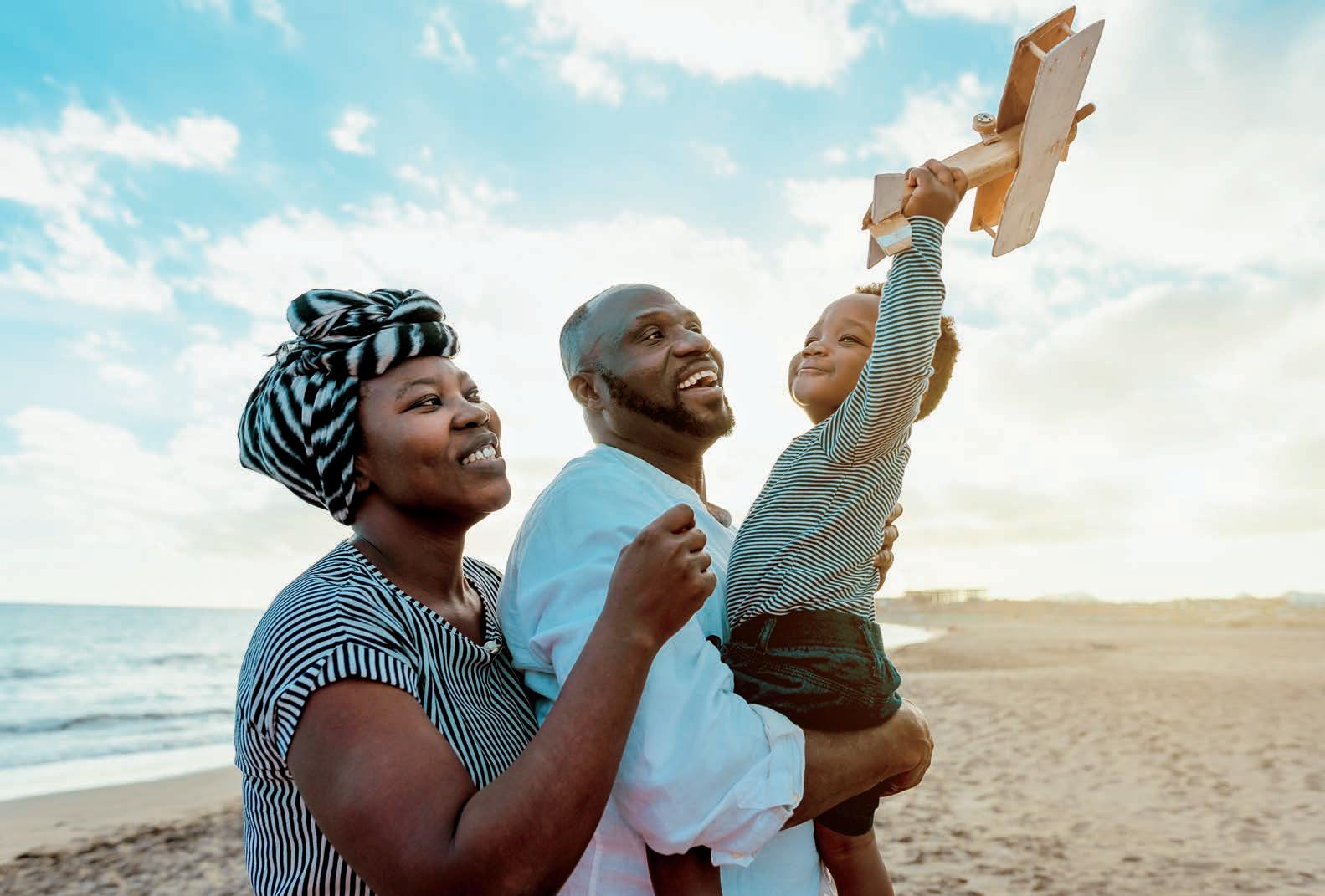
GESE:GradedExaminationsinSpokeEnglish
AspeakingandlisteninginEnglishtestavailableatlevelsA1,A2,andB1
TestsavailablesevendaysaweekatcentresUKwide
Provisionalresultemailedby9amthenextdayandcertificatesemailed within7days
TrinityCollegeLondonisproudtoofferfreeexampreparationstudymaterials andresourcestogiveyouthebestchanceofpassingyourSELTtest.
UseyourphonetoscantheQRcodeorvisit
Trinitycollege.com/SELTtofindoutmore




THE EVENT ALSO SHOWCASED THE DESIGNS OF FITZ STREETWEAR, CLOVER FROM CENTRAL SAINT MARTINS
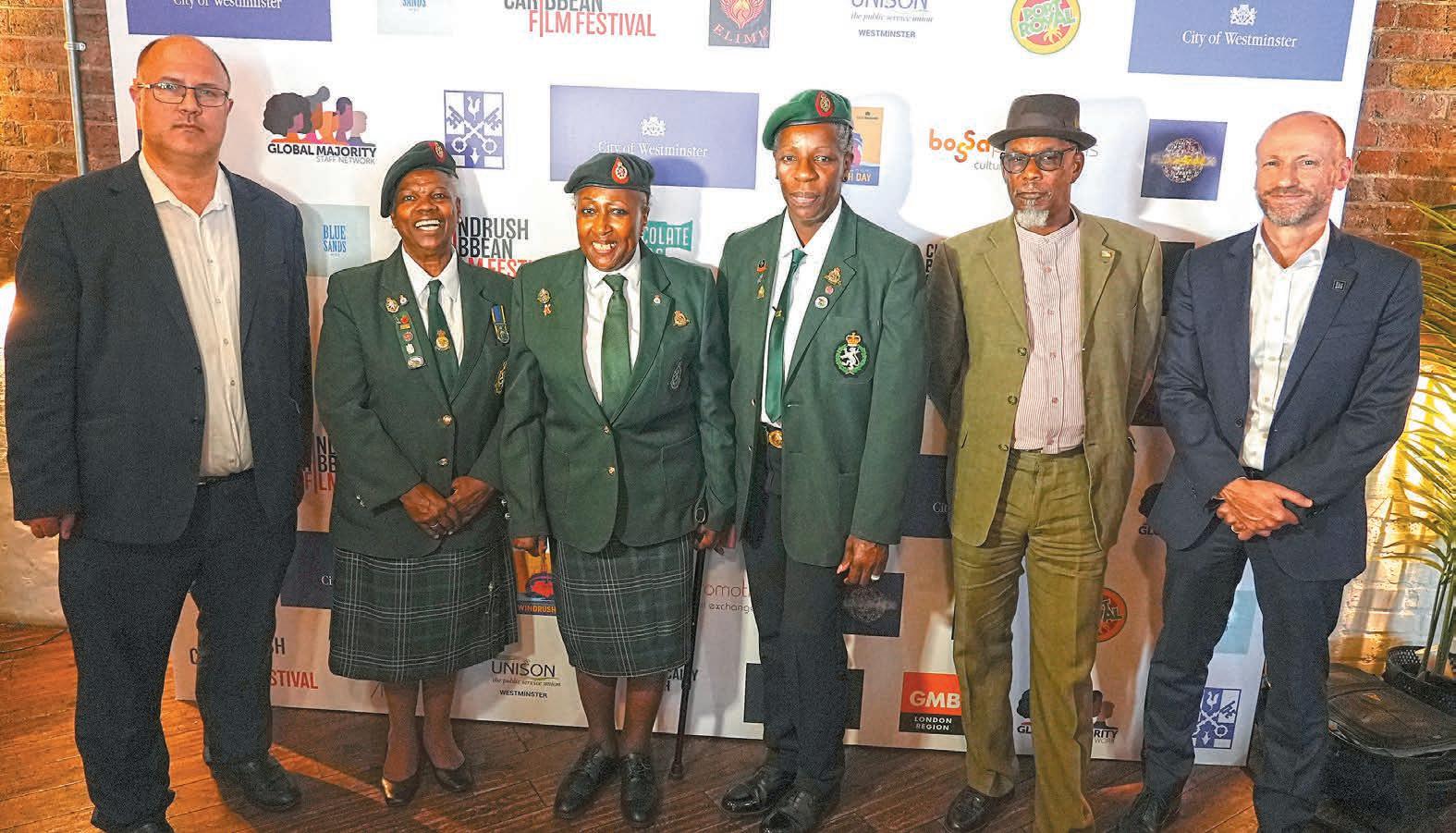

This year we marked the 75th anniversary of Windrush with a film festival held at Picturehouse Central in Piccadilly Circus. The event featured the documentary film ‘Still We Rise’, films from 1000 Londoners and Chocolate Films and ‘Dolapo is Fine’ directed by Ethosheia Hylton.

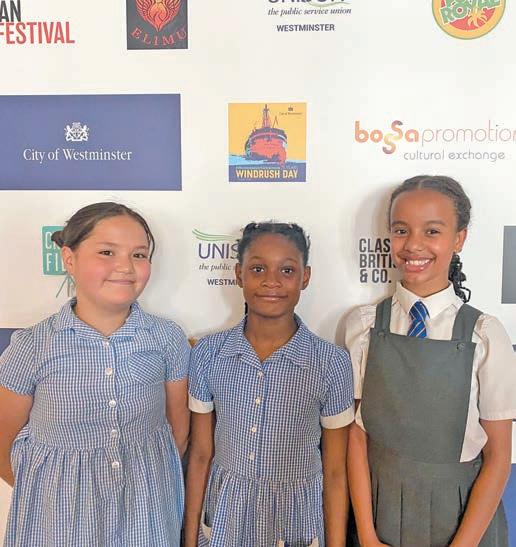
Guests also saw performances from singer Peter Straker alongside St Peter’s Eaton Square Church of England Primary school, British soul singer Omar, Queens of Lovers Rock Janet Kay and Carroll Thompson, Queen Laya and Heather Small. The event also brought together members of the community as well as Westminster residents who are part of the Windrush generation.
Eva Rose a student at St Peter’s said: “I’m really excited because we get to carry on the legacy of the people that came here and what they have done for our country.”
Carol Curtis, a festival attendee said: “This event is important for me because the people who came over here to rebuild this country were treated badly and it’s a real shame. It’s important for us to remember these people and what they did for this country.”
The event also showcased the designs of Clover from
Central Saint Martin’s whose work will be showcased at City Hall and included on the road at Pride in London 2023 on Saturday 1 July. The council is looking forward to marking Pride this year including the designs from Clover as Windrush Meets Pride for the first time.
designs





Why we celebrate Events such as Windrush and Pride are opportunities to acknowledge and celebrate our communities to ensure they have more equal and equitable experiences. We have been working hard with those communities to respond effectively to their
On Windrush Day, we took a moment to reflect on those from that generation and their descendants (particularly from the Caribbean) who answered the call from ‘the Motherland’ to come and help.
Councillor Adam Hug, Leader of Westminster City Council said: “Westminster has been delighted to partner with its Global Majority staff network, local trade unions and others to celebrate the 75th anniversary of Windrush. That means recognising the history and the contribution the community has made in the past 75 years. We are also reflecting on the situation today and looking to see what more we can do to help our communities in the ongoing fight for justice for the Windrush generation.”
We are taking to the road at Pride with the Rainbow Network and Elimu Mas Academy, a carnival charity in Westminster who are showcasing its 2023 costumes designed by Helen Davenport, Debbie Gibbs and Nadine Duval. Fitz Fashion and Queen Laya will be going out on the road at Pride along with Westminster Unison, they will also be on the road at Notting Hill Carnival in August. Visit our website to find out more www.westminster.gov.uk/pride-month

Heather Small, British soul singer and former lead vocalist of the band M People said:


“I’ve been an ally for a very long time. I think that the LGBTQ+ community has that resilience, that strength, that Pride. I grew up as an outsider, so I know what it feels like to be on the other side of what’s happening and having to demand the best and having to work hard for the best. It’s a community of people that I think band together and look after each other and I like that sense of community. Community will always win with me.”

Clover Nash said:
“The initial concept for my collection was about looking at myself as a child, how I struggled to find belonging. My grandad came from Trinidad decades ago as part of the Windrush Generation - he was an extremely stylish man and I thought it would be useful to look at the culture. That influences the colours and makes it very celebratory of my ancestry.
I was excited to get the opportunity to showcase my work at the Windrush festival. I think its important to do events like this because often the level of work the Windrush generation did goes unspoken, it was an integral part of rebuilding the country. You couldn’t imagine London without Notting Hill Carnival and so much of the colour of the city and the country comes from that.”
Helen Davenport, Elimu Mas Academy said:



“It’s an amazing day for Windrush. The Windrush Generation came over and made Britain their home and they are part of British culture. Because so many cultures merged, as my family did, I’m very proud to be a part of this new culture of dual heritage.”
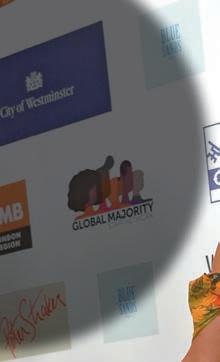

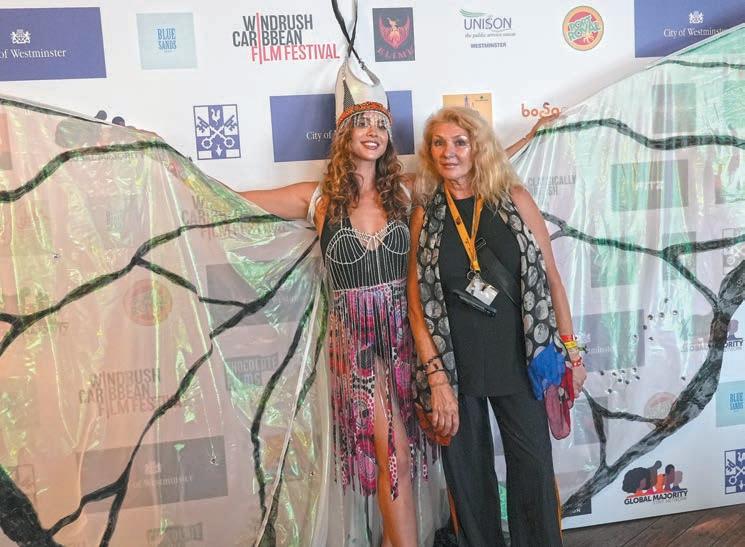

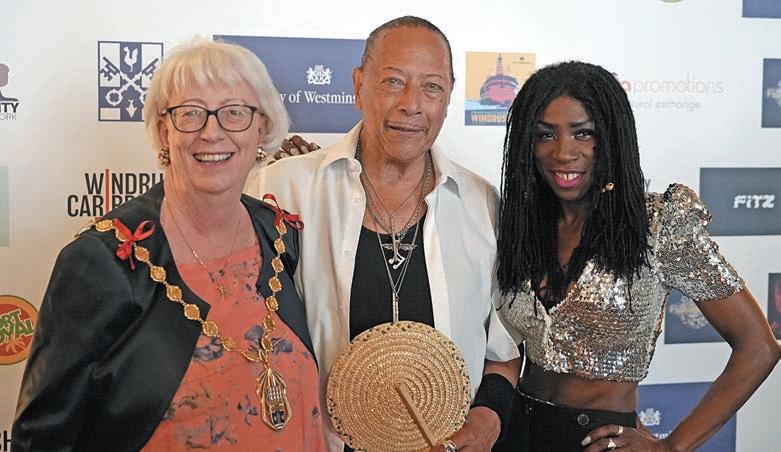

2 3




The NHS is teasing away the very people Ghana and Nigeria need to build their own health service (photos: Getty Images)

THE GREAT Black British dilemma can be summed up in three simple letters: NHS. It is what brought us here on the Windrush.
But is it bang out of order, 75 years on, that it continues to bleed the health services in Nigeria and Ghana of the best of their very best health professionals? Or does it continue, 75 years on, to offer an opportunity for young people in the diaspora with hope in their eyes to earn a decent wedge and to dream of returning home to retire in a castle in the sun that they have spent saved up for years to build?
Do you see why it’s a dilemma for us?
On the one hand you want to stand up for your Black brothers and sisters in the diaspora because you know what they go through.
We are kith and kin, and keen to observe the laws of nature that dictate that we feel their pain, as much as they try to relieve us of our pain when their nurses fly over here to work in
our health service. If our brothers and sisters in West Africa are losing out because Britain can throw cash at the problem of a big black hole in recruitment and retention of NHS staff by teasing away the very people Ghana and Nigeria need to build their own health service, are we not complicit?
After all, it’s done in our name. To relieve our pain.
Last year, more than 1,200 nurses from Ghana alone joined the UK’s nursing register.
“It’s out of control”, says Howard Catton, who is the head of one of the biggest nursing groups in the world, the International Council of Nurses (ICN).

Do you see why it’s a dilemma for us?
Because on the other hand, which one of us is going to stand in the way of our brothers and sisters’ legitimate aspi-
rations to improve their circumstances, not least financial.
We all love to travel. Especially when we are young and, let’s face it, most of us would have jumped at being given the opportunity to see the world whilst working. I totally get that.
And, albeit on a smaller scale, are these nurses from Ghana and Nigeria not coming here for the very same reasons that the original Windrushers came here?
To earn a bit more corn than they could back home. Given the opportunity. That is the dilemma. And I genuinely don’t know which way to turn.
If I turn one way, all I can see is the mad scramble for Africa in the 19th century after slavery was abolished in many of the European countries and, instead, Britain, France, Italy, Portugal, Spain, Belgium, Denmark and even Germany agreed to carve
up the continent to suit themselves. When I turn that way all I can hear is Peter Tosh singing ‘Gimme back me pearls, me rubies and me diamonds... and all the other wealth that has been stolen from the continent by Europe’. That’s all I can hear when I turn the other cheek.
And then my revolutionary instincts remind me of that great book How Europe Underdeveloped Africa by the legendary Guyanese philosopher Walter Rodney, and makes me wonder whether this is not a prima facie example of Britain underdeveloping Africa, or at least the African NHS.
I so much want to go down that road, I can’t tell you.
However, I can’t help thinking, if it’s a choice between me lying on a hospital trolley in my local A&E waiting to be seen by a non-existent doctor and being told many hours later by an overworked and overstressed nurse who is looking after another 100 patients at the same time, to go home and come back when “it really hurts”, then I’m thinking ‘sod Nigeria and Ghana’s health
services, send over as many of those nurses and doctors as you can get your hands on and send them over fast because we need them here today. Tell them we’ll double their wages.’
You see, when it comes to our brothers and sisters in Africa we love them until it comes to “us or them”. And, you know what, when the pain of sickness starts licking unbearably, I’m afraid to say it is “us”.
As it is for Brits as a whole. And the government knows that. As embarrassing as it may be for the nation if the headlines changed and started reading ‘On Its 75th Birthday NHS Propped Up At The Cost of West Africa’s Health’, I’m pretty sure the Prime Minister will be confident in his own skin that the Great British public will forgive him for raiding the great West African health care system of its talent and causing a brain drain.
I daresay Mr Sunak knows we wouldn’t complain too much either. Particularly those of us who have reached a certain age and we have never been able to take out private health insur-
ance and we see the NHS that we built crumbling all about us.
What would help of course would be if Mr Sunak would consider supporting the health system in West Africa for its support of the NHS, by funding either pay rises for the health professionals left behind when their colleagues have all gone to chase the NHS shilling, or by funding an expansion of the country’s training for nurses and doctors so that the impact of the brain drain is lessened.
Having said that, let’s be real, as that is not going to happen in a month of Kwames, for this country of Nkrumah (a Garveyite do-for-selfer) the best thing would be if President Nana Akufo-Addo developed the country for the increasingly lucrative health tourism industry.
If health professionals from Ghana and Nigeria are being sought-after by the NHS, surely many of us would fly out there to sort out our health issues on the cheap as so many people do now by flying out to Turkey and Eastern European countries for (for example) a gastric bypass on the cheap.

It’s a migration with echoes of the Windrush generation… which leaves me with a big dilemma
Just a tiny sample detects signs of cancer before you notice anything wrong.
Just a tiny sample detects signs of cancer before you notice anything wrong.
If you’re sent a kit, put it by the loo. Don’t put it off.
nhs.uk/bowel-screening
If you’re sent a kit, put it by the loo. Don’t put it off.
nhs.uk/bowel-screening


INEVER MET my grandmother. And she’d never known her father. Like many people with Caribbean roots, my family’s story is beautifully complex.
Caribbean families often have histories which make up a complicated mosaic of triumph, trauma, heartache and loss.
The little information we have is often patchy at best, full of unknowns, reliant on a mixture of official records and oral testimonies.
My own journey, to trace my roots, took me on an odyssey through my Afro-Guyanese side of my family and my Indian side via Trinidad. Disturbingly, it also involved confronting the reality that my ancestors were slaves on a plantation owned by a Scotsman in Guyana.
The reality that those who came before us often lived through the hardships of indentured labour and the horrors of slavery, or as is the case in my family, both, is difficult to process. These realities can create gaps in family knowledge and make tracing our roots challenging.
Challenging — but not impossible — as I’ve come to learn.
I’m named after my late grandfather, Richard Sudan, born in Port of Spain, Trinidad, in 1923. I was close to him and am among the eldest of his grandchildren.
His parents, known simply as

‘Ma and Pa’, whose names had essentially been anglicized, had their roots in India, either in the Punjab region, or maybe Goa — no one knows for sure.
Ma and Pa’s parents had migrated from India, to Trinidad, and had struggled to scrape a living for their children. The next generation did a little better.
My grandfather, Richard, came to London in 1950 aged 27, part of the wave of the Windrush arrivals. My dad was born in Balham, a couple of years later. I’ve been to Trinidad many times, including during the carnival season. My grandfather and his siblings knew the famous Naipaul brothers, V.S. and Shiva.
The Naipaul family home is next door to our family home, which we’ve had for several
generations. Trinidad is familiar. I’ve been there. I know how we got there. I feel a sense of belonging there.
What I’ve never really known much about, until very recently, were my Afro-Guyanese roots. My grandmother, Hermione who died five years before my birth, was born in London in 1921. She’d never met her own father.
For many decades, all we’d had was a picture of grandma Hermione’s dad, which was found in her belongings after she’d died. He was a black man from Guyana with a Portuguese surname.

His name was Herman De Mendonca. We knew that he’d travelled to the UK from Guyana in 1919. He’d stayed at a guest house run by my great grandmother Renee, in Oval, South London.

Herman’s relationship with Irene had resulted in the birth of my grandmother, Hermione.
Herman travelled back to Guyana, shortly after my grandmother was born in 1921. He never returned to the UK, despite suggesting through letters of plans to do so. He talked about setting up a home in Guyana with his new family. For unknown reasons, it never happened.
We believe that my grandmother, Hermione, knew more about her father, Herman, than she’d indicated in her lifetime despite never really meeting him.
The one picture we’d had of him, offered clues to his background alongside anecdotal information.
We’d known he had qualified as a lawyer based on an old newspaper cutting saved by my grandmother. But that’s all we knew.
All of that changed in January 2023 after a long conversation with my mother, a brilliant family historian, writer and former teacher. We’d been on the phone for over an hour one day talking about family history.
My interest in what became of my great grandfather, Herman, which had been bubbling below the surface since my mid twenties, when I’d first seen his picture, was making me restless.

We believe that Herman died
young. He’d apparently had plans to come back to the UK. But we’d never known what happened to him. And I wanted to know. Having such a big gap in this side of the family tree bothered me — and I don’t know why — to the core of my being.
I struggled to sleep that night, after speaking to my mother, haunted by his image which remained permanently etched in my mind.
Long into the evening, as I’d done many times before, I found
myself googling Herman’s name for hours, along with any words which I felt might unearth some fresh clues, anything, about both Herman and his family. My family.
It always seemed pointless and had definitely always proven fruitless. A real needle in a haystack kind of irrational hope underpinning these sporadic google search sprees , that I regularly undertook.
But, at around three in the morning, half asleep, it hap-
pened. I’d had a breakthrough. A major one. I couldn’t believe it at first.
I found Herman’s surname, De Mendonca alongside others sharing his surname, in old newspaper articles from Guyana which had been digitized and made available online.
The new names were clearly family members of my great grandfather Herman based on the dates and locations. They had to be. I sent a flurry of screenshots to my parents before they could be lost, in the hope I’d found something.
ana. We were told that Herman was from “a slave family”, in Guyana. We were sent a picture of Herman as a young teen. The new snap was like receiving a piece of priceless treasure.
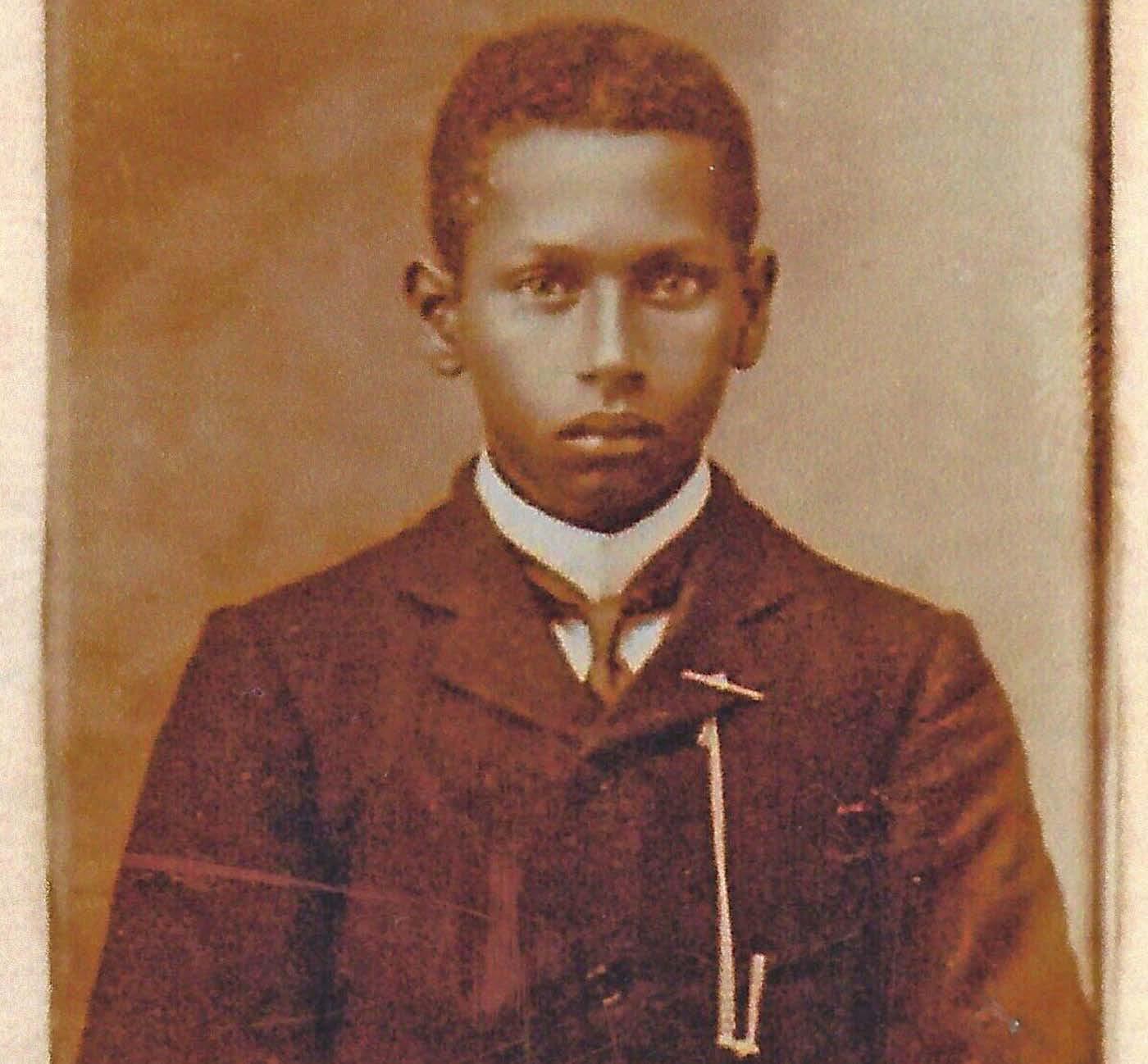
hap screenshots to my parents be Her unpre rela
My mother took the information, and began to dig. What she found stunned us. She managed to track down a living nephew of my great grandfather, Herman, to the UK.
That nephew, now in his 90s, was in London. We were unprepared for finding a living relative. But what came next was an avalanche of information which months later I’m still processing.
I’d had a few guesses about Herman and his family based on his picture, and a little knowledge and research about Guy-
Because we’d only ever had one image of Herman our entire lives, and now could see him as a fresh faced young man with a full head of hair — very different from the balding man in his 30s we’d only ever seen up until now. We were also sent a picture of Herman’s grandmother — one of my favourite pictures saved on my phone – a striking looking woman named Caroline Chesney. Caroline is my three times great grandmother. My dad’s, grandfather’s, grandmother.
We’ve since learned that Caroline was born in 1832, two years before the end of slavery and emancipation in 1834. Chesney is the name of a slave plantation which once existed in Guyana, owned by Scotsman, James Chesney. Chesney village exists to this day.
As a mixed heritage person, tracing my genealogy has been a complex, and moving experience, writes Richard Sudan
In 1819, 13 years before the birth of Caroline, slaves owned by heirs of James Chesney had been registered by another Scotsman, William Munro.
Scotland is often missing from conversations about slavery, but was heavily involved in the trade as Alexander Scott, Assistant Curator at the International Slavery Museum in Liverpool, explained to The Voice: “The biggest slave owner in Guyana was John Gladstone. It’s estimated that he received the biggest compensation payout of any individual, from any colony for the loss of his enslaved property
“John Gladstone was the father of William Ewart Gladstone, the [Liberal] prime minister of Britain.
“Scotland’s direct involvement in transatlantic slavery is becoming more and more recognised at least in academic circles and I think the political climate.”
Scott added: “I know from people who work in this field that family history is important for everybody but is of acute importance for people of Afri-

can heritage and who have descended from enslaved people.
“One of the tools of enslavement and colonisation was to deface people’s African heritage, their names, their history. The importance is the attempt — and often successful attempt — to rediscover an erased heritage.”
My family had also been given a picture of the man that Caroline had married, a Portuguese labourer from Madeira — Louis De Mendonca.
Louis Demendonca was one of the names that had shown up on my screen, some months previously when looking for my great grandfather, Herman Demendonca.
For me, finding new information about family roots is less like stumbling across an oasis and more like a cup of salt. It doesn’t quench your thirst, but creates a thirst for more answers. Because new questions are raised.
We also learned a little more about the family that Caroline had gone on to have with Louis De Mendonca. Louis had accumulated enough wealth in
his lifetime — through the sale of rum and other commodities — to pass down to the children he’d had with Caroline, to then be passed down to subsequent generations, leading to a living relative in the UK. But I wanted more information about Caroline, born Chesney, before becoming De Mendonca after marriage.
slaves in Guyana had been born free. What were their African names? My search took me to the National Archives to scour the records to see if Caroline was listed in the slave registers.

What I found was a list of slaves who would have changed hands between slave owners the Chesneys and the Munros registered to the heirs of William
TREASURED IMAGES: Far left, a young Herman De Mendonca – the new picture of him as a young teen was like receiving a piece of priceless treasure as we’d only ever had one of him, inset, as a balding man in his 30s; above, slave records owned by heirs of William Munro
on her and those that came before her is hard, people trying to trace their African roots in the slavery period should be encouraged and not demotivated. I hadn’t found Caroline’s name — yet — but I did find many more leads to follow up.
With each year more records are becoming available online, which is what helped my own initial search.
Dr Wanda Wyporska, former chief executive at the Society of Genealogists (SoG) and a historian, now head of Black Equity Organisation (BEO), explained why searching your family roots is both possible and important for those of African origin.
like to think about the healing aspect of it. What does it mean to find your relatives, but also we need to do this in the psychological safety of our own community.
“Despite the fact we are looking at some horrific records, we are honouring our ancestors. Our ancestors didn’t get to tell their history, shape their history. Even bringing their names to life, saying their names, does give us a sense of completion.”
I realised that the only reason we had been able to trace Caroline was because she had married a Portuguese man. And I’d had the name De Mendonca to search. I knew nothing of her own family.
Had she been born enslaved? Who were her parents and where had they been born? Were they also named Chesney after the Scottish slave owner? Many
Munro. I saw charts recording itineraries, the ‘gains and losses’ of human beings, but not Caroline’s name itself.
It’s possible I had looked at the names of Caroline’s parents, who would certainly have been born as slaves, without realising it.
Caroline was born at the tail end of slavery in Guyana. And although finding information
“The first step is saying to our communities that there are records — we can’t promise you there’s going to be records for every family — but I think a lot of us just assume that there’s nothing there. One of the most depressing things, but that is interesting in genealogical terms, is that property and possessions are always recorded. And unfortunately we were those properties and possessions. There are records of us. If you look at slave owner compensation records and counterclaims, it’s possible to find names.”
Dr Wyporska, who is organising a conference on Black genealogy to be held in November by SoG and BEO, added: “People would like to think how to do it if they could do it. People would
Completion is how I feel, although the journey is not over, having found some leads about my grandmother’s father, Herman, and his grandmother, Caroline who came from a slave family, from the Chesney plantation. I feel a lot of things, having learned a few new details about the people I came from, but mostly at this point, just gratitude. Thankful for my life.
Grateful to all of my ancestors but especially those who walked difficult paths in the Caribbean. We have a tendency to think of slavery as a long time ago and Africa as a far away place. But in my family I’ve realised that both are just a few people back, and not much further Rediscovering our past, and honouring the names of those who lived so that we might have our own place might be one of the most important journeys we ever embark on.
Finding new information about family roots is less like stumbling across an oasis and more like a cup of saltTRIUMPH AND LOSS: Richard Sudan says his family’s story is ‘beautifully complex’
 By Veron Graham
By Veron Graham
THE NEXT time you see a crowd of Black men and women scaling the hilly and mountain heights somewhere in the UK countryside, you may well be witnessing the latest exploits of eBony Hikers.
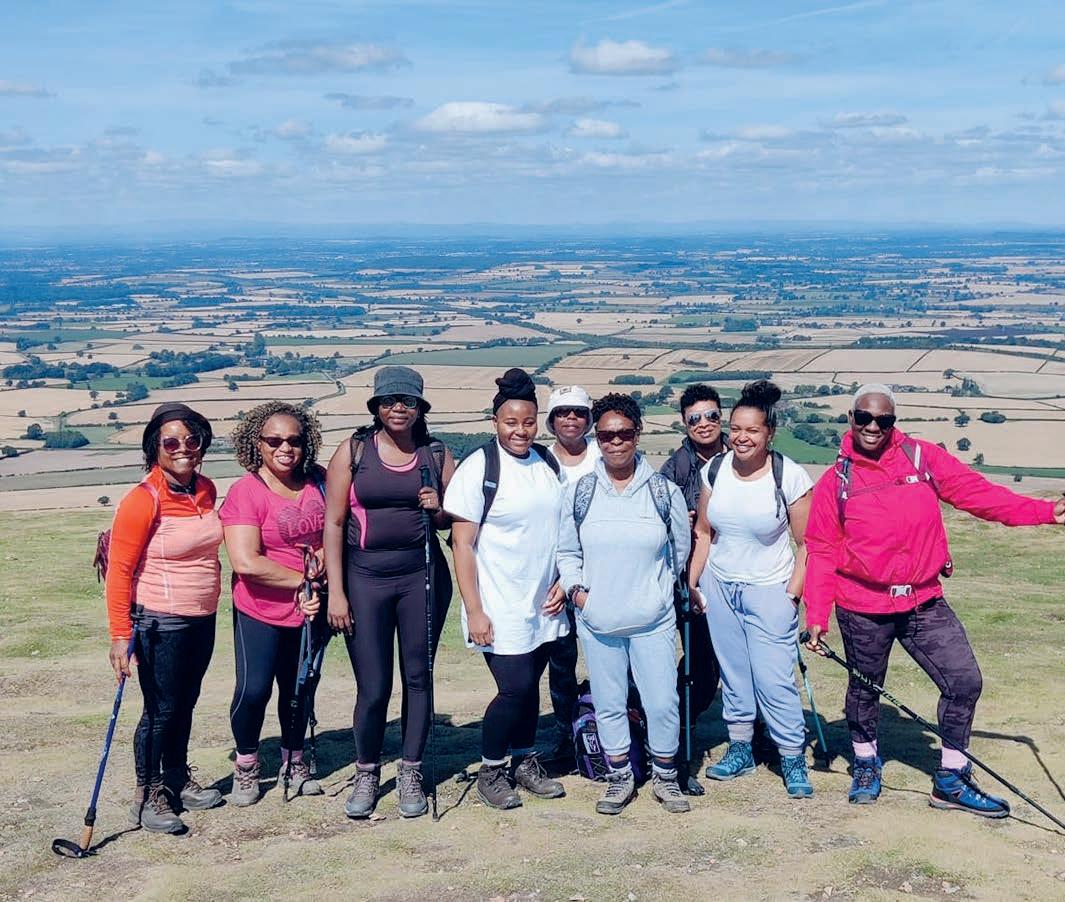
The online-based group is inspiring, encouraging and supporting Black communities who are interested in exploring the outdoors through walking and hiking to do just that.
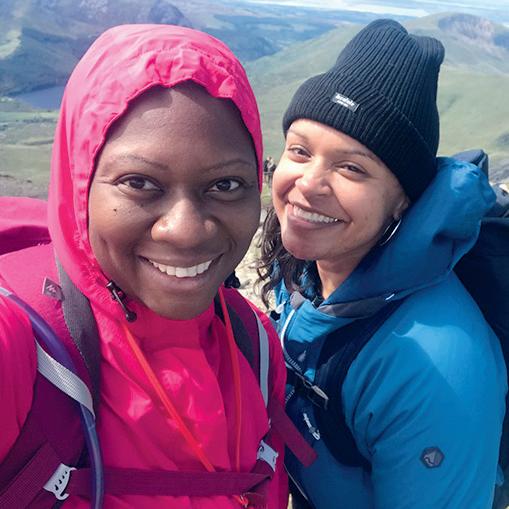
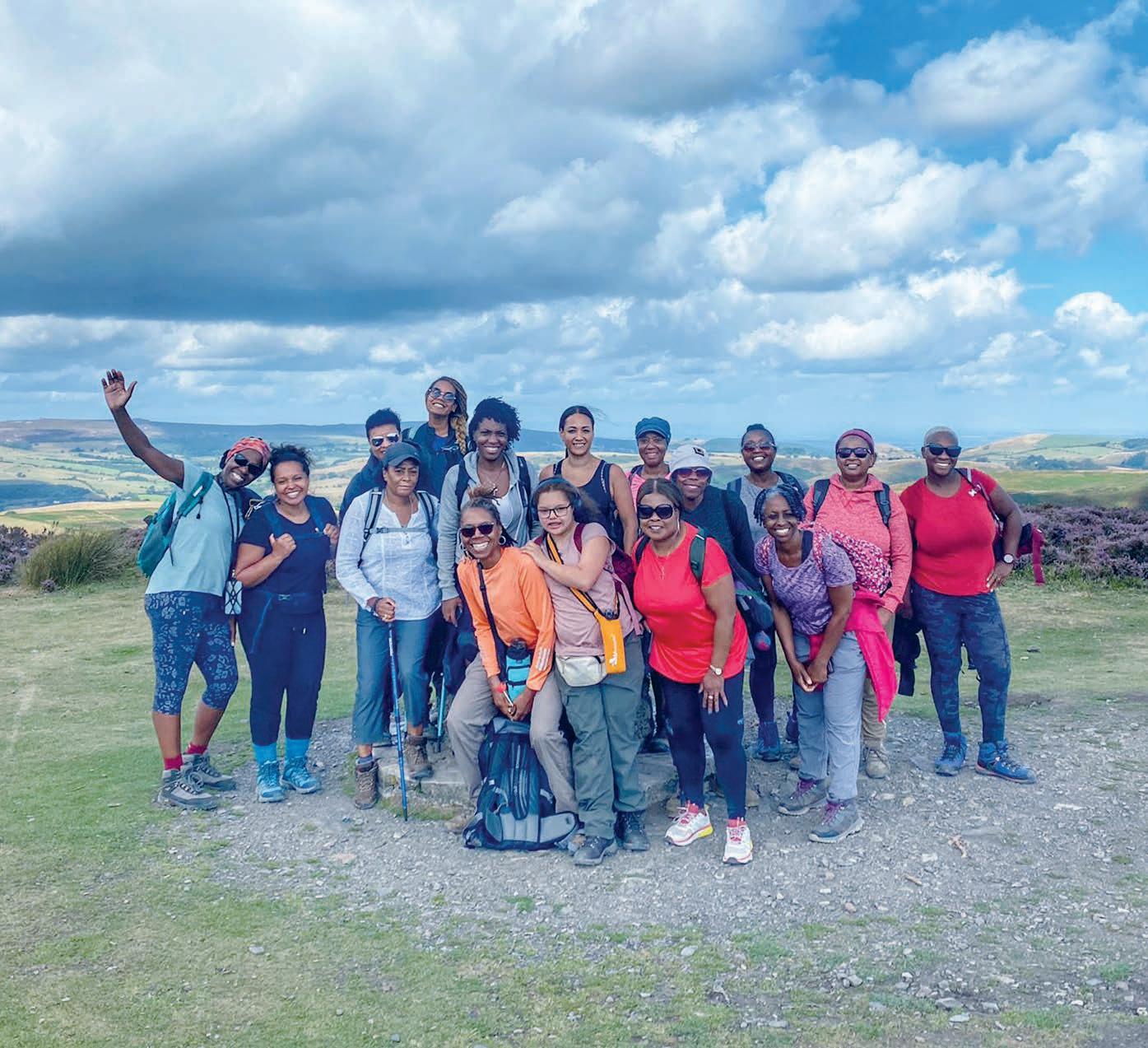
The group was launched by Ingrid Davey from Wolverhampton in 2020 and, soon after, Paula Hemmings and Dominique DeLeon accepted her invitation to join her on a walk. The Birmingham-born duo then abandoned their own ad hoc group and transformed Ingrid’s into eBony Hikers, a CIC with improved online presence and membership strategy.
Paula told The Voice: “We met quite a few people who wanted to go on hikes, but there were very few that were West Midlands-based or were focused on non-Whites.
“This was important because a lot of us in eBony Hikers are professionals, working in places where we have to code-switch: change the way we speak and almost translate things before we say it for colleagues who are from a different culture.
“We almost have to make ourselves a little smaller, but here you’re free to talk how you talk, wear your hair how you want and just feel at home.
“That is something that’s missing, which we don’t always feel is missing until you’re around other Black people who aren’t family and friends and yet you feel at home with them. With Ingrid having to take a step back for personal reasons, we were able to help out and move things forward.”

Dominique added: “eBony Hikers allows us to connect on an emotional level because we’re constantly supporting one another while we’re walking and outside of our comfort zone.
“It’s about normalising our presence in those areas, and through eBony Hikers we’ve created a community that also

demonstrated the need for that community. The presence of regular attendees on our hikes shows us that something is missing and has been for a long time.”
The duo said they questioned why, in middle-age, some still hadn’t visited the myriad of open spaces not far from the urban areas of greater Birmingham most live in.
The pandemic made many more reassess their values, what was important to them, their working lives and treatment by employers; also how disposable many were made to feel.
“It was essentially like forced mindfulness,” said Dominique, 35, a cognitive behavioural therapist for children and young people. “With time to think and reflect, some people’s priorities began to shift.”
eBony Hikers holds regular hikes of various lengths in Birmingham each month to “normalise walking that focuses on our area,” said Paula, 43, who mixes running an online beauty store with working in logistics.
The group also journeys further afield to the likes of the Peak District, Malvern Hills, Epping Forest and even Scotland – all advertised on its Facebook, Instagram and Eventbrite accounts.
the Peak District, Malvern any potential barriers to new-

TAKE A WALK ON THE WILD SIDE: Members of the eBony Hikers group, which includes Paula Hemmings and Dominque DeLeon, inset left, take well-earned breaks to show off the beauty of the English countryside – while keeping themselves fit make new friends, and guarantee they have the time of their lives!
The first hike being free and pay-as-you-go options, the duo is working to remove any potential barriers to new attendees joining.
They have also added attendance at a minimum of four social activities per annum to members.
Paula concluded: “There’s a to be very fit to be in a hiking group, but some walks are
Paula concluded: “There’s a false conception that you have to be very fit to be in a hiking group, but some walks are on the flat and only a few miles long and are at a moderate pace.”
You’re free to talk how you talk, wear your hair how you want, and feel at home
AS THE weather warms, Midlanders have been encouraged to get active and enjoy sustainable methods of travel, with new research finding its local authorities have been among the UK’s best for delivering and promoting cycling, wheeling and walking schemes.
ocals will benefit from more safe cycling and walking routes following the award of £12.6 million from government agency Active Travel England, which was marked by a visit from Transport Minister Jesse Norman to Coventry’s Binley Cycleway to meet residents already benefitting from new cycling infrastructure, including Eve Risk.
Eve, 50, who returned to cycling during lockdown, is hoping to see more people, especially from Black communities, take to the pedals in greater numbers. The London-born drama teacher and youth mentor, now living in the Binley area, is taking advantage of the new cycleways near her home.
“The new cycleways are fantastic. Families can cycle into town together and it’s safe. You’re not in fear of
ARTS STUDENTS from Birmingham City University will unveil a groundbreaking sculpture that is becoming the talk of the town.
Canaan Brown, 22, has been taken aback by the positive public response since the recent unveiling of the sculpture called Black British History is British History, which he co-designed and created under the mentorship of established sculptor Luke Perry and stands tall on the canal side, adjacent to All Saints Park, Winson Green, Birmingham.
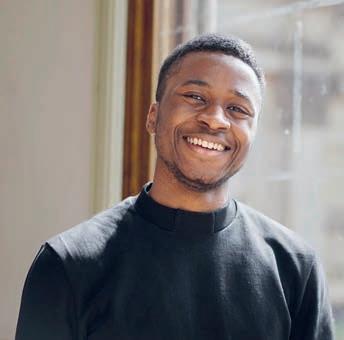
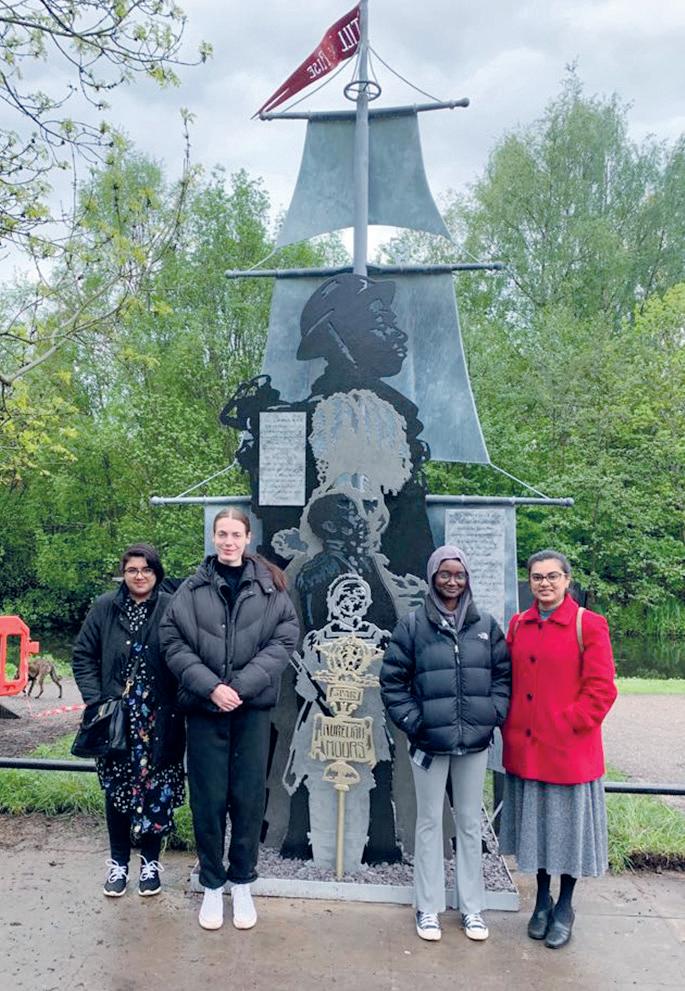
Canaan, inset, told The Voice: “I was really excited (ahead of

the launch). It was my first time showing my work as a public monument. The unveiling ceremony was amazing, and it was great to see the public’s engage ment with the sculpture.”
Designed to enable everyone in the Second City to identify with it in some way, the main feature of History is British His tory is a ship sym bolising the SS Windrush, with sails bear ing its name
and represent the near-1,800 years that waterways were the sole method of travel to the UK where communities of Black people grew in ports as sailors settled in Britain.
Several figures adorn the rear of the sculpture. A bus conductor, in a nod to the myriad of transport companies post-war era arrivals from the Caribbean worked for.
A female figure cradling an infant to represent NHS workers, in-
cluding paediatric specialists and care, education, and excellence in this profession.
There is also a symbol for the future: a schoolboy sitting on an upended sign for Marshall Street, which was visited by Malcolm X in nearby Smethwick in 1965.
“We put out a call for emerging, not established artists, to invest in local talent, to give them something to develop their careers here,” said Dawn Carr, director of Operations at Legacy West Midlands, the locally-based charitable incorporated organisation, who commissioned the piece.
being hit or run over, and there’s a pathway that is designed exactly for you. It’s a great way to keep the city moving.”
Eve was a keen cyclist before, but the new development has re-invigorated her interest. “Wherever I get an opportunity, I like to get on my bike, not to commute as I work farther away, but particularly on the weekends, for about 10 miles each time.”
Responding to the question why Black people typically steer away from sustainable travel, Eve added: “I really don’t know why that is, particularly women of my age. Maybe it’s fear of falling over. I grew up in Hackney riding a Chopper!
“Travel was harder then, so if we couldn’t drive, we got on a bike. It’s a great form of exercise.
“During lockdown, cycling became like my therapy –like some of my friends.”
From next March, further projects are set to be funded, including safe cycle routes on Wolverhampton Ring Road, around Keresley and the city centre in Coventry and in Walsall.




















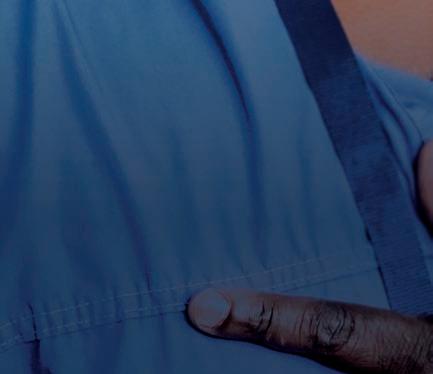











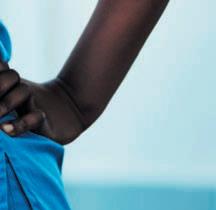








































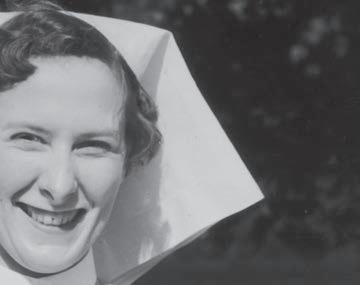



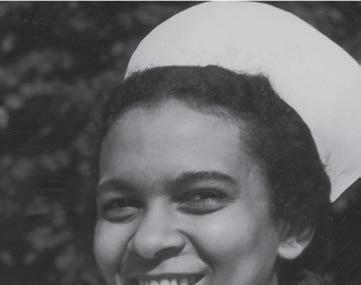



HC: I’m a nurse by background and I’m a Group chief nursing officer of the Northern Care Alliance. It’s an acute provider Foundation Trust. Employing 20,000 people and delivering services to populations within the Greater Manchester area. It comprises four hospitals, community services, social services, school nursing, podiatry, dentistry. And it’s one of the biggest trusts in the country.
As someone who is a nurse and of Caribbean descent what does the Windrush generations’ contribution mean to you?
My journey began through my love for nursing. I was born in Trinidad and I grew up in Trinidad, and at the age of 21, I left Trinidad to come to the UK to train as a nurse.
I feel incredibly proud of the Windrush and what it has provided to the NHS and, and indirectly to the world because of us being world leaders in health and research. I myself am not of the Windrush generation.
But my grandmother, back in Trinidad, was a nurse and a midwife, and she had colleagues who came to the UK. What I saw growing up, were her colleagues coming back from the UK visiting and hearing their stories which weren’t that brilliant.
And whilst my grandmother’s career blossomed and flourished in Trinidad, theirs hadn’t done as they thought, but she gave them the support and strength.
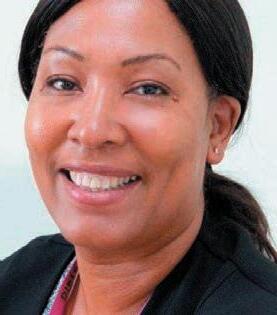

How did you get into the field of nursing and midwifery?
MJ: I went to school in Jamaica and went to one of the top performing schools in the sciences. So I had a real licence to be a scientist from when I was very young. My brother is a dental surgeon and he was the sibling that I was close to. My mum wanted me to become a doctor, but I was still deciding what I wanted to do so she put me into Teachers College.
My brother at the time had come back from Russia studying dentistry. So you suggested I should go to Cuba to study medicine, but then I came to the UK. And the plan was for me to go to medical school, but I ended up doing nursing and midwifery.
Now, I am on secondment in my directors role, but my substantive role is a Deputy Chief Nurse in south-west London.
Through your work, how do you eradicate racial inequality affecting Black people?
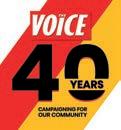
MJ: The disproportionate and poor outcomes that you have, especially with Black mothers, it’s bigger than what I saw because we’re working in a system that is structurally and institutionally racist - discrimination is at the heart of it.
But what I do in my role, having been a mother myself, and I’ve had, even though I am a clinical leader and have been exposed to poor experience, and potentially could have been a statistic if I was not informed in navigating my state.
The work that I do, especially with the Society of African and Caribbean midwives, it’s about how I’m able to empower support, educate those midwives that when they are providing care directly to women who look like them, they are feeling in a space where they can escalate concerns, they can advocate and then we also create forum, where we have Black mothers in conversation with Black midwives.
How did your journey into nursing begin?
AW: I came from Trinidad and trained nursing there. I came to the UK in the 90s to further my career as it were, because there were limited opportunities to progress in Trinidad. I came here to do what I would be to start nursing and then become a midwife because I had to be passionate for it.

I had all of my children in Trinidad and when I had my second pregnancy, it was difficult. I was a teacher at the time, and I went into hospital and this midwife looked after me and I thought, “Oh, this is amazing” this is what I want to do. But I had to do nursing first. So I did my last thing. I left teaching and became a nurse, and then decided to migrate here to my current profession.
As someone who is a nurse and of Caribbean descent what does the Windrush generations’ contribution mean to you?
I just feel it’s absolutely amazing. For me, I feel very privileged to be able to be in this position, which is when I was the most senior internationally educated national. I am from the Caribbean, where the Windrush was started from. So I feel very, very privileged to be able to have achieved what I have, but also to be a beacon for others.
I work closely with the renewable majority Chief Nursing network, and again we have achieved nurses from all over the world. But in that group, I am the only one that has come from the Caribbean that has been internationally educated for some of the others who have been educated here.
We asked three top NHS professionals about their journey to the health service, what they do, and how they are promoting equality.
ANEW street mural to celebrate inspirational Black heritage blood donors has been unveiled.
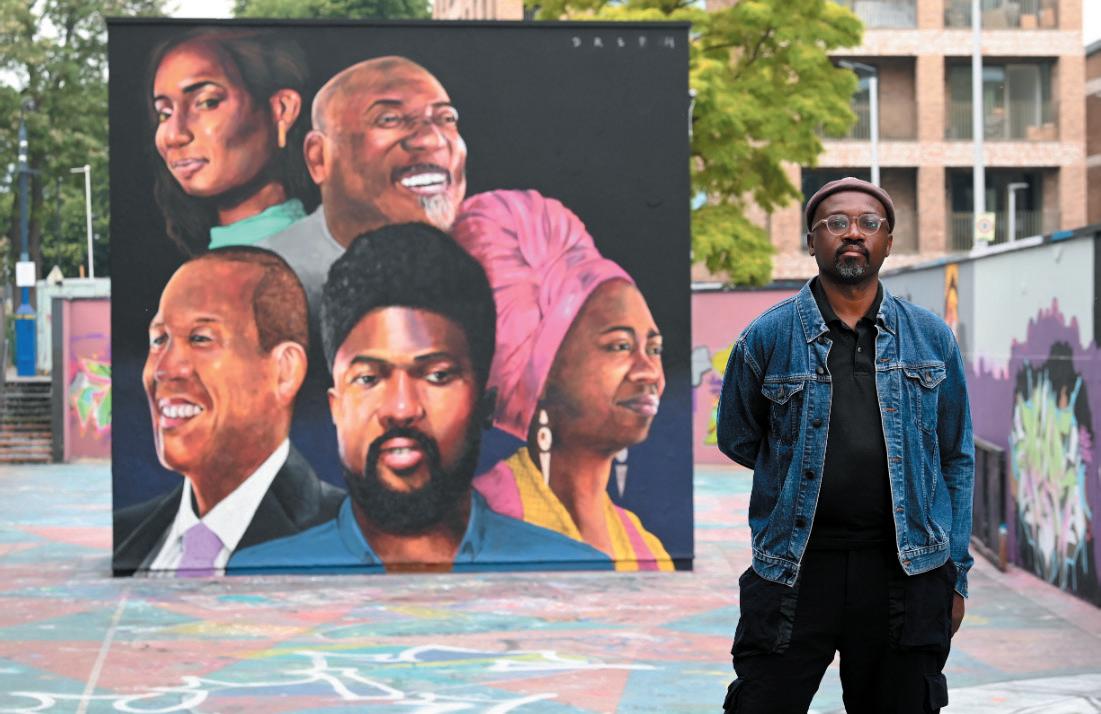
The 20ft piece titled Giving Type’ is located at South London’s Stockwell Hall of Fame.
The unveiling was commissioned by NHS Blood Transplant NHSBT as part of National Blood Week to honour some of the UK’s most inspirational Black heritage blood donors.
The mural coincides with a new NHSBT campaign for members of the Black community to come forward to donate their blood to support those with sickle cell.
Sickle cell is most common in people of African or Caribbean heritage and re uires treatment with ethically-matched blood
for the best possible outcomes.
The aim is to recruit 12,000 more donors of Black heritage by 202 . Street artist, Nee uaye Dreph’ Dsane said “Everyone in the Black community knows someone with sickle cell. It’s a very real and important issue that touches so many lives right here at home in the UK.
“I am grateful and humbled to have met these five incredible human beings who regularly give their blood to help patients with sickle cell, and I hope that this art will inspire more generous souls to come forward and save lives.”
The mural comes as NHS Blood and Transplant announces that record numbers of peo-
ple of Black heritage are now saving lives by giving blood.
However, more are urgently needed to meet the growing demand for ethnically matched blood for sickle cell patients.
Sickle cell is the fastest growing genetic blood disorder in the UK, and it disproportionately affects people of African or Caribbean heritage.
The artwork is one part of NHS Blood and Transplant’s new Giving Type’ campaign, which aims to empower communities to come together to change the narrative around sickle cell through the act of giving blood which can save up to three lives with every donation.
The Giving Types’ depicted within the mural tell the stories of real people who are helping sickle cell patients from the
Black community by regularly donating their blood.
“I know I have a rare blood type and I feel blessed to be able to make a real difference to my community so easily by giving blood,” said Samantha Awuku from London, whose image features within the mural.
“My little sister has sickle cell and knowing that my blood will be used to help others like her gives me the drive to keep donating. It’s so much easier than people realise.”
More than half of Black heritage blood donors have the blood type needed by sickle cell patients compared with just percent of the general population.
Naim
Akhtar, ConsultantHaematologist and Lead in Donor Medicine for NHS Blood and Transplant, said, “Many sickle cell patients need regular blood transfusions to prevent life-threatening complications, but currently we are only able to provide ethnically matched blood for around half of the hospital re uests leaving other sickle cell patients at risk of developing serious reactions to non-ethnically matched blood.
“While we are delighted to celebrate members of the Black community who regularly step forward to give lifesaving blood, demand is increasing rapidly and we urgently need more people of Black heritage to come forward.”

Currently, NHS Blood and Transplant is only able to provide matched blood for just over half of the hospital re-
uests other patients need to be treated with O Negative, the universal blood type.
Being treated with O Negative rather than the correct blood type is clinically safe but could mean, long term, patients are more likely to develop antibodies. This puts them at risk of complications and makes it even harder to find blood they can receive.
NHS Blood and Transplant has 2 permanent donor centres in towns and cities. To find your nearest centre and become a blood donor, download the NHS Give Blood app or go to www.blood.co.uk. Blood donation is safe, easy and fast donation takes around ten minutes and donors are usually in and out of the donation centre within the hour.
“DISCRIMINATION IN the NHS is radical and it is still there. The NHS is definitely not doing enough”, Dr Sakinat Baiyewu commented.

The head of health wellbeing at the Caribbean and African Health Network CAHN told The oice that the Black patient experience was often still a negative one.
“Despite the fact that we have had this racism issue for donkey’s years, we are still in the same position. There are so many issues that talking about them would take forever. The NHS has got to a stage where it needs to be decolonised.”
Dr anessa Apea, NHS consultant physician and honorary senior lecturer at ueen Mary University of London,
said that the issues had been known for decades but the large and unwieldy structure of the NHS - Britain’s biggest employer - made progress frustratingly slow.
“The NHS and its structures are very much built for the majority and not the minority”, she said.
“In terms of structure, staffing and policy, it does not always meet the needs of the minority. There are clear disparities in the e ualities that we see. What’s important is that this isn’t anything new. It’s been going on, and been reported, for years, decades.”
These comments from experts working at grassroots level in healthcare indicate that the NHS has been failing Black people for years and still is.
overty, discrimination, stereotyping and systemic racism mean Black people experience worse health and mental health outcomes and have a lower level of trust in health and care services.
The parliamentary Women and E uality committee published a stinging report on Black maternal health in April 202 , detailing the “glaring and persistent disparities outcomes for women depending on their ethnicity.”

The official stats speak for themselves. Black British mothers are five times more likely than White mothers to die during pregnancy or within the first six weeks after childbirth, according to the NHS Race and Health Observatory.
Women from all Black and minority ethnic groups are at greater risk than their White counterparts of having their pregnancies result in preterm birth, stillbirth, neonatal death, or a baby born with low birth weight. Racism is at the root, experts say.
Black children are ten times more likely to be referred to children’s mental health services via social services than White children, and Black Africans and Black Caribbeans are over eight times more likely to be subjected to Community Treatment Orders, and four times more likely to be detained under the Mental Health Act 19 .
At the height of the pandemic, African men were four times more likely to die from CO ID-19. A whopping
percent of Black people aged between 1 - feel healthcare professionals discriminate against them.
According to Black E uity Organisation “In spite of their stellar contribution to the health of others, Black people have failed in all aspects of their own care. The hard fact is, the healthcare experiences of Black people and White people in Britain are worlds apart.”
etula Guiseppi, from Surrey, describes her last two inpatient stays as “really terrible.”
Following abdominal surgery at her local hospital, the Royal Surrey County Hospital in Guildford, in 201 , she awoke in pain in the ward.
She says the nurses ignored her, insisting that the pain relief she had been given while in post-op recovery should have lasted.’ She was eventually seen by the duty doctor who was appalled because Ms Guiseppi had been asking for pain relief for two hours.
Guiseppi, who is of Trinidian origin, told The oice “The nurses on the ward were Filipino. I don’t know whether they have this conception of Black people not feeling pain or being problematic, but I wasn’t problematic, I was just in pain but they had no empathy at all.
“It was a terrible experience and it marred everything. In my previous inpatient stays I had people from Africa and the Caribbean looking after me. With the Filipino and Indian nurses you get that post-
colonial look where they look at you as a person of African ancestry and they see you as someone inferior, as someone who cannot exhibit pain because you don’t feel anything.
ou’re not as human as others. Those particular nurses had no empathy. In all the times I’ve been in a hospital as a patient, this was the worst experience I’ve ever had. It was really, really bad.”
Guiseppi’s had a similar experience at the same hospital last year when a nurse left her in pain while discharging two patients and making their beds before giving Ms Guiseppi pain relief.
Black mothers also often feel unsafe, are ignored and disbelieved, subject to racism and coercion by caregivers, not given a proper choice or the means to give true informed consent, and are regularly dehumanised and disproportionately affected by structural barriers to care, according to pregnancy and childbirth charity Birthrights whose Systemic Racism Not Broken Bones report published just last year.
The report followed an inuiry into racial injustice in the maternity services which found that racism, not broken bodies, is at the root of many ine uities in maternity outcomes and experiences.
The NHS is not doing enough, according to Dr Baiyewu, because although no one can be held accountable for systemic racism, she is angered by the lack of action when a culprit has been identified but isn’t penalised “Nobody has ever been held accountable, nobody has ever been sanctioned, nobody has ever lost their job.
“If honest actions are taken, if honest disciplinary action is taken, and it’s one of the easiest things to tackle, it will be a deterrent.”
She cited the example of a nurse that has faced disciplinary panels 1 times over repeated racist abuse towards a Black or ethnic minority
patient, but got away repeatedly with just verbal warnings.
“Nothing was being done, over the same, not different, issues.
“That nurse knows that she will walk away from the panels and she continues doing the same thing.” Dr Baiyewu called for culprits to lose their jobs and to be named and shamed in public.

For Dr Apea, racial disparities present for years and left unaddressed become embedded and entrenched.
She says patients will express concerns about not feeling heard, seen and valued very much within healthcare.
Barriers to accessing care, whether language or structural, can lead patients to experience biases when they access care.
It is important to recognise the stigma and discrimination that patients experience, which can happen at many different levels, she says.
eople may not always be listened to about pain and what they’re experiencing. Underlying all of this in a healthcare consultation is a power dynamic.
She said “There is this concept of epistemic injustice in
which as the clinician you hold the power and when someone is telling you something you can dictate whether you believe it or not and act on it or not.
“So some patients have spoken to me about the double D experience, feeling sometimes dismissed and disappointed in consultations, so not feeling
ences within healthcare.”
She added “Biases are played out both consciously and unconsciously but the difficulty is as it’s played out, it’s an active thing in that person’s life experience. So whether it is intentional or not it still can have a negative impact on the patient and that’s the key thing.”
these features overlap and intersect and that can affect someone’s lived experience and their life chances.
“So in health we really have to see people in their entirety and what could be affecting someone’s lived experience and also their opportunity to have good health, and we need to be able to respond to that as a health system.”
Dr Apea acknowledges the ongoing work by the NHS to challenge, raise awareness and make change but says there’s still a long way to go “A lot more that needs to be done, it needs to be on a bigger scale and it needs to be sustained.
entirety, not just clinical trials but surveys, interviews and also that they are involved in hospital leadership as well.
She wants to see more Black people on patient panels and on local health wellbeing boards.
Asked if she was optimistic, Dr Baiyewu said “The last time I asked, I was told the NHS was doing something about it. I’m not confident.”
However, she added “I’m looking forward to a future where the next generation will not be stereotyped or stigmatised and be safe in the hands of the NHS and will have the confidence to seek health interventions.”
rofessor Bola Owolabi, NHS director of health ine ualities, said “The NHS is working hard to ensure that everyone, regardless of their race, receives high- uality care and there have been improvements in the experiences of Black patients particularly for illnesses such as Sickle Cell Disorder.
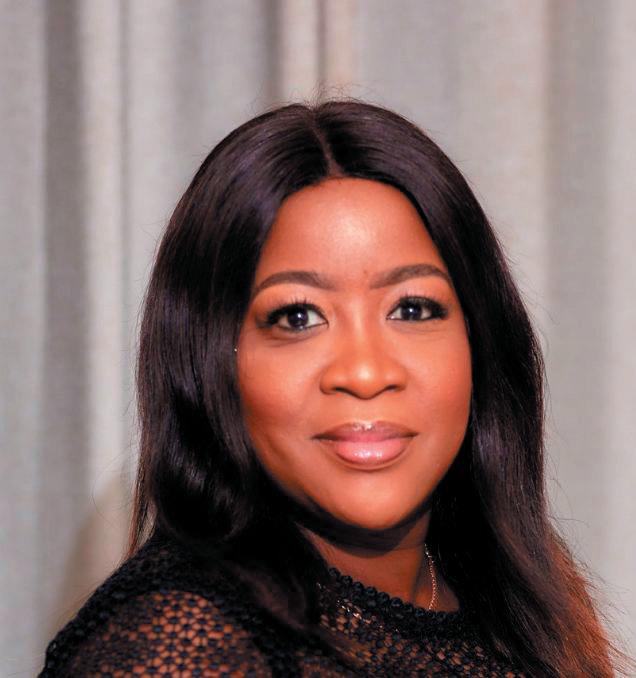
“But we know there is still work to be done on improving the outcomes and experiences for Black patients on a range of physical and mental health issues which is why we are working with organisations such as CAHN, the Race E uality Foundation and community and faith leaders to ensure Black patients’ voices, wishes and concerns are heard in the design and delivery of health services.
listened to so your needs are not met and not responded to.
“That can be a particular concern of many people I’ve talked to. It’s important because there are many people that have had positive experiences but when you do speak to racially minoritised communities and you speak to Black people specifically, many will describe unacceptable experi-
Dr Apea, who works in sexual health and HI , says services need cultural humility, to treat people as individuals, and understand the concept of intersectionality, recognising that each individual has a number of systems that play in themselves, race, class, education, physical ability, learning ability, sexuality - all of which play in an individual and all
“Things happening now need to be there and even better in five, ten years time. There isn’t enough. We need more. We need it to be scaled up. We need more investment and we need it to be consistent.”
She also called for more data and research including intentional recording of ethnicity and looking at outcomes across the ethnicity and at people’s intersections, making sure that Black people are included in research in all its
Blood disorder characterised by episodes of extreme pain known as sickle cell crisis. It is a genetic lifelong condition mostly affecting people of black African and Caribbean background. There are around 15,000 sufferers in the UK. Support: https://www.sicklecellsociety.org/
Black people are three times more likely to develop Type 2 diabetes than white people, leading to loss of sight, limbs, etc.
Support: https://www.diabetes.org.uk/how_we_help/local_support_groups
Black and Asian people in England have to wait longer for a cancer diagnosis than white people, with some forced to wait an extra six weeks, www.cancerblackcare.co.uk (website under development), phone 020 8961 4151, email info@cancerblackcare.org.uk
“We have also developed robust e uity and e uality guidance for NHS systems to follow which promotes safer, more personalised care for patients.
-“Racism has no place in our workforce and we are working hard on culture and leadership, so that everyone from board to ward and reception to consulting room, promotes inclusive and anti-racist ways of working which benefits both patients and colleagues.”

Caribbean & African Health Network https: //www.cahn.org.uk/
For Women
East London - https://www.amplifyinglives.com/ - Alive amplifies the lived experiences of east London communities. Dr Vanessa Apea serves and interviews Black women about their health journeys Blackwomenswellness.com - launched later this year. Option to register to stay connected. Pregnancy & childbirth - https://www.birthrights.org.uk/ https www.fivexmore.com
For Men https://prostatecanceruk.org/prostateinformation-and-support/get-support
In terms of structure, staffing and policy, it does not always meet the needs of the minority. There are clear disparities in the equalities that we see.






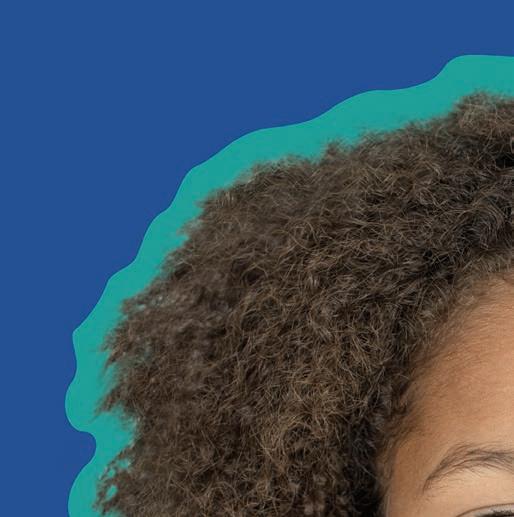


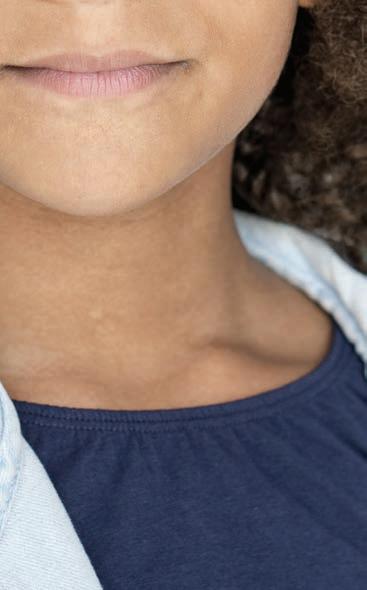




THE JOURNE of the Commonwealth citizens in the Caribbean who answered the call from the United Kingdom for them with their needed skills and labour to rebuild a devastated nation after World War 2 is well documented.
Much is known about the Windrush generations, named after the HMT Empire Windrush, originally a German passenger liner given to the UK as war reparation in 19 and converted to a troopship renamed Empire Windrush in 19 .
The British troopship Empire Windrush anchored at Tilbury Docks, Essex, on 22 June 19 carrying hundreds of passengers from the Caribbean, answering The Call to Order.
A Call to Order is a term used by Mavis Wilson to explain why many people came
to the United Kingdom.
Mavis was a ualified teacher in Jamaica. Happy in her profession and surrounded by family, friends and living a healthy lifestyle in beautiful rural settings.
In 19 , four years into her teaching career Mavis decided to join siblings and friends who answered the call for help to rebuild the services in the United Kingdom after a savage world war.
“ es, we felt it our duty to come and help. I told my parents who were not pleased”
Mavis continued. “How can you go to be a nurse when you hate the sight of blood”, Mavis laughed recalling her mother’s response.
Two months after completing the Invitation Application Form which was accepted within days, Mavis’s bags were packed for life into the un-
known.
lanes had replaced ships by 19 and before reaching the United Kingdom Mavis encountered snow when her BOAC flight had to wait two days in Newfoundland, Canada due to bad weather.
“We got a real shock, we were dressed in cotton clothes, freezing and given mash potatoes to eat”, Mavis recalled. Finally, arriving in the United Kingdom and linking up with her two family memberscousins Ivy and Sadie, they entered nurse training in Eastbourne.
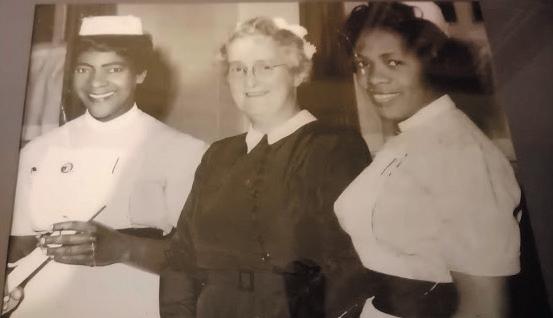
They all ualified in a couple of years and were dispersed into the NHS - Mavis as a ualified midwife, Ivy into Domciliary nursing, Sadie as an Eye Specialist assigned to Moorfield Eye Hospital.
Sixty years later, as citizens of the United Kingdom, much needs to be celebrated.

“We sacrificed much and should be recognised for rebuilding this country after World War II and putting this country back to a high standard” said Mavis.
eople from Barbados came as drivers, conductors because that was “The Call to Order from the United Kingdom”, Mavis continued.
Even women came as drivers, rare thing at that time. We were invited to come and rebuilt the country”, Mavis emphasised again.
Sadly, Ivy died in 2010, Sadie August this 2019- and Mavis, now 92 ye ars old and wheelchair bound attended Sadie’s funeral, made the 2 0 miles round trip to pay respect to her friend, who made that Call to Order over 0 years and have achieved the mission of rebuilding the United Kingdom into a place many now call home.
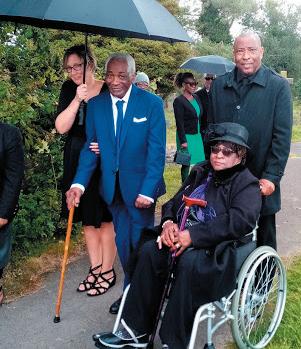

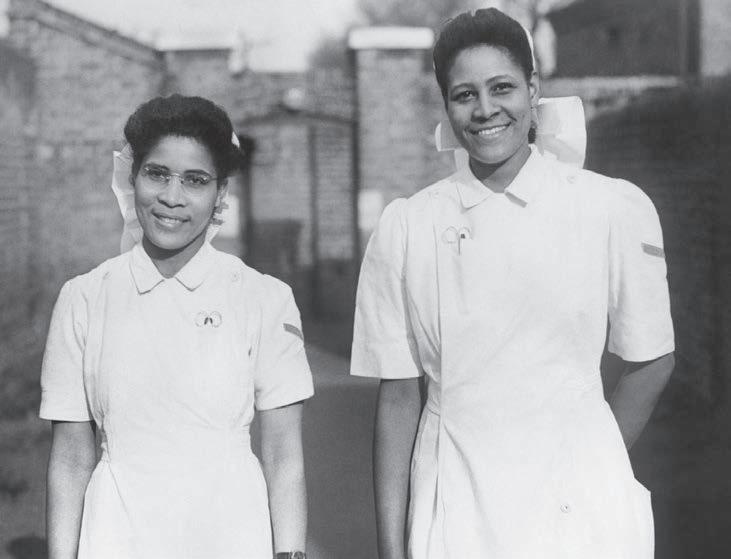

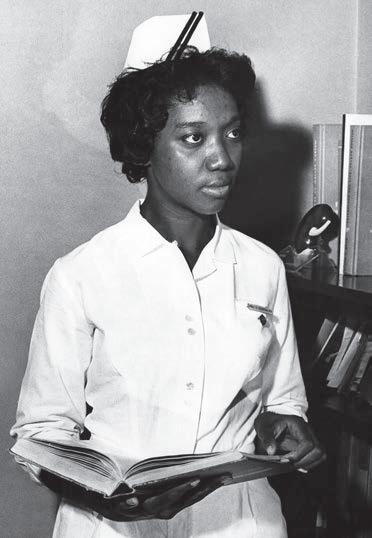

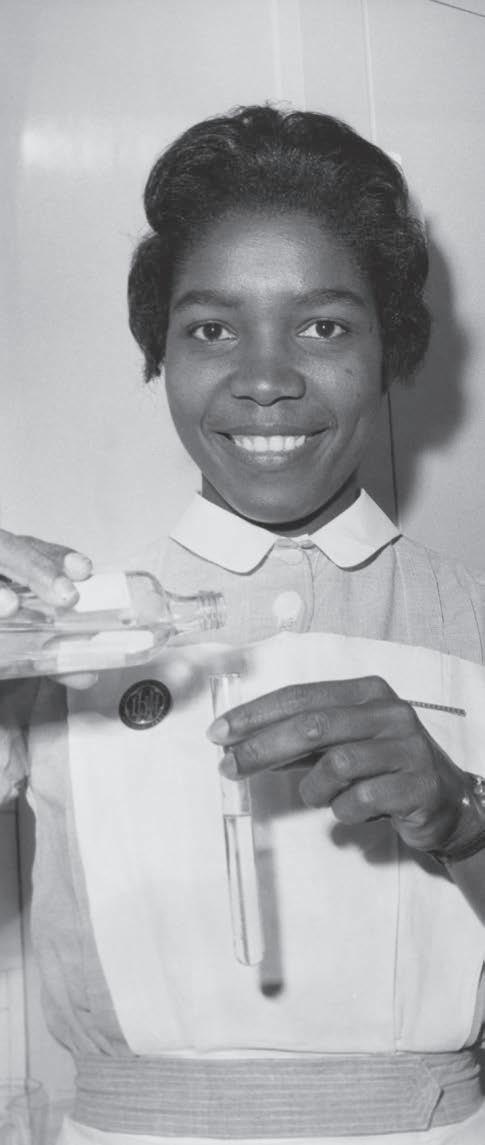
THE NHS is a national treasureand the Black community made it so.

From the first Windrush nurses who worked in the newly-created National Health Service, to the doctors and physicians, the Black community can rightly feel proud of our contribution.
While the HS is currently suffering, as demand rockets amid a decade-long decline in the share of GDP we invest, the much-loved public health service is still the envy of many countries.
WATCH: A doctor checks a patients’ pulse in 1948. (Keystone Features/Hulton Archive/Getty Images)
NEXT PATIENT:: A doctor in London, 1948 (Keystone Features)

SCRUBS: Medical professional in the north-east
HEALER: A doctor in the NHS (Getty)
CARING: Ghanaian nurse Una Leacock, in Hertford, 1960. (Fox Photos/Hulton Archive/Getty Images) Munroe of Grenada, 1945. (Planet News via Getty Images)
LEADING: A nurse checks notes (Getty)

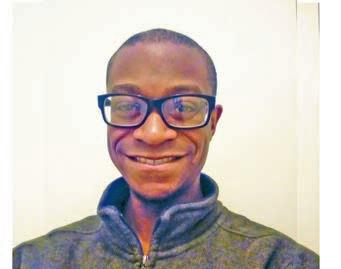
JOY BUOLAMWINI
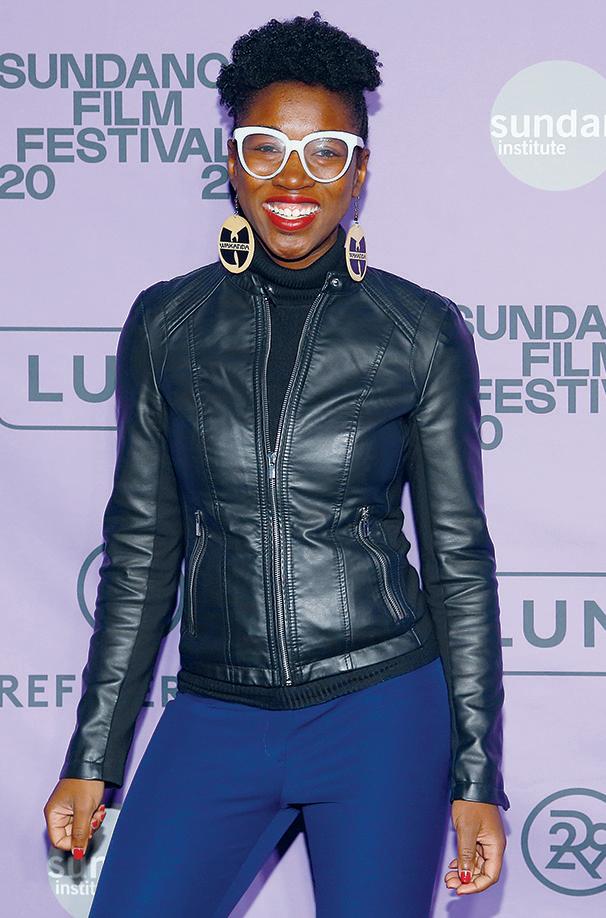
has had an interesting experience in her research on artificial intelligence (AI) facial recognition technology.
The Ghanaian-American MIT based computer scientist and digital activist, below, noticed that a lot of facial recognition technology frequently had trouble identifying Black faces to such an extent that Buolamwini famously had to put on a plain white mask for the AI software to finally respond to her face.
Buolamwini’s research illuminates a concern about the role that racism and bias has in the field of artificial intelligence.
As AI technology becomes more prominent in use across the world, the growing incidents of anti-Blackness being manifested among various AI systems dissolves the idea that technology is inherently neutral.
nancial expense to prove his innocence.
As artificial intelligence becomes increasingly integrated in areas such as health care, housing, the legal system, banking, education, policing and the military, how can we be sure that technology using artificial intelligence won’t replicate racism, antiBlackness, bias and White supremacy in a more efficient and effective way than we could ever imagine?
What are the steps that are needed to resist the manifestation of racism in this rapidly developing technology?
Artificial intelligence technology is a broad term that is used to describe machines and computers that have been designed to perform complex tasks that would normally be done by human beings.
AI technology is becoming
increasingly better at reasoning, learning, understanding language, recognising images and making independent decisions.
In recent years, there has been much controversy over the rapid expansion of AI technology with some scientists concerned that over 60 per cent of all jobs could be lost over the next 20 to 30 years to AI.
Supporters of the new technology argue that AI will usher in a new era of “progress” and “development” and say against it are Luddite, like those who opposed the technological changes of the industrial revolution.
Whatever side of the AI fence that you stand on, it is worth considering how and why instances of bias and racism have been inbuilt into a technology that in theory should be able to decode and undermine the social construct of race.
MORE BLACK DATA REQUIRED:
Current rtificial Intelligence facial recognition data puts Black people at a disadvantage as was proven in the case of Ni eer arks (photos: Getty Images)
Horrific racist episodes in volving AI technology under pin a need for Black commu nities and the diaspora to be engaged with the forms this technology takes and its effects (positive and negative) on soci eties across the world.
pin a need for Black commu
The reality is that this technology, despite its advancements, still needs to be perfected. However, there is no guarantee that AI systems will be fixed or modified in this
In 2020, Facebook’s auto mated AI placed the label of “primates” under a video featuring a Black man.
Similarly in 2015, Google’s AI generated photo app rec ommendations repeatedly lumped photos of Black peo ple alongside photos of go rillas.
In the United States, ac tivists have raised concerns over wrongful arrests that have been attributed to faulty AI facial recogni tion.
In 2020, Facebook’s auto video featuring a Black man. tivists have raised concerns US police using image AI technology falsely

This was the nightmare that Nijeer Parks had to go through in 2019 when US police using image AI technology falsely identified Parks as a criminal behind sev eral crimes.
It took Parks over a year and great fi
per pro of their creators. de compa cre ra
Current AI systems are programmed by humans and often reflect the biases and prejudices of their creators.
Buolamwini describes this as “pale male data” which describes the composition of the majority of AI developers in the largest software companies, who are predominantly White and male which creates a lot of space for racialised biases to manifest in software development.

it be surprising that AI technology would be racist?
Some systems have drawn from a wide variety of sources about Black people from racist forums to pornography in order to inform its ideas.
pins a much larger discussion about the tensions between corporate interests and community interests in the development of new technology.
At the same time, many AI learn the fab pseu doscience, propaganda informa
At the same time, many AI systems use machine learning that allows them to learn independently from human input by drawing on data and information from the internet or sample data that “trains” the AI.
Given the endless false data, negative stories, fabricated information, pseudoscience, propaganda and ideological information that exists about Black people online, should
In a world in which White supremacy and anti-Blackness is still the default, it could be argued that anything less than programming an actively antiracist model into the technology simply cannot be expected to generate unbiased outcomes.
Mutale Nkonde of the U.S. based not-for-profit organisation AI for People contends that the very philosophical foundations of AI technological development is flawed stating that “the way many of the systems are developed is only looking at pre-existing data. They’re not looking at who we want to be”.
Nkonde’s statement under-
If AI technology and computer science engagement was much more widespread in underrepresented communities, particularly Black communities, would AI facial recognition technology have been developed that compares Black people to apes or puts them at risk of false imprisonment?
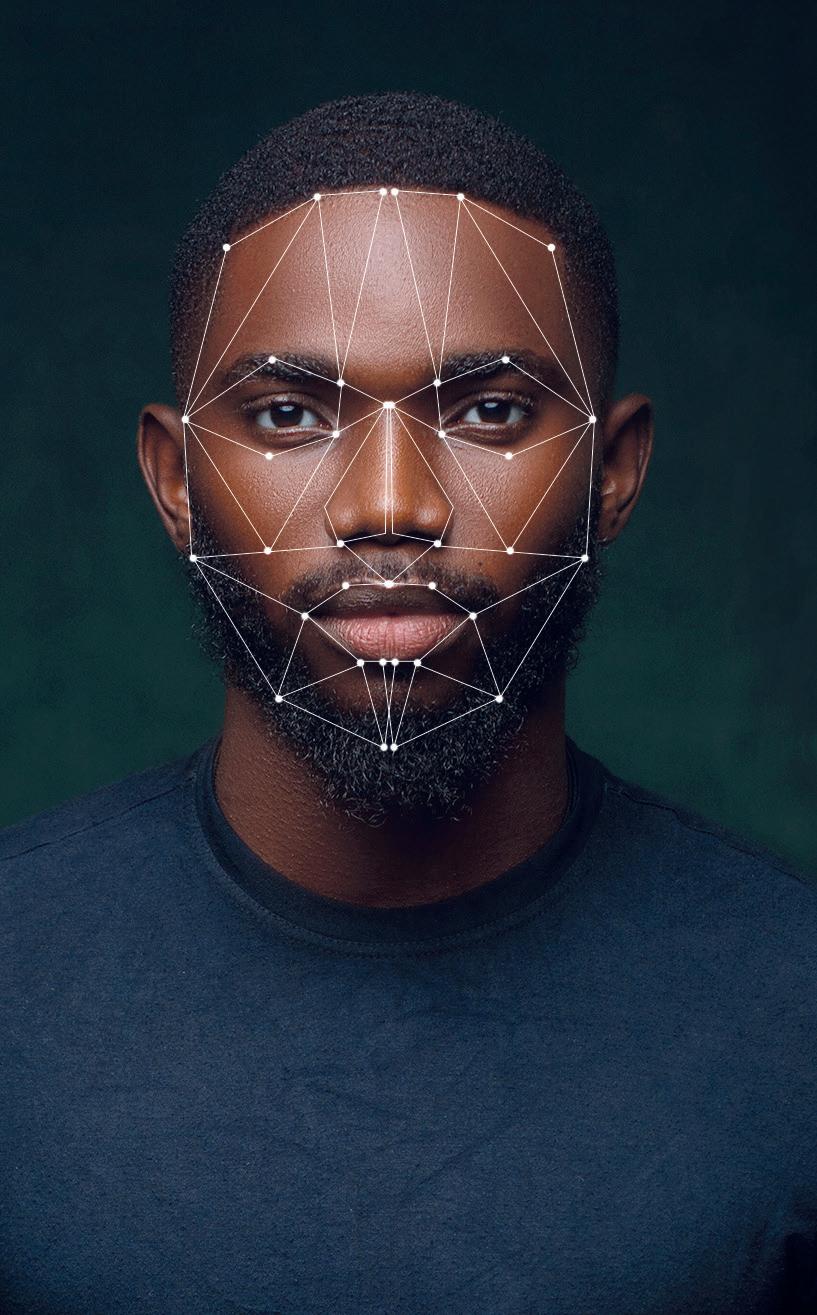
Would Black people have developed AI technology that actively discriminates against them in areas such as life insurance? The idea that these outcomes would have been inevitable regardless of who creates this AI system is delusional.
This reinforces Buola-
mwini’s argument that more diversity is needed in big tech companies. But how to achieve this will be a long process. There needs to be a drive to invest in more Black computer scientists but the political and economic will is still lacking.
AI technology has great potential but as data scientist Rumman Chowdhury asserts, at the heart of debates about this technology is a kind of “moral outsourcing” where we blame the technology but absolve the people and tech companies behind the technology.
AI could potentially enhance our lives in a number of areas that we haven’t even thought of yet. But its central problem is that its creation and deployment is driven primarily by the profit motive of tech companies and not the wellbeing of human beings.
 Lyndon Mukasa is a writer and researcher. He studied International Development at the London School of Economics.
Lyndon Mukasa is a writer and researcher. He studied International Development at the London School of Economics.























IT WAS uplifting to be part of one of the largest gatherings of Black workers in Europe recently — the TUC Black Workers Conference.
It’s a necessary space if you are a Black activist in the union movement.
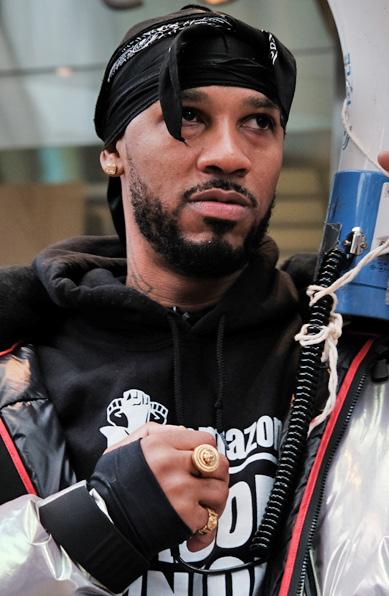
I grew up in Oxford, which meant my mum cherished her Black newspapers from London and magazines from the US.
I got to see a glimpse of Blackled politics in newspapers like The Voice, which profiled influential unionists like Bill Morris and Gloria Mills.
These larger-than-life members of the community became representatives of the world of work in my young eyes. Fast forward 20 years and I had the pleasure of giving the vote of thanks to Bill Morris at his last TUC Black Workers Conference.
I have been on the Race Relations Committee with Gloria for more than 10 years now, and we have four Black General Secretaries of TUC unions — Dr Patrick Roach (teachers union NASUWT), Ian Lawrence (National Association of Probation Officers), incoming National Education Union General Secretary, Daniel Kebede, and Maheta Molango (Professional Footballers
Association). Have we achieved the dream? Far from it. Being a Black trade unionist means not just knowing how to negotiate for your members but also testing how thick our skin is and how fixed our ‘masks’ are to our faces.
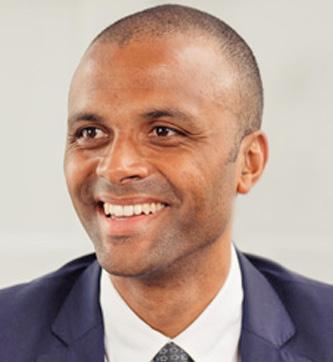

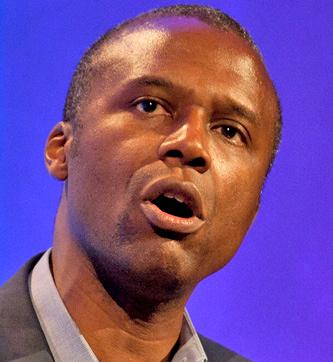
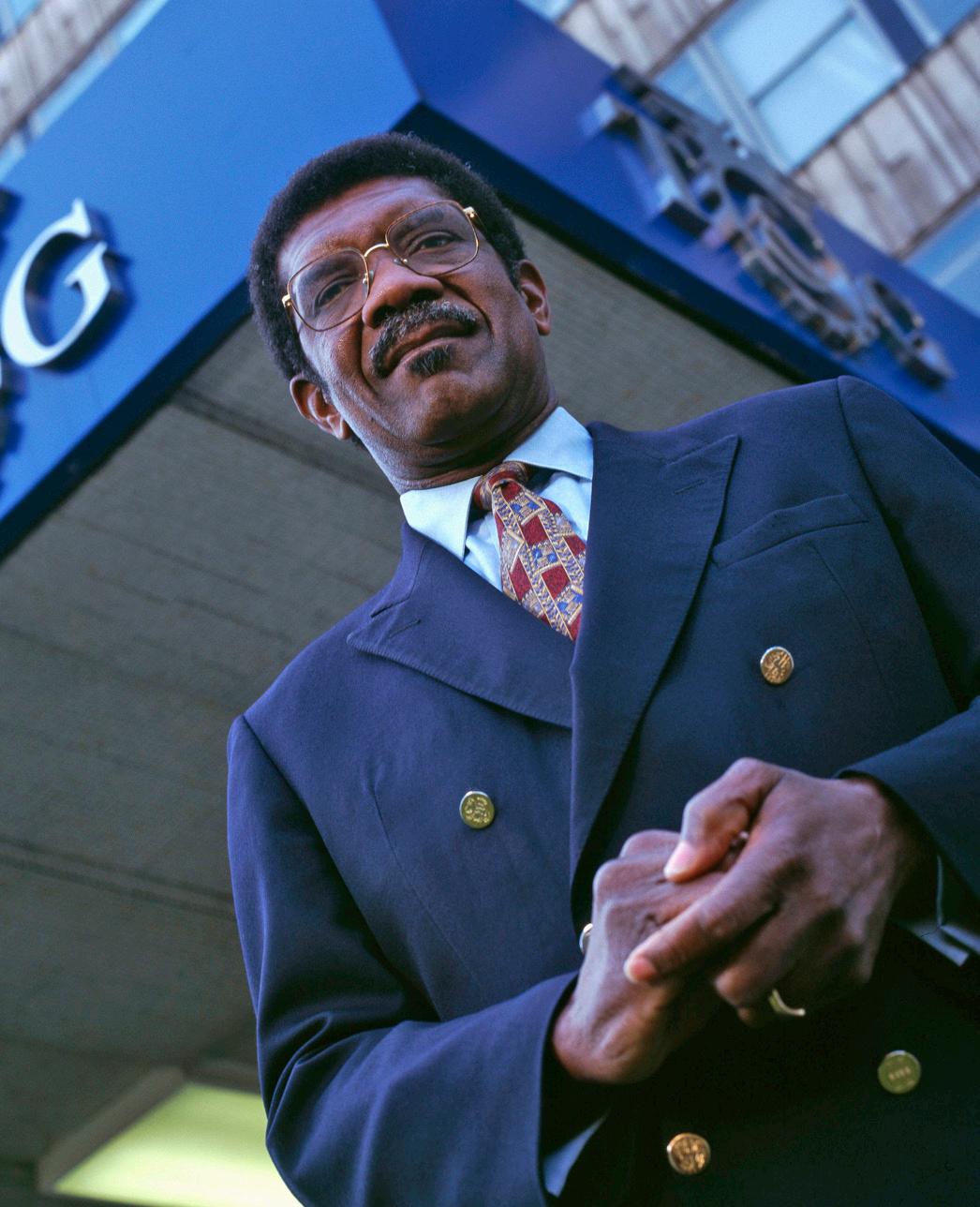
We are elected to support and protect our members, even if they have been accused of racism or ask for ‘another’ rep to support them. It means walking into many spaces where you are the only non-white face or you are the only one speaking up for Black members.
From the minute you walk through the doors of TUC Black Workers conference, many of us feel able to let go of the breath we have been holding in. We can actually breathe because we know that your fight is my fight.
The focus is about Black empowerment and community building.
Yes, racism is a huge part of our experiences as workers and Black people in Britain, however we draw strength from each other in spaces like this, which is why we call on each union to build or prepare these Black-only spaces, for us and by us.
THIS YEAR we were joined by three American brothers who have (and are) taking on Amazon.
Many of us know that the socalled ‘gig’ economy is successful due to the exploitation of workers, who try to avoid calling employees.
Often these are minority bodies, who are underpaid and overworked so that profit can be shared with the multi-billionaire owners.
However, if workers in the gig economy were paid a living wage, entitled to sick pay, sick leave and parental rights then those profits would be severely reduced (where have we seen this ‘business model’ used before?) The thing that scares
these multi-billionaires more than paying their tax bill in full is the idea trade unions may be the fight they will lose and this is why unions are banned, or strongly discouraged.
So instead of collective bargaining, individual workers are able to use the open door policy to raise issues directly.
On a panel called ‘How to beat Amazon and build a union’, the conference heard from Chris Smalls and Gerald Bryson, copresidents and co-founders, and Jordan Flowers, co-founder, of The Congress of Essential Workers (TCOEW). As we welcomed these brothers to our ‘home’, they shared
what pushed them to their limit. The pressure they experienced from Amazon management included mass ‘terminations’ and refusal to honour contractual agreements made to the workforce.
Through community organising, the TCOEW was built from the ground up and as an independent union they can campaign in ways for their members, unrestricted by ‘traditional’ ways of organising.
Recognising that there is a high proportion of young, male workers as well as those who need e ible hours, this union organises in a way that re ects the e periences of their current and potential members.
Understanding that the experiences of our cousins across the water are experiencing the same as we do here in the UK and Europe brings us even closer together. And as a part of the global majority we need these bonds more than ever.
TUC Black Workers Conference was a space that was blasted open nearly 30 years ago by the giants, whose shoulders we now stand on, but the fight is far from over
The trade union movement belongs to us too because we are the working class and we are holding this space for the next generation of Black workers to enter and continue the fight for the ne t years
The number of Black union bosses in Britain has grown but there’s still more to doINFLUENCE: Clockwise from left, Bill Morris, Dr Patrick Roach, Daniel Kebede and Maheta Molango (photos: Getty Images) PANEL: Labour activist Chris Smalls
GROWING UP as a Black mixed-race child in the 1980s, Olivia Thompson always wondered why the toys she played with and the books she read never resembled her or anyone in her family.
After becoming a parent, questions that had been on her mind as a child came flooding back during a shopping trip with her 10-year-old daughter Amira in November 2019.
“We were trying to buy a present for one of Amira’s friends,” she recalls. “We were in a toy shop, as she is obsessed with dolls. She asked me: ‘Mum, why don’t any of the dolls look like you or grandma?’
“I replied: ‘Well, unfortunately, that’s just the way it is.’ And Amira, being Amira, replied: ‘Well, it shouldn’t be that way. It needs to change.’
“She was six at the time and at such a young age she was already recognising that there was a problem. I came away from that conversation feeling so angry and upset that my little girl had asked me the same question I’d asked my mother many years earlier.”
Determined to find out why the problem was continuing, the mum-of-two from Leeds decided to investigate. What she discovered once again left her feeling frustrated and dismayed.
“I found many dolls that were being produced but they weren’t stocked in leading toy stores,” she continued.
“The other thing I found was the dolls that were produced often exaggerated Black people’s facial features. Then there were the store managers who said their clientele were mainly Caucasian, and diverse dolls didn’t represent their target market. I couldn’t believe it when they said that to me. We live in a multicultural society.”
After conducting further market research which included
Olivia Thompson’s daughter questioned why dolls didn’t look like her — so she did something about it.
By Vic Motunepolling potential customers such as the parents and carers of young children, Thompson launched Akila Dolls in August 2020 during lockdown.
The company aims to produce dolls that reflect her daughter’s African Caribbean heritage.
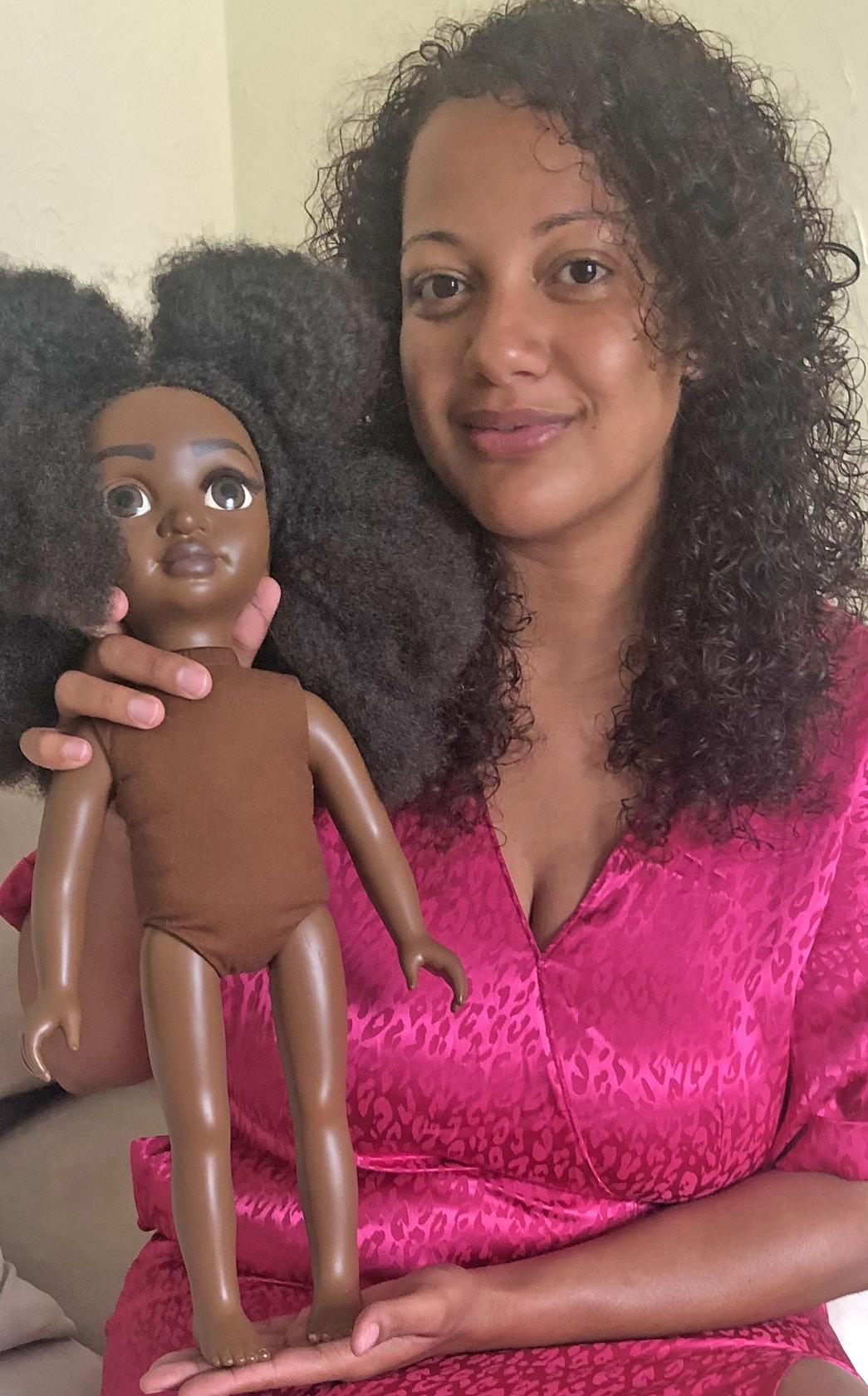
Inspired by Amira’s diagnosis of autism and attention deficit hyperactivity disorder in April 2019, the entrepreneur says she also wants Akila Dolls to represent children with disabilities.
“For me, it’s really important that every child, including my daughter, can walk into a toy store and see themselves reflected on retailers’ shelves,” she added.
Thompson launched the company with no business background. While taking care of her two young children and her parents, she enrolled in business courses run by the Prince’s Trust and the NatWest start-up programme, which helped kick-start her entrepreneurial journey.
ible” she says. “I’ve had so many independent toy shops approach me saying they can’t wait for the full range of dolls to be ready so they can start stocking them.
“I’ve had parents from different ethnicities and backgrounds tell me they want to buy Bessie because their nursery-age children have a diverse group of friends. This is the response I wanted.
“It’s not just Black people who understand why diverse dolls matter so much.”
There has also been a positive response from local businesses.
Akila Dolls recently won the ‘Luxury Doll Company of the Year 2022/2023’ award at the Yorkshire Prestige Awards, further convincing Thompson that there was a market for diverse dolls.
However, the money raised through crowdfunding can only take Akila Dolls so far.
Thompson realised that if she was to achieve her goal of ex-
new Amazon Prime show Ready, Set, StartUP.
The series shines a light on the many challenges faced by entrepreneurs in launching their businesses.
The show will chronicle the challenges of setting up a new business, and will see her competing in high-stakes challenges in each episode for a chance to win a £100,000 investment and business support to kick-start their entrepreneurial dreams.
four weeks to film the show” she recalls. “I was five-and-a-half months pregnant at that time and away from my family or any support system.
“Also, I was really poorly during my pregnancy. Often I’d be throwing up. I would be taken to hospital for the night, only to be back up at six o’clock in the morning to start work on the show. And we’d be filming for 12 to 13 hours. The producers would constantly have to remind me ‘Olivia, you’re pregnant’.
Crowdfunding was the only option she could see for getting the money needed to launch the company.
Much to her surprise, she raised £6,000, which helped her develop a website and produce a prototype doll named Bessie after Bessie Coleman, the first Black female pilot.
“The response to the Bessie doll has been absolutely incred-
panding her product range and getting the dolls into the hands of a wider audience, she would need major investment from toy companies who, as yet, have not bought into her vision.
But she could be close to getting the money she needs, thanks to a new reality show.
Thompson is one of 10 earlystage entrepreneurs from around the world who will feature in the
Thompson hopes her appearance on Ready, Set, StartUP will shine an international spotlight on Akila Dolls and open doors for investment opportunities she needs to help expand the company’s product range and reach a wider audience.
However, taking part in the show has not been without its challenges.
“I went down to London for
“But that’s how I’ve been raised by parents, you just get on with it. I also wanted to show people that women are not just caregivers or housewives.
“We are capable of being so much more and we can run successful businesses.”
Thompson won’t reveal if she
was successful in winning the £100,000 investment.
However, she is on a mission to inspire and support others who faced the same situation she was in and are thinking of starting a business.
“If I have one message for anybody — if you’ve got a vision, just go for it. When I started Akila Dolls I had no business background, no mentoring. I literally just had an idea and a concept which I shared with my mum and dad. And look where I am now!” she said
“There are resources and free courses all over the country that can offer free support and can help you with advice on business planning and cash flows.
“Don’t ever think that just because you don’t have the qualifications, funding or experience needed you can’t start a business.”
ROLE MODEL: Olivia Thompson shows off the Akila Doll which is attracting so much attentionIt’s really important that every child can walk into a toy store and see themselves reflected on retailers’ shelves
DID OU know that in the UK and United States, 0 per cent of businesses fail within their first five years? This figure is similar for Black-owned businesses.


The main reason for business failure is a lack of cashflow, and the lack of timely information to make informed decisions.
In The E-Myth Revisited by Michael Gerber, he explains that most business people are technicians’ good at what they do but know little about running a business.
They spend too much time working in’ the business and not enough time working on’ the business.
When business owners speak to me, they never ask me how to cook, do someone’s hair or how to fix a leaking pipe.
They ask me how to get more customers, build a better team. or how to improve their profits.
Whether you are a start-up or established business, all business owners should have clear goals and some kind of outline plans listing the strategies you will be using to achieve these goals.
Brad Sugars, founder of ActionCOACH, shares a formula Dreams x Goals x Learning x lans x Action DxGxLx xA . He states that if you score yourself out of 10 how good you are
How can businesses be a success when we spend more time on planning a wedding or birthday party?
at each of these, you can get a maximum of 100,000.

But even if you only score yourself five for each, it comes to only 1 , 2 .
In other words, even with average scores, the average business is seriously missing out on your potential.
Many Black people spend more time planning their wedding or birthday party than they spend time planning their business
Spending hours and hours working all the details for one day or just evening is incredible when you think of the importance of running your business.
Most say I just can’t find the time’, but we all find time for what we value.
We have just finished the first six months of the year, so it is a good time to review and re-set. All business owners would benefit from an updated uarterly plan. This can simply be in the form of a single sheet of paper.
But before writing down your
plans, here are some useful tips to get you well prepped
Review the goals you set for the business for 202 , then set new ones
If your goals are not SMART specific, measurable, achievable, resourced, and with time , then improve them and
add numerical measures so you can assess progress against each
One goal should include the profit or cash you want from your business
Look at key successes so far and areas for concern
What one thing would make the biggest change to your business?
Set a personal goal eg book a holiday, treat your family, get fitter
Work on’ your business, not just in’ the business.
If you are like most business owners, you spend too much time on operations and not enough time doing business
owners’ work.
Black business owners, like most who run mainly micro or small businesses with no or few staff, also struggle to find time to plan. As a result, you end up too involved in all the day-today activities.
It is crucial to take some time out every week to review what has happened and to ensure key actions are taken. It is even more important if six months have gone by and you are yet to review.
The process of reviewing your business is useful in its own right as it helps you to think out loud.
If you can do this with your
coach or an accountability’ partner that is even better.
I give all my clients an ActionDaily sheet to encourage them to plan each day based on their uarterly plans, not just stuff’ to do.
This helps them to focus on the important things for their business, not just what makes them busy.
Brian Tracey wrote the book Eat that Frog to help business owners get more of the things done today’.
This piece is based on recommendations from the book. If you would like a copy, please just email me.
REVIEWING THE SITUATION: It’s really important to take a regular look at how your business is performing and to then act accordingly to give yourself the strongest possible chance of achieving future success (photos: Getty Images)
If you would like business advice from Asari St Hill — ActionCOACH Business Coach and Founder of the Black Business Club, you can contact him at: asarist-hill@ actioncoach.com / www.actioncoach.com/asaristhill






WHEN THINKING of the world’s greatest vocalists and musicians, you can’t ignore that, for most of these incredible artists, their musical abilities derive from the church and their gospel roots –i.e. Jennifer Hudson and Luther Vandross.
With that being said, the importance of gospel music’s ability to continue to inspire the next generation is crucial for the music industry going forward. This sentiment is strongly held by married musical couple Ray (drummer) and Claudia Prince (singer), who discuss with me their love for gospel music, their work with young people and their project the ‘Gospel Revisited Project’ (GRP) which are all preserving gospel music’s legacy within the UK.
ST: When were you both introduced to music?
RP: I’ve had so many interactions with music as a child, from my mum gifting me with a small toy drum kit which I’d practice on, and being around my older brothers and their church musician friends, eventually meant that I was playing for church revival nights and conventions as a child. I also found in one of my school reports, my teacher wrote that I had ’a natural sense of rhythm’ at the age of six, showing that music has always been in my DNA.
CP: Music has been a part of my life, for as long as I can remember, as both my mum and dad sang and my dad played the guitar, so my sisters and I would also find ourselves singing away with them.
ST: So tell me more about B:music and your work with young people?
RP: So we both come from a background of teaching music in schools and that’s why B:Music (a Birminghambased charity) contacted us, as they were experiencing low participation from young people of colour on their music programmes.
Our work with the charity, involves teaching, encouraging
and mentoring 10 to 22-yearolds on how to perform gospel music. Practically, these sessions involve drum kit/hand percussion lessons, as well as group workshops and music mentoring.
Having the opportunity to mentor young people, increases positive role-modelling which is particularly important for those from diverse backgrounds, who don’t always have access to that, whilst in education.
CP: As for me, my work within schools and B:music allows me to work with young people’s voices, teaching them the dynamics that come with singing gospel music, as a solo artist or as part of a gospel choir. I get to see them flourish in something they’re passionate about, as for some students, music is what they gravitate to the most in their curriculum.
ST: Sounds like the young people really have a lot to benefit from What progress have you seen?
CP: One highlight for me was with a young man, who wasn’t attending lessons and was identified by his headteacher for being disengaged with his studies and skipping lessons but would always be in his music lessons. During our music lessons, I was able to mentor and coach him into taking his core subjects more seriously and he recommitted himself to his studies and started the path to university. Which is a big proud moment of mine!
RP: There are a lot of stories I could share, but one of the most memorable moments for me, was whilst working on a gospel choir project, a young lady in the choir would often have epileptic fits but we could see that she loved coming,
and we was adamant that she continued with us. After a number of rehearsals, she performed with the choir. A couple of years later, we bumped into her and she told
us, how she was still singing and that she became a member and later, a youth leader at a local church, which was surreal as she didn’t come from a church background.
ST t’s fair to say, that you’ve seen gospel music’s impact on the people around you, would you agree?
CP: To start with, they don’t understand the power of the songs at first but sometimes they can sense that something supernatural is taking place.
RP: We’ve also had some of our non-Christian musicians in our band, express the difference in gospel music with one band member, referring to a particular concert and the powerful songs sung feeling‘like the roof was lifting off’. So we’ve seen first-hand how gospel music impacts others.
ST: I love that and alongside your work with young people and B music, you
also have your own project ’, could you share a little bit about that ?
RP: GRP pays homage to my forefathers and the Windrush Generation. The timeless gospel hymns that we get to showcase through our band, orchestra and gifted singers offer comfort to the audience while celebrating gospel’s musical legends of the past such as Walter Hawkins, Andraé Crouch and Shirley Caesar.

And how can we find out more about your work?
RP: With GRP we have some exciting events coming up and you can stay in the loop, by following our socials: @gospelrevisitedproject on Facebook and Instagram or visit our grproject.co.uk.
I was able to mentor and coach him into taking core lessons more seriously

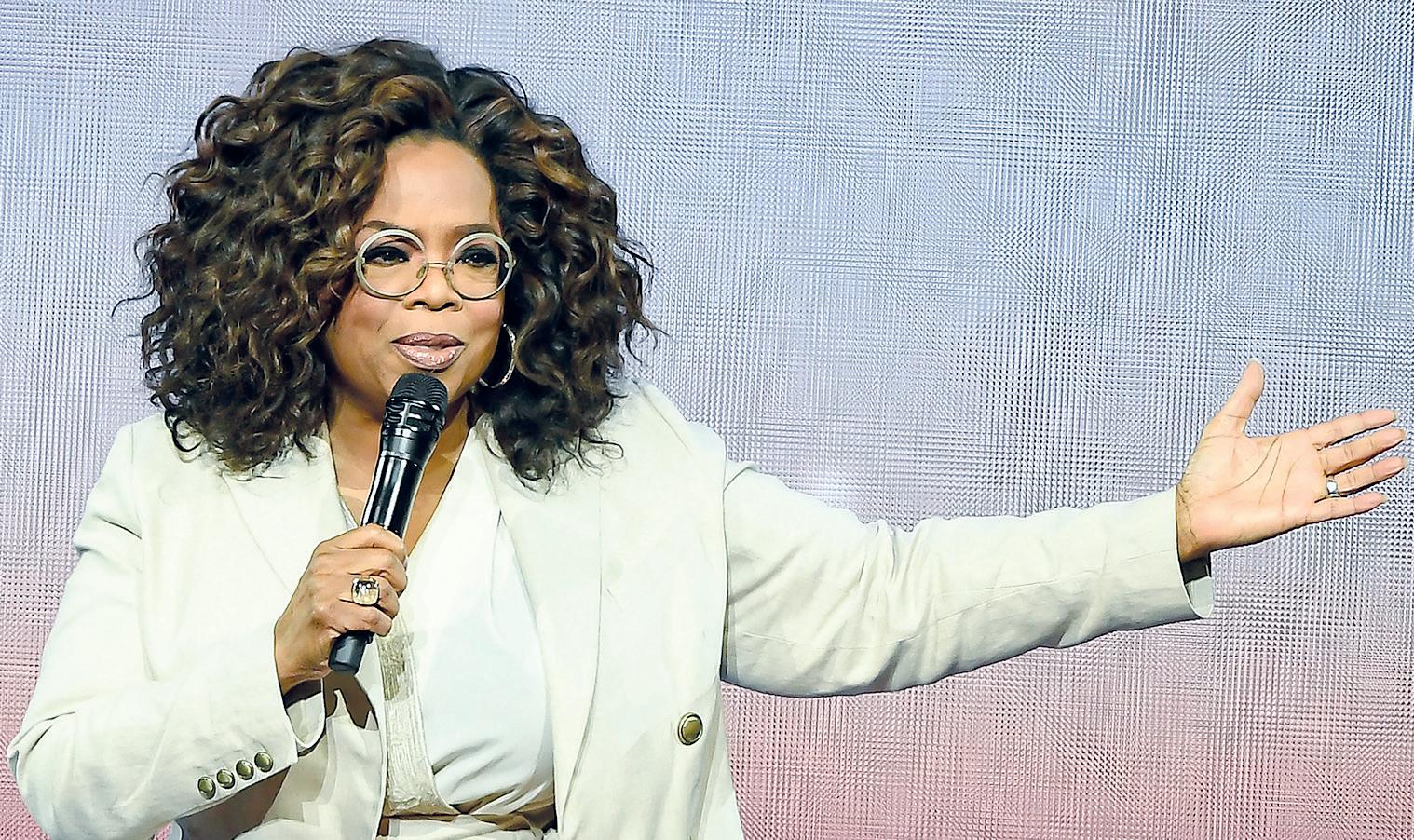
LIFE CAN be brutal and uncertain; we naturally seek comfort and reassurance.
Thankfully, we can find solace in the timeless wisdom of scripture, the profound insights of influential figures, and the inspiring stories of individuals who have persevered.
Drawing from ancient text
Isaiah 41:10, contemporary voice of Oprah Winfrey’s What I Know For Sure, Proverbs 3:5, and Michelle Obama’s Becoming, we will explore how these powerful sources of guidance and personal narratives can instil hope and remind us that everything is going to be alright.
Throughout history, wisdom has provided strength and guidance in times of uncertainty.
Isaiah 41:10 reminds us: “Do not fear, for I am with you; do not be dismayed, for I am your God. I will strengthen you and help you; I will uphold you with my righteous right hand.”
This verse offers comfort by assuring us that we are never alone, for a divine presence strengthens and supports us during challenging times.
Now you may find it difficult to embrace because you think the Bible is old and irrelevant to you, I am coming to your block!
Winfrey, renowned for her wisdom and insight, shares profound reflections in What I know For Sure
She encourages us to embrace change, seeing it as an opportunity for growth and transformation.
Life’s challenges, she suggests, hold valuable lessons that can shape us into stronger individuals.
By shifting our perspective and viewing adversity as a catalyst for positive change, we find the inner strength to overcome obstacles and trust that everything will be alright.
Inner strength you may ask, because you feel totally spent, let me encourage you, you are a survivor you are going to make it!
In the journey of life, there are moments when things go wrong, and it is during these
times that we may find ourselves losing hope.
The adversities, disappointments, and challenges we face can shake our faith and make it difficult to see a way forward.
It is essential to acknowledge and understand these experiences, as they are an inherent part of the human condition.
One of the things that go wrong in our lives is unexpected setbacks.
in our careers, relationships, or personal endeavours.
be disheartening, leav ing us feeling defeated and questioning our abilities. The fear of failure can seep into our minds, casting doubts on our potential for success.
When faced with these setbacks, it is natural to feel dis couraged and lose hope.

Loss and grief also have a profound impact on our lives. The death of a loved one, the end of a significant relationship, or the loss of a job can be emotionally devastating.
The weight of these experiences can be overwhelming, leaving us feeling empty, lost, and without direction. In such moments, it is common to lose
concerns can take a toll on our mental and emotional wellbeing. It can feel as though we are trapped in a cycle of despair, unable to find a way out. The constant struggle can erode our hope, leaving us feeling trapped in a never-ending spiral.
Moreover, the harsh realities of injustice and inequality in the world can also make us lose
erbs 3:5, we find guidance on navigating uncertainty: “Trust in the Lord with all your heart and lean not on your own understanding.”
This verse emphasises the importance of surrendering control and trusting in someone outside of ourselves.
INSPIRING OTHERS WITH THEIR STRENGTH: Both Oprah Winfrey and Michelle Obama have penned their stories, making for utterly captivating – and inspiring – reads (photos: Getty Images)

encountered, Obama’s story inspires us to persevere, stay true to ourselves, and trust that things will eventually fall into place.
Her journey reminds us that we possess the strength to transform adversity into growth, reinforcing the belief that everything will be alright.
persistence
Witnessing the suffering of others, the persistence of systemic issues, and the lack of progress can be disheartening.
It may seem as though the world is filled with despair, leading to a loss of faith in the possibility of positive change.
I know this is not always easy after all; it was trusting in others that got us into a mess in the first place.
In times of uncertainty, our instinct may be to rely solely on our own limited understanding or seek immediate answers.
Now you might say that is Michelle, the wife of the once most powerful man in the world.
Remember at a point she was just Michelle - that no one knew except her family but she kept dreaming and kept fighting and kept going high when life and circumstances pushed her low.
This can be your story, too.
However, it is important to remember that even in the darkest of moments; there is always
remember
It is in these very moments of despair that we have the opportunity for growth, resilience, and self-discovery. Adversity can be a catalyst for transformation and a reminder of our inherent strength and resilience.
In Prov-
However, Proverbs teaches us to have faith and believe in a greater plan, even when we cannot see it. Trusting in this plan brings us peace in the midst of uncertainty.
Michelle Obama’s memoir, Becoming, illuminates the power of resilience in the face of uncertainty.
Through her personal stories, she shares her journey of facing and overcoming challenges, doubts, and setbacks.
Despite the uncertainties she
In times of uncertainty, we can find solace and hope in the teachings of scripture, Isaiah 41:10 assures us of the divine presence that provides strength and support.
Proverbs 3:5 encourages us to trust in a higher plan. Jeremiah 29:11-14 puts it this way: “For I know the plans I have for you... plans to give you hope and a future.” With unwavering faith, we can trust that everything will be alright.





























































































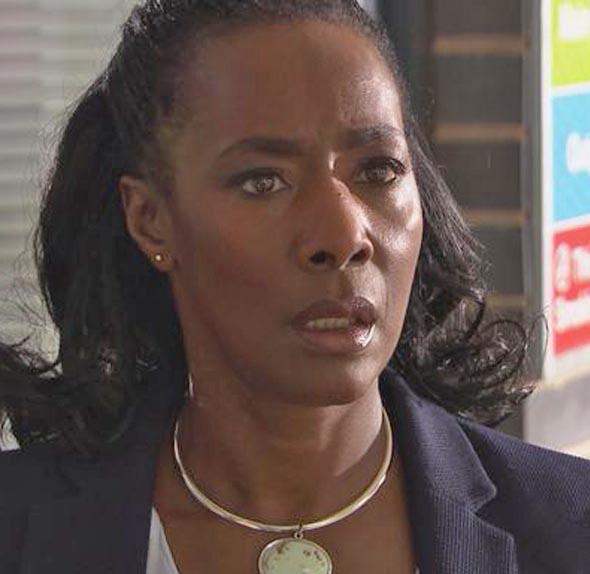
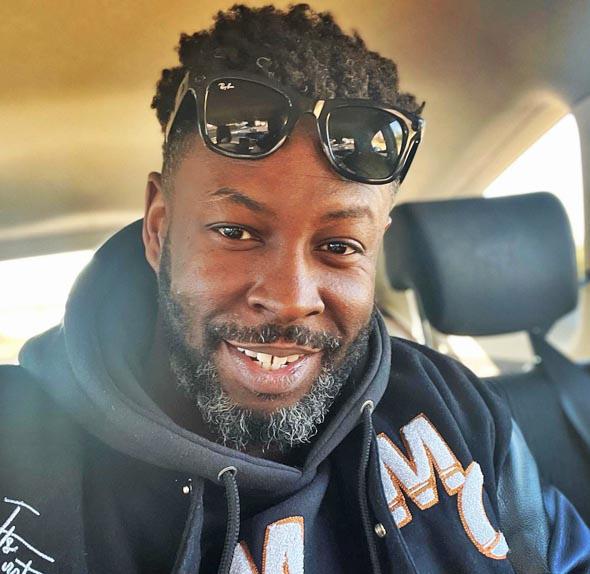 It’s the annual Black Unity Bike Ride, are you ready? p48
Dexter brings Black Tech Day to south London p46
It’s all happening in 2023 for Jacqueline Boatswain p47
It’s the annual Black Unity Bike Ride, are you ready? p48
Dexter brings Black Tech Day to south London p46
It’s all happening in 2023 for Jacqueline Boatswain p47
 Jerome Conway
Jerome Conway
THIRTY YEARS have passed since Sally Baffour, a former interior architect, had her life miraculously transformed when she adopted twins after seeing an advert in The Voice in 1992.
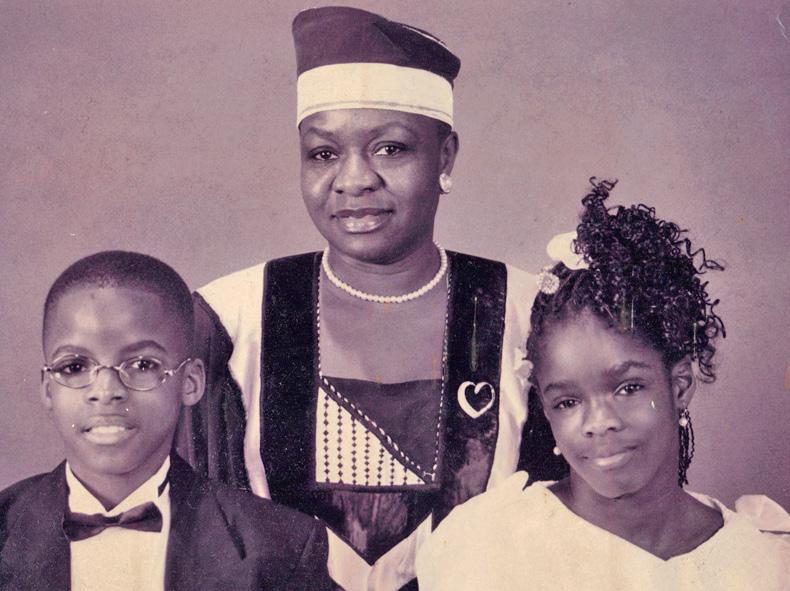
Sally’s path to adoption began after facing difficulties carrying pregnancies to full term due to e tensive fibroids
Although she underwent a successful operation, her chances of giving birth dwindled to a mere five per cent aking her mother’s advice to heart, Sally made the life-altering decision to pursue adoption.
At the time, Sally’s thenhusband worked at The Voice newspaper, which served as the primary media outlet for local authorities seeking black prospective adopters.
When he came across an advert in The Voice for twins aged two and a half, he immediately expressed their interest. However, they were informed that the advert had to run for the duration of the campaign, and a panel would ultimately decide on the
best match from the responding families.
Sally vividly recalls the exhilarating news that they had been chosen to become the twins’ parents.
When her husband sent across a picture of the twins featured in the advert, she was struck by how much they resembled members of her own family.
The positive impact of adoption on their lives has driven Sally to share the joys of adoption with other families.
he re ects on the invaluable support she received from her family the Church social workers, medical professionals, and the Caribbean friends she made, all of whom contributed to preserving the twins cultural background.
Arata and Lawei, the twins, are now thriving in their respective careers in finance and music which can be attributed to the loving home provided by their mother. Fond childhood memories include visits from their renowned aunt, Maya Angelou,
a celebrated writer, poet and civil rights activist, who shared her love of reading with them. Initially unsure about their new surroundings the twins uickly adapted and embraced their new family thanks to aya s sense of fun and their maternal grandmother’s guidance.
The invaluable support continued, even during Sally’s divorce, when she suddenly became a single parent; her mother advised her, “As a strong African woman, you have to ‘tie your loincloth’ and stand!”, encouraging Sally not to crumble but to remain strong for the sake of the children.
Sally’s faith has also been a source of strength as a single mother eekly unday services provided her with a mirror through which she could gauge her children’s social development. She credits God for being with her every step of the way, and the support and kindness of her priests, who consistently advocated for her and the children, played an invaluable role.
The twins felt so comfortable
with their priests that they often sought their advice and guidance. A strong support system was crucial for Sally and her children, and in turn, her children now offer her the love and support she needs.
After leaving her job to become a full-time mother, Sally discovered her passion for the world of adoption and became an Adoption Consultant. In this role, she advised and made recommendations to the Department of Health on best practices from a Black perspective, focusing on the placement needs of Black frican and Caribbean children in the UK. She also provided extensive guid-

ance on the therapeutic and parenting needs of Black children in care and established several self-help forums for carers in London.
With over 20 years of experience on adoption panels for multiple local authorities and adoption agencies, Sally has become a well respected figure in the field
The twins now proudly identify with both Caribbean and African heritage, embracing their early adoption as something to celebrate and openly discuss. They have always felt loved and fully integrated into Sally’s family.
On being adopted, Arata explains: “I have had a life open to incredible possibilities, enabling me to make informed choices to enhance and advance myself.
he solid background of the progressive African family we were adopted into taught us our history and instilled pride in our identity s a Black woman living in Britain, it has given me a complete sense of belonging, which became
the springboard from which I am able to jump to greater heights.”
Arata may adopt later on in life and urges families like hers to step forward and provide safe homes that offer a sense of belonging, security, and pride in one’s heritage.
Lawei, too, said he is embraced by a large and accepting family.
He said: “This has not only reinforced pride in our identity as Black frican Caribbeans but it has also given my sister and I a real sense of belonging that has enabled us to excel in our lives.”
He believes every child should have the opportunity to find stability, pursue their passions, and follow their dreams, appealing to potential adoptive parents to come forward and provide a child with care, a home and a loving family like they now have.
For more information on adoption, please visit www.youcanadopt.co.uk/blackadopters
STAYING STRONG: Sally says invaluable support continued, even during her divorce; far right, Sally with Arata, who is thriving in her career
“It has given my sister and I a real sense of belonging that has enabled us to excel”SO PROUD: Sally Baffour with twins Arata and Lawei
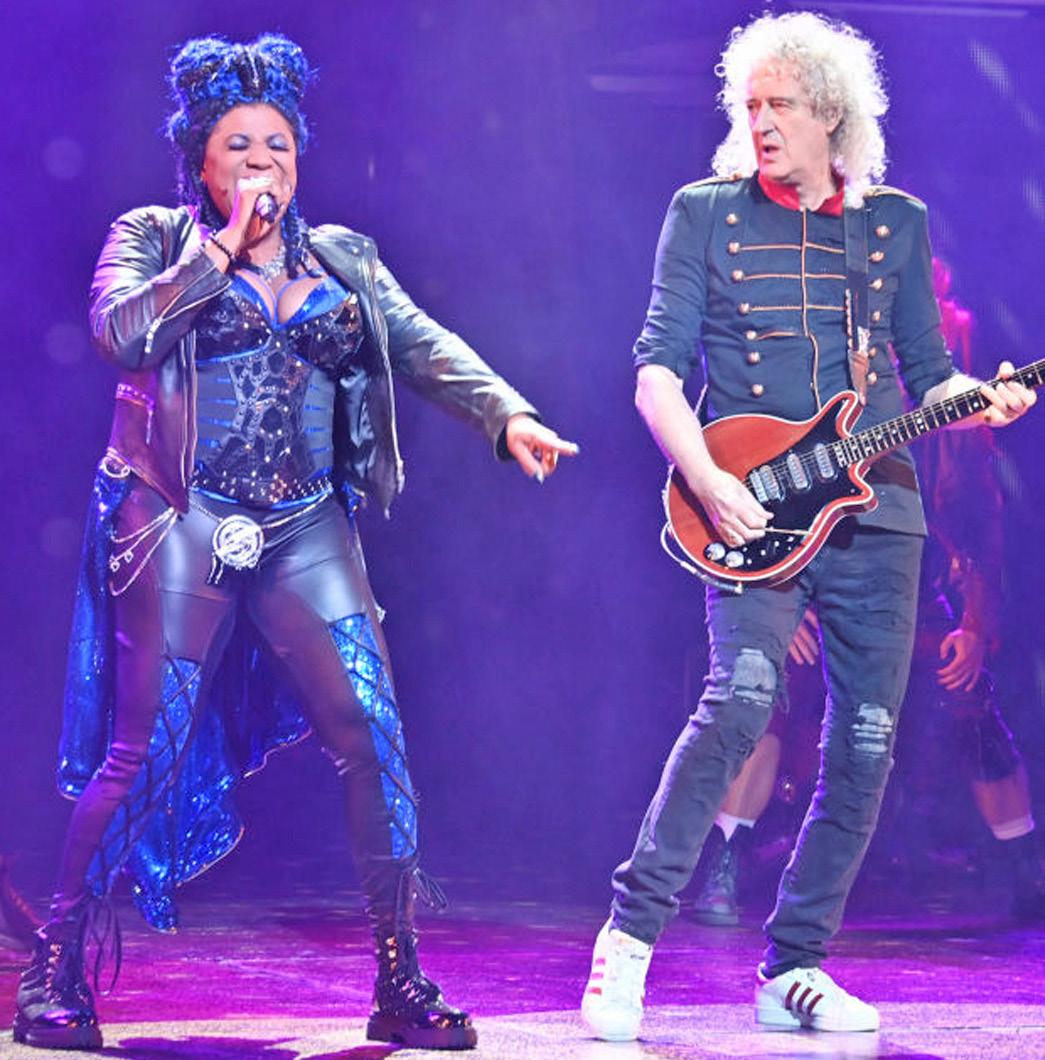
BRENDA EDWARDS

wants you to know she s doing fine she s busy and living as close to her best life as possible. She also wants you to come and see for yourself.
We all know what the Loose Women panellist right has gone through over the last year but if you want to see how the former X actor contestant is handling life take a trip down to the London Coliseum where Edwards is currently starring in Queen and Ben Elton’s sensational smash-hit show We Will Rock You laying the iller ueen a role she previously played in the record-breaking Dominion Theatre run years ago dwards told Lifestyle she felt excited to have been asked back to perform in the rock theatrical.
“It’s really nice to be able to revise this role again last time I did it was in 2009 in a UK and Ireland tour and then I came into the Dominion Theatre in 2010 to do the role there and I was there until when it closed so it s been almost 10 years.
“I am really proud to be asked back again and being given that opportunity to bring something different to bring a new avour to it which is something that I
am hoping to do. We’re 10 years on and a lot has happened in those years nd so the show grows with the times which is the beauty of Ben Elton’s writing.”
The limited 12-week season ends on August 27 and Edwards has implored musical theatre fans to come out and support.

She also wants you to support her new brand BeU.
Explaining how the name of the new clothing line embodies the characteristics of her family she enthused: “We Will Rock You is ust another layer my singing is what I am passionate about so in terms of musical theatre if I ever get the opportunity to do something like this I am going to take it.
“Aside from that I have started my own fashion label which is called BeU and exclusively available only on QVC. BeU is about
my family motto of believing in yourself so that s where my brand has come from.
“I want people to feel that they can be themselves in whatever they wear of mine to make it look however they want to. That has been going on in the background for the last two years.
“And it’s me designing it. Not ust me putting my name to it I m actually putting pencil to paper designing.”
She added: “I’m proud of that. I m proud that I can do that be here (We Will Rock You) and still be on Loose Women weekly.
“I still run my son’s charity that I set up the amal dwards elf Belief rust where we re offering apprenticeships to young people to bring them into the entertainment media and hospitality world. We give them the opportunity to do what they want to do.

“Aside from that there is SBTV that is still going on o I m the Killer Queen. It’s important to me to keep those things going.”
She wouldn’t elaborate on it but there is a book coming new album as well as a musical production in the pipeline. Like we said she s busy
Check www.voice-online.co.uk for more details


FOLLOWING ON from recently playing Ado Annie in the critically acclaimed multi award-winning production of Oklahoma Georgina nuorah is playing the lead role of Dorothy in The Wizard of Oz at the London Palladium.
nuorah right starred as Dorothy when The Wizard of Oz originally played at Curve eicester last year and her other West End credits include Millennials and as alternate Cinderella in Andrew Lloyd Webber’s Cinderella which showed at the Gillian Lynne

Theatre. The Arts Educational School graduate joins the previously announced principal cast of ason anford shley Ban o ianne ilkington ouis Gaunt Christina Bianco and Gary Wilmot. Mi-
chael arrison the producer of the smash-hit oseph and the Amazing Technicolor Dreamcoat now presents Curve s brand-new production of one of the world’s most beloved musicals which is set to run through the summer.
Featuring the iconic original score from the scar winning G film including Over The Rainbow Follow The Yellow Brick Road and We’re Off To See the Wizard the production features additional songs from Lloyd Webber and Tim Rice.
HITTING THE HIGH NOTES: Brenda Edwards and Queen guitarist Brian May perform during the We Will Rock You Gala Performance at London Coliseum last month (photos: Getty Images)Dexter

HE’S PUT together a number of taster days over the past few years in preparation for his ultimate vision to be realised, and next month sees e ter imms deliver his first ever Black Tech Day in south London.
The Mula Cake clothing boss and award-winning entrepreneur-turned tech visionary, has now brought together the great and the good to offer young and old the chance to get up to speed with what Simms describes as the ‘future’.
If you have a basic interest in all things AI, Blockchain, the MetaVerse or want to understand where Fintech is taking finance or simply ust love gaming and want to know more about the prospects of play to earn, Simms tells Lifestyle the Black Tech Day is where you need to be.
Lifestyle: How did the idea for Black Tech Day come about, and what motivated you to launch such an event in South London?

DS: I was inspired to organise Black Tech Day and create opportunities for the underprivileged communities due to the lack of representation and access to technology within the Black community. Studies have shown that Black individuals are underrepresented in the tech industry, both in terms of employment and entrepreneurship. Lastly, but very importantly, the lack of financial education being taught within schools is leaving our children at a disadvantage when it comes to life choices.
L: Could you share some details about plans for Black Tech Day? What topics will be covered, and how do you envision fostering engaging conversations?

DS: Black Tech Day will feature

 By Joel Campbell
By Joel Campbell
workshops and interactive activities designed to educate and engage attendees. These activities will include coding classes, panel discussions around finance with industry experts, demonstrations of emerging technologies and networking opportunities.
L: In what ways do you believe events like Black Tech Day can contribute to bridging the diversity gap in the tech industry and creating more opportunities for underrepresented communities?
DS: Providing education and information to the attendees is crucial however providing them the opportunities to learn, become interns, gain work experience and have partnerships within some of these large tech organisations is life changing.
ACCESS!
Access to technology is key as tech plays a crucial role in empowering communities, including those affected by crime and limited resources. Access to technology can provide opportunities for economic growth, education and social mobility. Studies have shown however, that there is a digital divide within the Black community with limited access to technology infrastructure, internet connectivity and digital literacy.
L: How will Black Tech Day cater to both young and older attendees who are interested in learning about the future of technology? What unique experiences or resources will be available for each group?
DS: One of the key aims is to have parents and children interact and build a stronger bond by learning en oying and investing together. Interactive learning will have them forgetting their life roles for a moment whilst creating memories.
Learning how and why to invest in each other’s future enables more confidence in financial decision making. Older generations want obs and want to learn about the internet via their phones while the younger generation wants to learn about investing and technology.
L: With the rapid advancement of technologies like blockchain, NFTs, and artificial intelligence, how will Black Tech Day help attendees understand and navigate these complex subjects in a way that is accessible and inclusive?
DS: Technologies are often e plained in argon or language which is unfamiliar to the average person, which usually puts them off wanting to engage or learn. At Black Tech Day we will have educators who are relatable, that come from similar backgrounds and have the fundamentals to speak the same language. We have fun, bite-size written, physical and alternative ways to educate the whole family on blockchain and show them examples of how it will be a part of their everyday lives.
L: Can you provide some insights into the role of
Black entrepreneurs, innovators, and professionals in shaping the future of the tech industry? How will Black Tech Day showcase and celebrate their contributions?
DS: With Black Gurus like Robert Smith or tech CEOs such as Iddris Sandu leading the way in tech and investments, bringing awareness and putting these types of leaders in the eyesight of the next generation exposes them to what is possible and gives them something to follow and work towards.
As finance and technology continue to intersect, what specific discussions or presentations will be included at Black Tech Day to explore the future of finance and its impact on underrepresented communities?
DS: Financial education is key and the Black community often gets left behind due to language and access, providing financial fundamentals around crypto currency and CBDC is vital as we are heading to a time when only digital currency will exist. Learning about debt management, investing and
credit will play a ma or part in the growth of the Black community and Black Tech Day plans to fill this gap
L: How are you ensuring that Black Tech Day is an inclusive and safe space for attendees from diverse backgrounds? Are there any measures in place to address potential biases or ensure equal opportunities for participation?
DS: Black Tech Day is not an exclusive Black event for Black people but more an event where Black people don’t have to feel accepted but rather included, this is an inclusive event for all ethnicities – however, we are attempting to tackle the statistics around Black people and underprivileged community being less than five per cent of the tech industry.
L: Could you share some success stories or examples of how previous Tech School Taster Days have inspired young students to pursue careers or further education in the tech field? How will Black Tech Day continue to foster this kind of inspiration?
DS: Previously, we have had three mini tech days over the
past 18 months and have seen drastic changes in the mindset of some parents and children. We had one single mother in particular who lived for her son, but couldn’t help him as much as she would have liked, due to the lack of confidence which stemmed from the lack of finances from the lack of education which was a domino effect. Roll on 18 months having become a part of my Mula Cake Bakery, which is our Web 3 educational platform, that mother now has a well paid ob investments, NFTs and has a better, happier bond with her child who has recently become an online gamer.
L: What are your longterm goals and aspirations for Black Tech Day? How do you envision its impact extending beyond the event itself, and what steps are you taking to ensure its sustainability and growth in the future?
DS: Black Tech Day has a five year plan so far which is to have Black Tech Day in London, Paris and New York before opening a Technology school for adults and children in 2028. We want our Technology school to become like the Xavier School from X-Men
Simms has combined his passions for tech and helping youn eo le y os n s rs Black Tech Day.
Jacqueline Boatswain is pretty excited about 2023 when she sits down with Lifestyle to speak about some of the projects she’s currently involved in – and why shouldn’t she be?
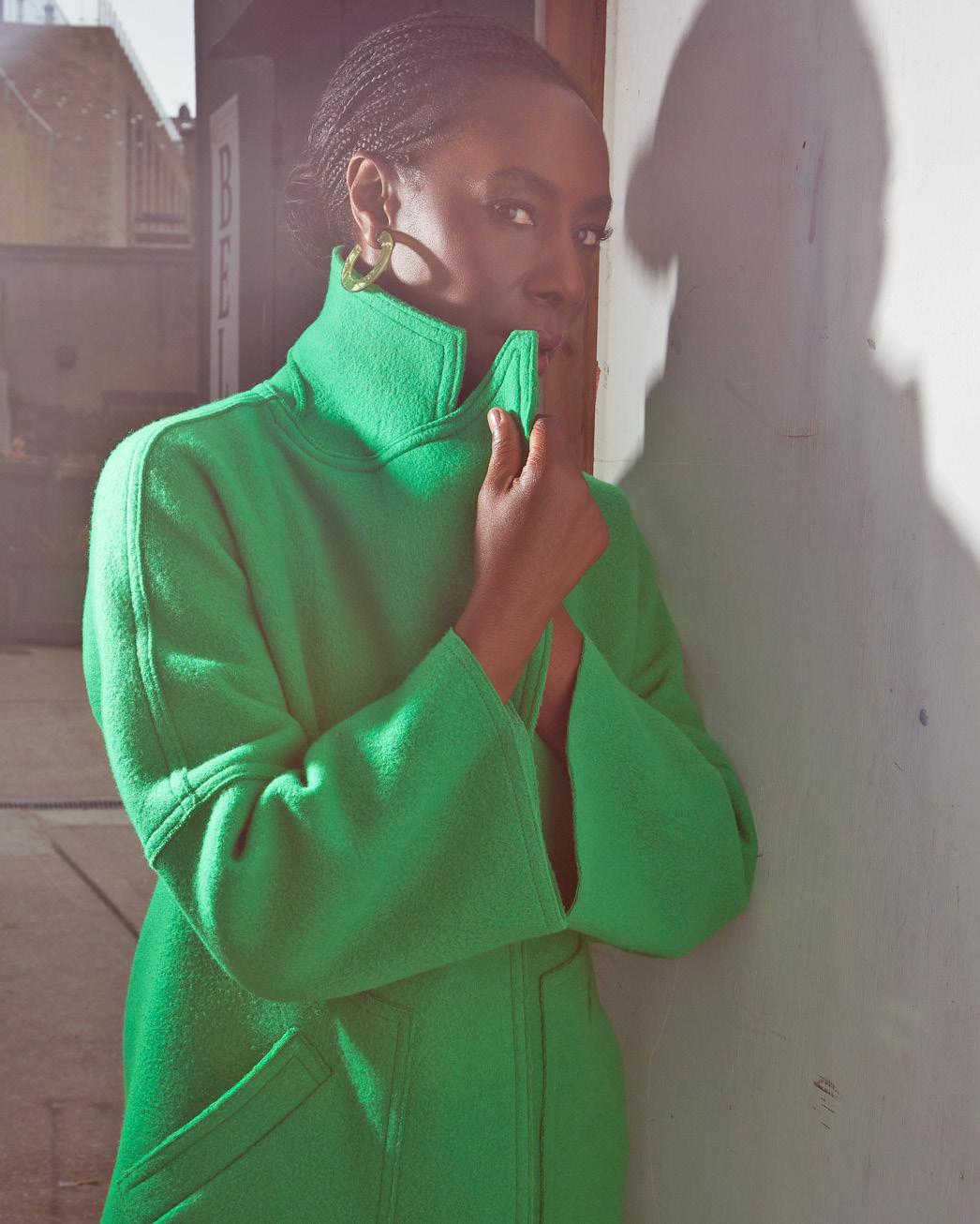
Having started out in the West End, singing and dancing in numerous stage shows for 15 years, she turned to acting and landed her first role in BBC show Doctors in 2001. It’s been quite a journey since.
aking a break from filming for new ITV mystery thriller show After the Flood in Manchester to do our interview, Boatswain recently announced she would be in new TV mini-series Ansani Boys coming out later this year alongside Whoopi Goldberg and Delroy Lindo.

hat s filling my cup the most is just being busy and this new ITV series,” Boatswain enthused. “It’s really exciting, it’s a mystery, it’s a thriller, it’s murder.
“It covers a lot of issues, environmental issues. I can speak on it a little bit, there’s a lot I can’t say. But it’s a six-part drama about a village that oods and the reasons why it oods
A body is found in an underground car park in a lift and it’s assumed that this person has been caught going down in
the lift to collect his car and he drowned because the lift filled up with water, but it transpires he was murdered three days before that.
“That’s how it all kicks off.”
Echoing Boatswain’s fervour, executive producers Nicola Shindler and Richard Fee said: “When Mick Ford brought the kernel of the idea of After the Flood to us, we were immediately drawn in.
“Not just by the catastrophic repercussions of a deadly environmental disaster in a town that could very well be our own, but also the intricacies and deception at the heart of the characters’ stories.”
Speaking on her role, Boatswain said she loved portraying something out of the ordinary.
“I play a Tory councillor and I help with the planning permission of a new, posh housing development called Uplands, and that is the reason why the village has ooded
“Things haven’t been set in place, like drainage and all of the ecosystems that were meant to be put in place by the developer, but he keeps getting planning permission, and there are reasons why he does.”
Boatswain added: “I liked that the character was ambitious, aspirational and is bizarrely a Tory councillor headed for Westminster.
“Sometimes you can be drawn to roles, but you’re not very often given them. Certain quarters of the industry see me as a lawyer or a detective or a judge or that kind of thing.
“Until I got into Shameless and started doing that type of comedy, that’s when they had an idea of ‘oh’. And as your career goes on, you’re offered roles that are much more fully rounded and three-dimensional characters.
“That’s what I like about this character, she’s three-dimensional. You get to see her home life and why she’s doing what she’s doing. You get to see her public face, there are all of those moments. I’m really enjoying it.”
Sticking with the subject of projects, she was excited when it was announced last year that Neil Gaiman’s Anansi Boys would be adapted for the small screen in 2023, with a lot of the noise centred on the likes of Malachi Kirby, Lindo and Amarah-Jae St Aubyn, who will all feature in the series.
post-production was slated to take around a year to complete. Boatswain, who plays Mrs Noah in the show, like the rest of us is e cited to see the finished article, and she’s even more grateful to have been involved.
Speaking on how she landed her role, she enthused: “So, nothing just lands on you. You get asked to audition.
ed and hyper during the audition, but it went well.”
Boatswain says she came out of the audition and called her agent to say she had opped But then the call came.
working on different days to the American actress. But she says it was a fantastic cast.
The news gathered a head of steam and anticipation began to build when it was also revealed that Goldberg will play Anansi Boys’ Bird Woman, a fearsome god-like character who is the embodiment of all birds.
“Because of the pandemic, we were doing a lot of self-tapes, which is basically you on camera filming the scene yourself in your home, and then that scene gets sent off.
“And that was instead of you going into a room full of people for the audition.”
Gaiman, the co-showrunner and executive producer, is writing the series with Lenny Henry from the audio book.
Filmed at First Stage Studios in Leith, Scotland, and premiering exclusively on Amazon Prime Video, Anansi Boys follows Mr Nancy’s two sons as they embark on an adventure following their father’s death.
ilming finished last ay but
She added: “I did my selftake and then I had a recall, which means they call you back to meet the producers and the directors, because there were three directors on this.
It was my first time in a room full of people, and I could feel myself having a bit of a panic attack. The window was shut, everyone was breathing and I had all of this anxiety about COVID that I came out of there not knowing how I could possibly have got the job.
“I felt so nervous and distract-
“It was unbelievable, we were in a film studio in dinburgh which is beautiful but it is beyond cold e filmed from November to May. I don’t think I’ve ever been so cold in my life.
“They built Brixton Station and the street, the set was just unbelievable and everything was green screen, so there are scenes where we were meant to be in the Caribbean and there were scenes where we were meant to be in a restaurant in the Caribbean, and so we’re in summer clothes but it’s February in Scotland by the sea.
“You’re literally covered up holding hot water bottles and then they go ‘action!’
“You had to quickly take everything off and try and do the scene as if you were in the Caribbean, and it just looks unbelievable.”
Sadly, Boatswain said she didn’t get to work with Goldberg in any of her scenes and was
Boatswain, who has featured in Death In Paradise, Hollyoaks, Grange Hill and Shameless, to name just a few over the past 20 years, said it wasn’t just the acting among so many great names that enhanced the experience, it was also the finer details that made it all the more enjoyable.
Singing the praises of Amazon, she said: “I was working for Amazon, my second time working for them.

“You are looked after and have the best of everything, you even have your own hair and make-up team one of the first times I d ever had a black hair and makeup team.
“For me personally, as a professional dancer, I had too many times when I was dancing on television when they would insist on doing my make-up and I would literally look like a freak on the screen.
“So, as an actor, I decided, ok this is what works for me, and I just had to work out a way that when you walk into the makeup room you to find a way to use your own make-up because some people get offended!”
ARE YOU ready to ride out for this year’s Black Unity Bike Ride (BUBR)? The route has changed but the FUNdamentals remain the same. The 16-mile ride is a celebration of Black empowerment, unity and love.

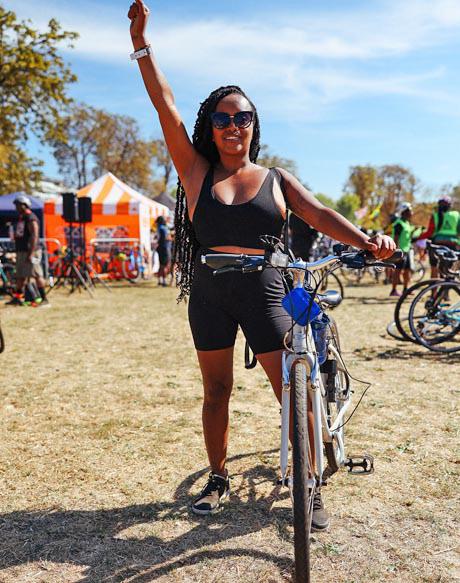

The event kicks-off at Leyton Sports Ground in east London and concludes at the BUBR Fest in partnership with BlackEatsLDN at Dulwich Park, south London via central London.
Lifestyle sat down with Tokunbo Ajasa-Oluwa, below, founder of B B to find out what the plans were for this year’s ride on August 5. Last year saw over 1,000 registered participants take part as the movement continues to go from strength to strength.
Lifestyle: How is the original BUBR mission going and how has that mission evolved in the last three years?

Tokunbo: The original mission was to celebrate Black unity and increase ethnic diversity in the sport of cycling. We are doing very well with both, which has seen the creation of the BUBR Alliance, which is made up of 17 Black-led cycling collectives in London. It’s also seen the launch of BUBR Africa — an annual cycling tour to the continent was the first year and we went to Ghana, 2024 we head to Rwanda. We also partnered with top cycling brand Le Col to produce our exclusive kit. In three years we’ve established ourselves
as a valued entity serving our community. The vision going forward is to do that on a larger scale and grow our community.
L: Very few organisations are addressing the under-representation of Black cyclists in the UK. As each year has passed, what does that look like from a BUBR perspective?
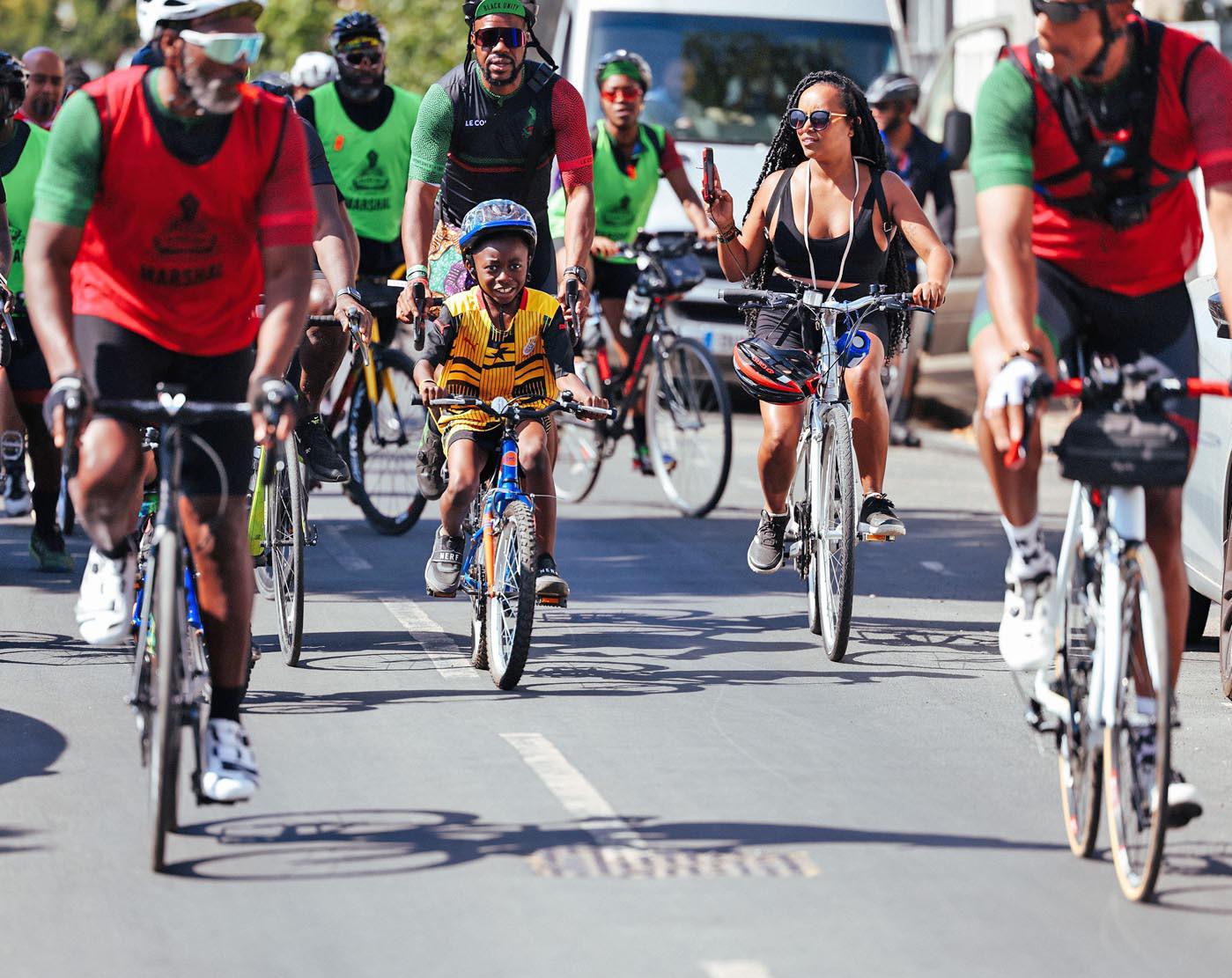
T: We believe in collaboration, and this is exactly why we formed the BUBR Alliance. When BUBR started in 2020, I only knew of a handful of Blackled cycling collectives and now we know of 20-plus, all catering for a variety of needs and abilities. We are seeing positive change, but more can be done.
L: Can you tell us about the BUBR recent jaunt to Ghana, your first overseas activation?
BUBR Africa took 20 of our community to Ghana, we covered about 500km and raised over £10,000 for a local NGO that supports young girls to cycle in eastern Ghana. It was a very special trip, and through cycling we were able to experience Ghana in a unique way as well as make a positive social impact on the ground.
L: For those that can’t make it overseas, what are some of the monthly activations organised by BUBR apart from the annual bike ride?
T: Many of the cycling collectives within the BUBR Alliance
have weekly rides that take place in and around London. ther specific B B activations take place at the VeloPark in east London – giving our community the unique experience of riding for the first time on an Olympic track.
L: So, the August 2023 ride, there have been a few changes, we understand. Tell us about those and generally what can riders expect this year?
T: Riders can expect to experience vibes upon vibes. We have moved the end location to Dulwich Park, which will also host the celebratory finale to the ride known as BUBRFest. As it’s in the month of August, it’s literally a carnival on bikes!
L: Last year’s ride won huge praise for the level or organisation – it helped
that you had the weather – but how do you hope to improve on the experience this year?
T: We will work closely with our operational partners to take on board the feedback we got from last year and aspire to raise the quality levels even higher. We are only three years old and still in the start-up phase, but see each year as a chance to improve. A big objective for us this year is to secure 300 volunteers, which is something we have never done to date.
L: Is it easier with each year to attract riders, and what are the challenges we don’t see?
T: Although we do get new riders each year, I do still feel we are a best-kept secret, so spreading the word is a
big thing for us. The biggest challenges, though, are the logistics, we have to partner with many authorities and suppliers to pull off the event successfully each year. It takes a huge team effort, and a lot of that work is done by passionate volunteers.
L: Why did BUBR introduce a minimum donation fee for registration, and how much did it generate in donations?
T: he annual ride has significant direct costs, the donations received cover about 10 per cent of our costs, but is valued. This is a community event, so it’s important that all stakeholders invest in its existence and growth, and that includes participants too.
L: What were the direct costs of organising last year’s event, and what
A WHEELY GOOD TIME!:
The BUBR annual bike ride has always been one of the most popular events on the calendar, and this year’s 16-mile trek on August 5 promises to be no exception
percentage of those costs did the donations cover?
T: The ride’s direct costs last year were £60,000-plus in kind support. The entry donations were £6,000.
L: What are you most looking forward to this year. Last year you kicked things off with your son, a beautiful image, can you top that? And he’s still very young but does he want to ride again this year?
T: This year I’m hoping to ride out with my wife and two children for the first time nd I m really looking forward to hearing the speaker boxes bumping music as we ride through central London. That moment always gives me chills!
Byron Messia demonstrated a vulnerable side when I got the chance to talk to this incredibly talented Dancehall artist from St Kitts and Nevis
TRADITIONALLY WHEN you talk about Caribbean music, I think it would be fair to say your automatic calculation would be Jamaica = Reggae and Dancehall, Other Islands = Calypso & Soca. Other than a few moments that have broken the norm.
In 2023, we can rip up that old script, because we are reading from the new scrolls based on what I see going on, musically.
Jamaica is enjoying the relationship it has with Soca currently, and we recently saw this with the success of the Jamaican Carnival. Fetting in the streets of Kingston, Jamaica has now become staple in the carnival calendar, with everyone getting involved from uptown to downtown.
hen on the ip we all can see the growth of the Trini Dancehall scene, with names like Prince Swanny, Kalonji, Boy Boy helping stamp the name Trinibad as a force to be reckoned with. If it’s about numbers, go and check the stats, ‘cos they are not slacking!

With all that said, I was taken aback when I discovered the name Byron Messia. I had never heard about him until I saw the heat on his current song Talibans
Talibans, which he describes as an Afrobeat riddim, has elevated this artist from the quiet island of St Kitts and Nevis to a Dancehall artist that everyone is watching.
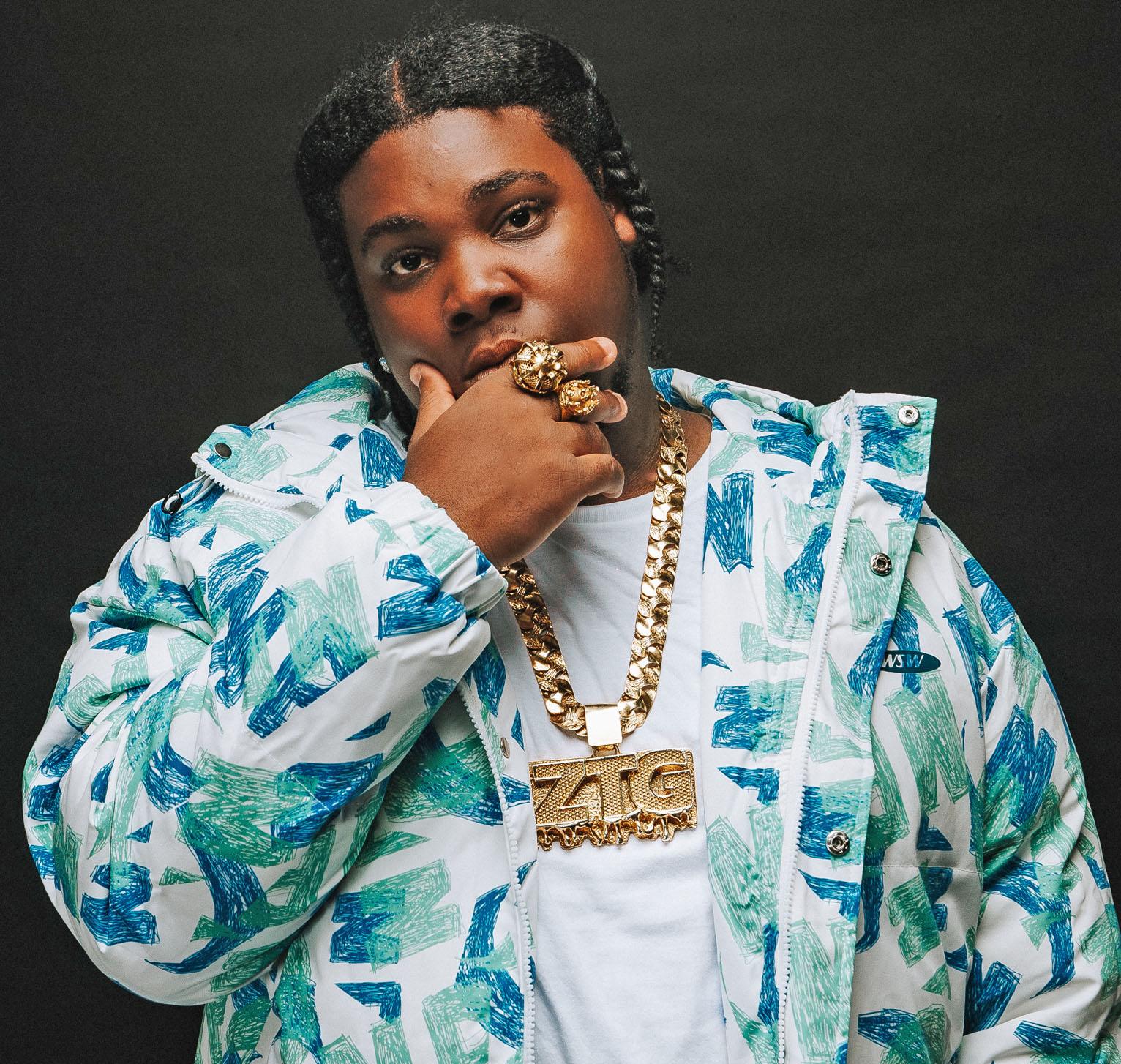
Before I met Byron, I had an air of uncertainty about our meeting due to an interview I had seen with The Fix Podcast that was eventually removed from YouTube as it didn’t paint the artist in a good look.
For me, he came across quite arrogant and full of himself, which then led to him talking himself into problems when he said: I don t take any in uence from Jamaica!”
Really now! I don’t usually do the BBC HARDTalk-style
of interviewing, but I felt that this was the route that needed to be taken as I find it difficult to comprehend how an artist can say that when they have a song called MOCA, which is the Major Organised Crime and Anti-Corruption Agency. The maths wasn’t mathing for me.
Upon our meeting, I could see that he was quite nervy to meet me. Many of these artists sing about being hard, but in environments that they cannot control it’s amazing to see their vulnerable side.
It’s my role to make my guests feel comfortable, which I did, until we spoke about his album No Love which is 16 tracks of a lot of pain and darkness. When
I challenged him on the fact that there isn’t one party song or girls song on the project, he just laughed and said: “I’ve been through a lot of things, Seani, some things that I don’t even want to talk about.”
This I could understand, but I did want to know how he deals with the demons, and feeling like an empty vessel. “Hennessy
is my best friend,” was his reply, which earned a chuckle in the room! Not from me though.
On my journeys, I see too much depression and mental health issues that artists are trying to fi with drink and drugs This is where the conversation got serious, big brother to little brother.
Byron expressed that, since the rise of Talibans, the popular loner syndrome that he feels has increased, as so many people are around him but don’t know him. The room fell in silence as I looked across to his team.
It was uncomfortable to watch how uncomfortable the young St Kittian looked, but this is the reality of what life is like when
you get the buss on TikTok and the world is looking at you all of a sudden.
This wasn’t the artist that I watched who was full of himself on The Fix interview! When we spoke about that interview, he said: “Seani, that was me being petty at the time. Remember an artist (Jeff Fullyauto) said that I took his style. Also, that was me as an artist saying that I don’t want to limit myself too.”
I listened and heard everything, and offered him the chance to apologise for his comments knowing that he wasn’t thinking straight and was probably a little gassed at the time. Byron seized the moment and said: “My fans (Jamaicans)
felt away, when I was reading the comments, they said the dawg bad, but the comment he made, bwoyyyy!
“I just want the fans to know it wasn’t that serious and I don’t want them to get in their feelings over a comment I made when I was being petty, so I apologise for that.”
It felt like a weight had been lifted off his shoulders for him to move forward in the manner is career looks like it’s deemed to go.
The album No Love featuring current big song Talibans is available to stream now, just make sure you’re in a positive mood before listening.
If you saw s arro an ’ n er e on ou u e ’s e o n a a n a ou s o ar s
“I’ve been through a lot of things, some I don’t want to talk about”
IF YOU haven’t seen Riches yet, there’s good news, the show will be airing on ITV1 following the successful roll out on the ITVX streaming platform earlier this year.
Riches tells the story of the complicated Richards family. For over 20 years, their hair and cosmetics empire, Flair & Glory, has dominated the hair and beauty scene. The story begins with the unexpected twist that sets the narrative for the six episode series.
As well as being beauti fully shot with a gloss typically seen on Ameri can shows of a similar style, there is a re freshing and relatable atten tion to detail where the telling and presentation of the story are concerned.
We don’t see programmes like this often, especially on terrestrial TV, but why?
“I often answer that question by saying that it is best to ask the people in the establishment why we haven’t had this before because the gatekeepers are the ones that have kept the padlocks on,” says Abby Ajayi, inset, director of the hit show, tells Lifestyle
For those who are coming across her name for the first time, Ajayi graduated from Oxford University with a law degree. She began her career working in script development at the BBC before turning to writing.
Sharing a little bit about her
journey, she said: “In the context of this (Riches) I am a TV writer, producer and director.
“I’m from north London and watched lots of television as a child. My mum would be like, ‘read your books,’ but I was watching television, most often the American exports.
“I really wanted to work in TV and I have been trying to create stories. I’ve worked on other people’s shows, I did episodes EastEnders, Casualty and that kind of stuff at the BBC. But I was looking for opportunities to create my own
“And in the end I came over to the States because there were more epi-
“Here (in the States) you learn how to show run, which is you are literally producing your own episodes. You go to set, you work with the directors, you work with every member of the team. So having been in for about five years, I’d sold this idea (Riches) to ITV about a Black family business, and I came back to the UK to make that show.”
The cast in Riches features the likes of Sarah Niles, Brendan Coyle, Hermione Norris, Adeyinka Akinrinade, Ola Orebiyi, CJ Beckford, Nneka Okoye and Emmanuel Imani.
In the show a smart businessman, with an undeniably ruthless streak, Stephen Richards (played by Hugh Quarshie) is one of the UK’s most successful
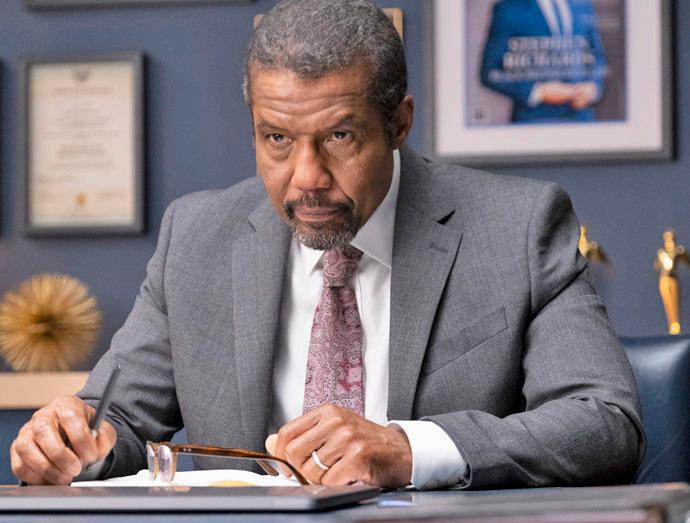
Black businessmen. He’s built his renowned business empire through hard work and his entrepreneurial skills, making it the market leader in black hair and beauty. But, his rise to the top hasn’t been easy.
After 20 years of success, he’s at the helm of a multi-million pound cosmetics empire and is reaping the rewards of his ambitions.
Speaking on her desire to bring this story to market, Ajayi enthused: “In telling a story about a Black-owned, hair and cosmetics empire, I wanted to tap into entertaining, contemporary stories about British identity.

“Black beauty is political, it is also irreverent, creative and very lucrative.”
She added: “The show is unashamedly glamorous and it was a joy to shoot London with an eye on showing its beauty and showcasing the myriad sides of the City. The series explores contemporary questions about pow-
er, identity and Black ambition. In every episode, we have stories about the business and the fight to save Flair & Glory and yet, at its core, the show is about very relatable relationships — sibling rivalry, complicated matriarchs, messy blended families.”

Shot during lockdown, Ajayi paid homage to the team that enabled her vision to be brought to life.
“Shooting during Covid presented many challenges and I’m proud of the crew and our talented ensemble of actors, all of whom brought a phenomenal level of commitment and passion to the project. I’m excited to bring this show to the screen and I hope audiences will fall in love with the Richards family.”
It would be remiss not to speak on the unusual aesthetic of seeing a show featuring a predominantly Black cast, at prime time on a terrestrial TV channel.
Could Riches mark a sea change in attitudes within major networks and traditional institutions? Are the talented Black creatives behind these types of shows finally being recognised
Ajayi says the personal achievement feels great, but we haven’t reached the promised land.
Sharing her own ideas on what could bring about a landscape where shows like this are shown more often across terrestrial television, she said: “In terms of where we are now, I feel very strongly that the talent has always been there.
“So it’s not just that there is a groundswell, it feels like technology has commodified things a little bit.
I think the burst of web series and things like that meant that people put their work out there and it became a thing where if you’ve got Black creatives making their stuff and putting it on ou ube and finding audiences then suddenly the gatekeepers are thinking, ‘oh, we’re going to get cut out from that interaction’.”
She added: “So there becomes an economic need for them to get in there and pick up those great shows and web series on YouTube and get them onto BBC Three wherever they are going to put them on.
“So I think technology has made it easier for creatives to get their work seen and for them to directly target Black audiences who are saying, ‘if I don’t see myself on terrestrial or the more traditional networks, I will go and find them via social media
“I think that is good for emerging artists and creatives. But I

still think there remain significant blocks.
“Sure, Riches is coming through and sure, there have been a few shows coming through, there are a few I am looking forward to in a few months, but I think there is always room for more.
“And there is also room for different types of shows, different perspectives on shows. I want more shows about middle aged Black people because those stories weren’t told and those audiences are still there, those characters and stories are still playing out. As with all television and all media, there is an obsession with youth, that is understandable, but I still miss those stories that we kind of missed coming up. I want to see where those are now.
“Ultimately I feel that some audiences are open to new and interesting things and some are not but I don’t think a minority should get to define what we get to see.
“So I am hopeful that we do get to see more Black British creators able to create, produce, direct and write work in the UK because that very notable creative drain, where so many of us had to leave the UK and come to the States, it’s noticeable particularly amongst actors but it’s also a very real thing insofar as, if there is not any opportunities to create and there are systemic blocks, people have to go and find places to earn a living
“I feel there is still a lot of work to do to ensure that people break through.”
EMMA NORRY wants all children – but especially those from the care system – to ‘feel seen’ with her latest book Fablehouse Norry, 48, is a thrilling talent who, having been through the care system herself, brings heart and authenticity to this extraordinary kids adventure.
Fablehouse, a mysterious mansion surrounded by ancient woodland, is home to some of Britain’s ‘Brown Babies’, born during the Second World War.
Speaking on the book with Lifestyle, Norry said: “So, Fablehouse is a magical adventure for eight- to 12-year-olds. It’s set in 1954 in Somerset.

“It’s about four kids, four brown babies who live in an orphanage. The main character is called Heather and the story is told from her point of view.
“She’s been around a few chil dren’s homes and she’s not looking for any new friends at the moment.
“But she doesn’t really have a choice when she meets three other kids and together they find a Black Knight called Palamedes, who is kind of out of his head a bit. When they find him he looks like he’s been beaten up, and Pala medes tells them eventually that he is from King Arthur’s Court and that he was tasked with protecting a doorway to make sure the world is kept safe.
“He tells them all the kids are in danger because the evil foe are trying to overtake the world. So the kids, the Rome as they call themselves, Heather, Arlene, Nat and Lloyd, all join together with pals who basically save Fablehouse and save their world.”
A magical adventure, steeped in Arthurian legend, Fablehouse uncovers mythology never told and makes heroes of children who are often on the outskirts of society.
Norry, who as well as being an author also has a BA (Hons) in Film and an MA in Screenwriting,
grew up in the care system in Cardiff, but now lives and works in Bournemouth with her husband and family.
Explaining how her own life experience growing up has shaped this story, she said: “My mum is white and Jewish and I don’t know my dad, I’ve never known my dad.
“My mum thinks he’s Jamaican, pretty sure he is, but when I was about 20 she said she wasn’t sure as it could have been one of two guys.
“So, I’ve never had any luck in terms of trying to trace him or anything like that.
“My mum was a heroin addict so I was put on the child in need register really early on, when I was about 15 or 16 months old. And I was in the care system up until I was 18.”
In total Norry was in five foster homes growing up, ‘some good, some bad, some ugly’.
During that time she had limited contact with her mum but admits there was no real relationship built until she was in her late
The author says while the tumultuous nature of her upbringing forms a big part of the underpinning narrative that runs through , it’s not the only reason she was inspired to put pen to paper.
She explains: “This project wasn’t my original idea.
“There is an amazing woman who has been in publishing for years and she’s a writer herself, called Jasmine Richards. Four years ago she set up her company, StoryMix.
“I’d met her before and found her very inspiring and she came to me a couple of years ago with this project, saying that StoryMix was a company where she wanted Black and brown kids to see themselves on the front covers of books.”
She continues: “They need to know that they can be the hero of their own story.
“That really struck me because when I was growing up there was never any representation in books at all. And it’s through being published in the first place that I have come to understand any history really and my mixed (race) place in it and kind of educate myself.
I think the last five years have been really major in that way.
“So when she came to me about this project she knew that I’d grown up in the care system because that’s what she’d read before in a book I’d been trying t get published for ages about being in the care system.
“It was her idea about the four kids and the knight because she is really into Arthurian myth, but we both really love real history that can be inspirational and she told me about this book she’d read called Britain’s brown babies by a woman called Lucy Bland.
“I’d read that book as well and was just blown away by it.
“There was this whole layer of history that I had no idea about, never been taught about and just found loads of parallels with my own background.
“Not knowing my dad and that whole thing of the white women, the American G.I.s and all of these brown babies, there were thousands of them shipped across different orphanages.
I found it really moving.
“And as soon as I started to write, it was really healing in a lot of ways. I managed to put loads of my experiences and background into the book and the characters. So that’s where it became a collaborative, but beautiful thing, that has ended up being deeply personal.”
If you have the time head over to the Voice website for the full and candid video with Norry where she details where her
WRITING HER OWN STORY: Emma Norry says her past experiences have shaped who she is today – and brought around her book
love affair with books and writing stems from.
She dismisses the idea that diving into literature provided an ‘escape’ from the topsy-turvy life she’s endured but as people itted in and out of her life at a young age, reading offered another way to garner perspective on life, which was a world away from the dour everyday occurrences in Cardiff.
She admits there are still frustrations, which she is learning to get to grips with in the publish-
ing world, however ensuring she adds to the literary landscape, producing stories that elevate the voices of Black and brown people is fuel to her fire

So, will there be a follow up to Fablehouse?
“Yes. It was signed as a twobook deal,” Norry enthused.

“So, right now, I am editing book two. Which is great fun. It’ll be out next April.”
She added: “Writing for children is a massive privilege. I’m hoping that all kids, but especially Black and brown kids, kids that might not live at home or might not be with their parents or have any tricky circumstances, I really hope they can see themselves re ected in this book
“And that they know that their own special gifts are just that, gifts.
“And that there is power in whatever areas that they may struggle with.”
“Black kids need to know that they can be the hero of their own story”chil-
A NEW PASSION: kua siedua sare oupalo alongside her growing range of Shimirose products at a farmers market

VEGAN SKIN and hair care brand, Shimirose, are set to open their first brick and mortar shop in Brixton Village this month.

With its most popular products including their shea butter range, Trio hair care, the brand has been trading in various armer s arkets and first started trading in Brixton Farmers’ arket on Bri ton tation oad
Founded by Ghanaian-British kua siedua sare oupalo after she failed to find a good natural skincare product to treat her daughter’s eczema, she tells ifestyle that it was also her own personal journey that led her to establish himirose five years ago.
A MESMERIZINGLY told, unsentimental, tender memoir about Alex Wheatle’s childhood abandonment, being raised in an abusive children’s home in South London, and then his involvement in the Brixton race riots of the early 1980s, hits the bookshelves this month.
Sufferah: Memoir of a Brixton Reggae Head digs into the culture and

She explained: “I have been a vegetarian for 30 years, but was told that I am also a default vegan as I am lac tose intolerant since birth.”
Address: Shimirose, 32 Granville Arcade, Brixton Village, Coldharbour Lane SW9 8PS
The shop launch weekend event is on July 29 and 30 from 1pm – 5pm on both days
bedded this in its DNA since the founding of the brand in 2018. Now, the Shimirose shop launch will see the brand release five new surprise Shimirose products on the day, exclusively available at the Brixton shop.
With the opening of the venue in Brixton Village, Asareoupalo e plained what made her choose to settle in the south
She also explained how she envisioned the shop contributing to the local community.
wanting to change their lifestyle by going greener.
“I have always been green. Perhaps growing up in Africa, surrounded by nature and animals, I have always been conscious of my surroundings and wanted to keep the planet beautiful. Naturally, I extended this clean green ethos into Shimirose.”
sare oupalo understands that the use of shea butter in beauty and skincare products isn’t a new phenomena but she says the added bonus for those who purchase her products is knowing that they are sourced from the Motherland.
She enthused: “I am originally from Ghana and also becoming a mother (with daughters aged three, 11 and 13), I felt it was important to support other mothers back in my homeland
lifeline through disrupted teenage years and the challenges of living as a young Black man in 1980s Britain.
Jamai



especially the music of South London’s AfroCaribbean community of the times. It ends with Alex’s first visit to Jamaica to meet his father for the first time – a difficult, though healing experience.
Abandoned as a baby to the British care system, Wheatle, inset, grows up with no knowledge of his Jamaican parentage or family history. Later, he is inexorably drawn to reggae, his
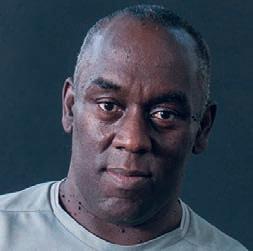
She added: “I was inspired to start Shimi rose skincare after our third daughter was born with ecze ma.
“She was ex tremely uncomfort able and I didn t like seeing her so unhappy. I had also suffered from psoriasis therefore I knew how she was feeling and wanted to help her.
“My mother brought me shea butter from Ghana and asked me to stop using anything else and only use pure butter.”
sare oupalo s Ghanaian sourced shea butter has been a hit with customers and in a world that is becoming increasingly conscious of consuming cosmetics, Shimirose has em-
“I started trading in Brixton Farmers arket and have always loved the people in Brixton and their mixed cultures.”
She added: “For five years I kept walking through the Brixton Village dreaming that I would one day get a space, so when I was approached to have a shop there, I did not hesitate.
ven though I knew it would be challenging financially
“Our contribution to the community will be huge. Being able to provide natural authentic products from Ghana and also providing handmade skincare and haircare which will benefit women, men, and children who have sensitive skin r for those
“This is what made me source the shea butter from a community of 40 women in the North of Ghana.”
Since the birth of Shimirose the brand has gone on to release hair products, African Black oaps for women and men, as well as a shea butter soap for children.
They have been featured by the BBC and CNN and Asareoupalo says she s e cited about the future as more people become aware of what she’s producing.
She remains tight lipped however, on the new additions that will be exclusively available at her store.
“What I can say about the five new products is that two of them are made in Ghana and three are made in the UK. Shimirose blends the best of both countries.”
he h m rose ou der kua’s dau hter su ered th e ema o ly her o shea butter ould do a d o she’s tak a hole ra e to Br to . By Joel Campbell
TALENTED GOLFER
Nicola Bennett is on a mission. The Londonbased PGA professional is currently a Golf Foundation Ambassador helping to inspire young people from all backgrounds engage with the sport.

The Foundation works to introduce golf to children from all backgrounds, working in schools, communities and golf clubs. Last year, they introduced over 200,000 children to golf –48 per cent were girls, 13 per cent were from an ethnically diverse background and 11 per cent had a disability.

Nicola has a burning desire to make golf more inclusive. Along with the Foundation, she is keen to inspire new young players from diverse communities, as well as mature women.
Nicola took time out to speak to the Voice of Sport about her own start in golf and some of her ambitions.
RH: Tell me when golf became important to you and why?
NB: It became really important when I was about 12. I realised how golf could introduce me to people, and how I could become a really good person as a result of playing golf.
I was always able to be in decision-making processes and I was just able to be myself in a tranquil environment I felt really good in. It stopped me from doing stuff like going to shopping centres with friends, and stuff like that, and it gave me a lot back. It really taught me how to be comfortable in a corporate environment.
RH: At what stage did you, in those formative years, get a sense that you were actually good at the game?
NB: I was chosen to represent England and do an England training session in Kent and, by the time I was 13, my handicap was six, which was quite a good standard, considering I had only played for three years. I was at a good standard at a young age, which was seen as promising.
RH: So you went from ‘promising’ to being a golf professional. Take me through some of the steps to get there?
NB: It’s not as smooth sailing as it sounds. It sounds really nice to be in the position that I am now but there has definitely been hardships and coming to a lot of difficult decisions and making sacrifices
I always wanted to pursue a career in golf but, at the same time, I wanted to experience university. So I took a gap year, and I worked three different jobs in a golfing facility and then I thought, ‘do you know what, I’m going to do the PGA degree,’ and it was perfect, because I was able to work full time while pursuing a degree. That’s the sort of avenue I took.

I got myself into a few naive situations with sponsors and stuff like that, and it’s taken time to get to a position where I am now, where I’m comfortable in making all my own decisions and have grown a lot as a woman.
RH: What’s the most satisfying thing about the sport for you?
NB: Giving back. I know it sounds a bit of a cliche, because everyone says it. Honestly, the feeling I have inside is just overwhelming.
When I see the women that I coach, getting so much from this game, I feel like I’ve really helped to build a community. All my women support each other, we talk to each other about every and anything. I look to support them through whatever they’re going through, whether they want to discuss it in groups and go out and play golf together or if they want some time
gives so much back this game, it really does.
RH: You’re ultimately very, very keen that young people and women of all backgrounds get a chance to benefit from the game What are those benefits?
NB: he benefits are networking
You get to meet people from different industries who are part of different firms and organisations in the game. You get to push yourself to be the best version of yourself through playing a sport that’s disciplined.
It’s not like a team sport, like football or netball, it depends on your own individual score. So you get to challenge yourself and, naturally, I feel like that transitions into things we do in everyday life. I think it’s also beneficial for health reasons being in such a beautiful environment, getting your steps in,
having some fresh air, and just being away from pollution. I would say those are the major benefits from this game
RH: What are amongst some of the challenges you and your groups have had to face?
NB: Well, I think naturally, being a female, being a black female, being a young, black female, in this environment. There has been a lot of psychological challenges that I’ve had to take on from being a young, black female. It’s definitely made me stronger I m very thick-skinned and, if anything, it just drives me to want to make this a bigger community and get more people involved, because it needs to become normalised that all golf courses see people with different backgrounds.
You do get people in golf clubs that are not comfortable with people from different backgrounds being there. At the same time, I personally feel it drives me more, and I really do feel like the people that I coach are an extension of myself, especially when we’re from the same background.
I feel like any battles they face are my own as well, and battles are won in bigger numbers, and that’s an even bigger reason for more people to get involved in this game. We’re quite far away from that at the moment, but I’m hoping that I can be a part of the bigger picture and making sure that happens.
RH: What tribute could you pay to Bush Hill Park Golf Club where you do your coaching sessions?
NB: I’ve got so much gratitude towards General Manager Stewart Judd. He is so forwardthinking, and he really believes in me. He believes in making this club, and just golf in general, better, more diverse, more inclusive.
Honestly, if it wasn’t for Stewart, I wouldn’t be able to do half the things I do at this golf club. But he does say that I’m a loose cannon sometimes! It’s really important to have him on board as well as the committee.
A lot of people in golf clubs don’t really have entrepreneurial mindsets, some people don’t, it’s more about authority, but you have to think about the vision, and you’ve got to think
about the bigger picture. In order to do that, change is needed. A lot of people who have been used to something for a long time don’t like change, but they just have to adapt or be silenced.
RH: Where would you like to see our community, young people and women, in say, fi e years’ time in terms of golf?
NB: n a five year scale I d like to see the statistics change, and grow in the sense of I’d like at least 50 per cent of members to be female.
I’d like at least 30 per cent to be from diverse backgrounds. I think that’ll be a lot of growth.

I think those targets are what we’re working towards but in order to do that, we’ve got to branch out, there’s got to be a marketing strategy, because a lot of people don’t even know about this golf course in north London. I think it’s because we don’t go into communities where you get more diverse backgrounds to create an awareness.
I think those are going to be really big steps in making sure we reach those objectives.

MANY PEOPLE will have their own personal recollections of Mike McFarlane, who was affectionately known as ‘Mac’, but I was privileged to embark on a journey with him that would span over four decades and could not have been foreseen.
ike would first come to my attention in the summer of 1977.
I was a teenager and a budding triple jumper living in Harrow at the time. I had narrowly missed out on a place in the Middlesex team to compete in that year’s English Schools Athletics Championships which was being held at Barnet’s Copthall Stadium. I was invited to attend and support the county and was seated with the Middlesex squad throughout the championship.
I recall the excitement was palpable in the lead up to the men s metre final as everyone one was talking about this precocious teenage sprint sensation from Hackney called Mike McFarlane who was representing the London team. I was privileged to witness something very special that afternoon as Mike blazed around the recently laid all-weather tartan track, running an amazing bend to clock a spectacular windy 20.9 seconds — a time which is yet to be bettered over 45 years later! His smooth running of the bend would become legendary and he was arguably one of British athletics finest e ponents
A year later I had exchanged my Harrow postcode for Hackney where I was introduced to Haringey and Southgate Athletics Club by a college friend. Not long after my arrival the mercurial sprint coach John Isaacs and several of his talented young sprinters, which included the teenage Mike McFarlane, moved from east London’s Victoria Park Harriers to Haringey’s set up at New River Stadium.
In the summer of 1978 the club was newly named and as Haringey Athletics Club would be transformed with the assistance of coach and centre manager Sandy Gray. With the guidance of Ron Pickering, the
respected BBC sports commentator and the club’s pioneering president, Haringey would be transformed.
Over the next three decades the club rose to prominence and it was widely acknowledged during this period as the Liverpool FC of British club athletics, winning multiple Gold Cups and British League titles as well as representing GB in the European Clubs Championships. Mike was undeniably the club’s talisman throughout that period.
But to truly understand the significance of ike s contribution to Haringey’s golden years, you did not have to look any further than a generation of inspired young black male and female athletes now daring to dream. Mike’s name became synonymous with Haringey’s success and Pickering would regularly name-check Mike and the club at every opportunity on his television broadcasts.
Mike was truly a young man in a hurry and in 1979 he was the club s first uropean unior Champion over 200m and gained a bronze in the 100m. That same year, he was a member of Haringey’s talented sprint quartet featuring Micky Morris, Claude Moseley and Clarence Callender, which would break the UK record for the senior men’s 4x100m — a record that would stand for several years.
Although I trained with the triple jumpers under the watchful eye of coach Richard Gyesie, this period produced a special kind of comraderie with many forging new and lasting friendships. I soon discovered that Mike was a close neighbour who lived just minutes away from my family home in Clapton, so the next part of the journey literally unfolded as we chatted on the bus home from training.
The late 1970s through the 80s was a special time to be a member of Haringey AC, which was one big family full of personalities and memorable banter, especially amonge the sprinters. New River Stadium would also become a training Mecca for
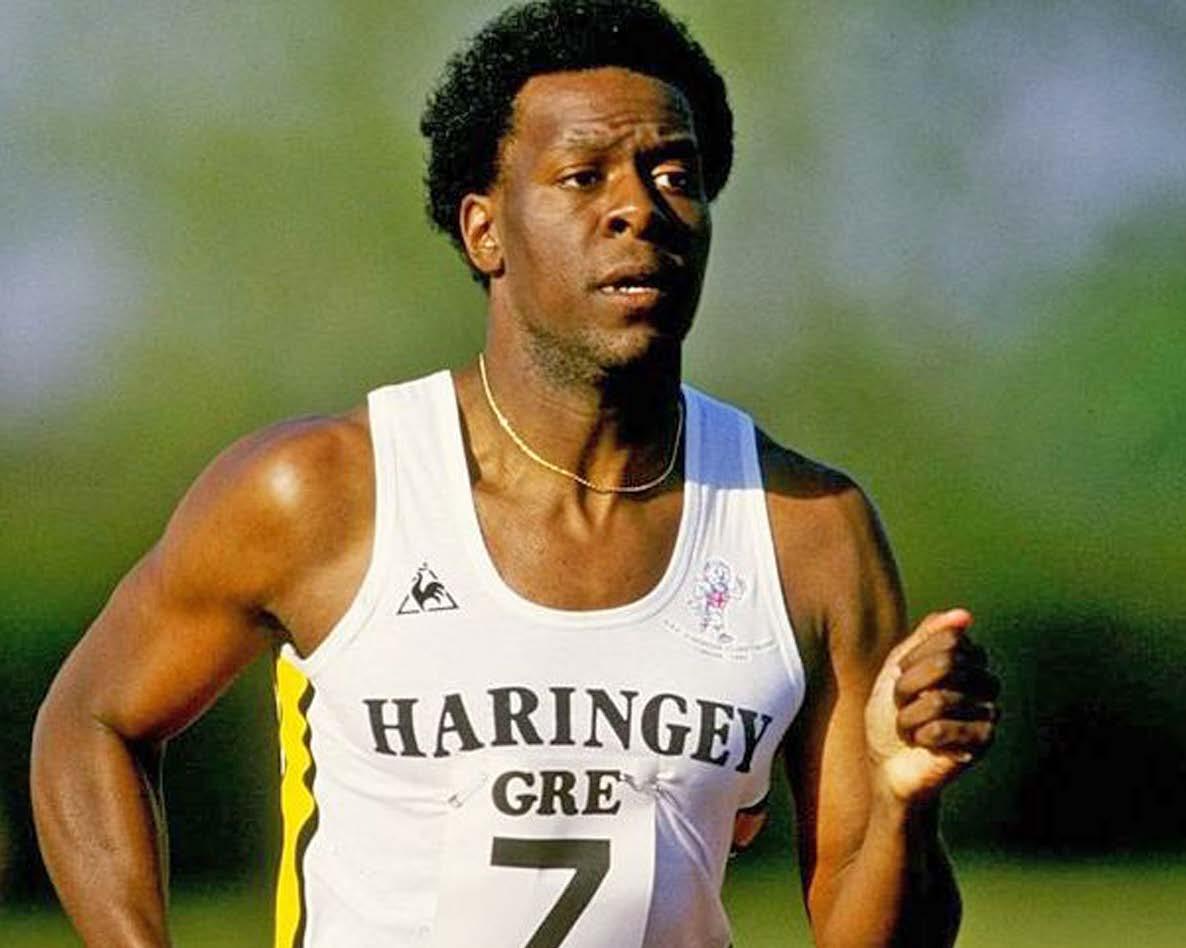
prominent athletes from other clubs, which included Shaftesbury Harrier sprinter Donovan Reid, Mike’s close friend and training partner in a John Isaacs multi-talented training group.
Mike’s historic joint Commonwealth 200-metre gold medal with Allan Wells at the 1982 Brisbane Games became one of most repeated sporting moments on British television.

Although I did not attend a Hackney school, many of my friends who attended Brooke House School with Mike, considered him a local legend responsible for putting Hackney on the sporting map. Amazingly, the sport that had provided a stage for Mike’s talent to shine would open the door for me a year later as I embarked on my journey into sports journalism.
I would become The Voice’s Sport Editor, and over the next several years I would get to wit-


ness Mike’s track exploits from a very privileged vantage point and saw him win medals at the 1986 Commonwealth Games in Edinburgh and just weeks later at the European Championships in Stuttgart.
Mike claimed England’s sprint relay silver medal alongside Lincoln Asquith, Daley Thompson and his Haringey teammate Clarence Callender in Scotland.
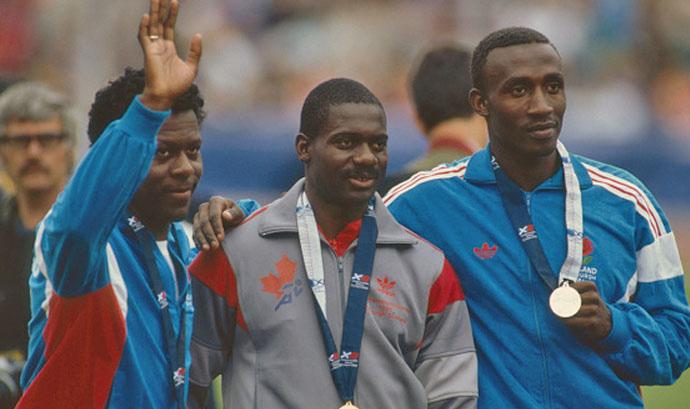
Just weeks later he added to his growing medal collection claiming a sprint relay bronze medal at the European Championships alongside Elliott Bunney, Thompson and Linford Christie.
But probably one of my most memorable moments was in early 1985, reporting on the European Indoor Athletic Championships in the port city of Piraeus, Athens. It was my very first ma or international athletic championship as a fresh-faced
member of the travelling British athletics press, and my Greek trip did not disappoint.
Mike was crowned Europe’s Indoor 60m sprint king and I recall shrugging off media protocol and leaving my seat and venturing track side to offer my personal congratulations .
On my return I interviewed Mike for The Voice at his family home and he recognised the significance of his achievement earning his second major championship gold medal coming off the back of his fifth place in the m final at the os ngeles Olympics.
Although I left sports reporting behind toward the late 80s, I continued to follow Mike’s career and often ran in to him socially and he would occasionally invite me to Duke of Edinburgh’s Awards presentations.
His sprint relay silver medal at the 1988 Seoul Olympics capped an impressive career and it came as no surprise when he moved into coaching after hanging up his running spikes in 1989.
Mike understood the importance of paying it forward and this was borne out in his day job with the Duke of Edinburgh’s Awards scheme and through his coaching guiding a new generation of talent which included Tony Jarrett, Marcus Adam, Darren Braithwaite, Joice Maduaka, Julian Golding, Dwain Chambers, Jodie Williams and Desiree
OUTSTANDING:
‘Mac’ in action for Haringey Athletics Club; above, sharing the 200m gold medal with Allan Wells at the 1982 Brisbane Games
Henry. His coaching nous would earn him a UK Athletics high performance coaching position in 2012 based at Lee Valley Athletics centre.
In 2001, he was rewarded with an OBE for services to athletics and the Duke of Edinburgh Awards, and was always generous with his time when I caught up with him either on the phone or in person.
ather fittingly he was interviewed for the Heritage Lottery funded Haringey Golden Years project which included a commemorative book. In the book he said he never saw himself as a role model and recalls his dad telling him that, “If you start to believe the hype you lose sight of the end product.”
any years after our first meeting our journey had gone full circle. Remarkably, we discovered we were close neighbours once again, and regularly ran into each other in our area of north east London.
In addition, the journey took another unexpected turn when we also discovered that we both received a regular trim at the same east London barbers where all things athletics were discussed.
I was privileged to go on part of the journey with Hackney’s very own Super ‘Mac’ and I am truly grateful that the sport of athletics took us both on such a memorable and rewarding ride.
Former Voice sports editor Richard Adeshiyan remembers embarking on a special journey with sprinter and three-time Olympian Mike McFarlane who passed away last month at the age of 63
RUGBY PLAYER Babalwa Latsha is a new signing for Harlequins’ front row, having been a prominent figure within both the Springboks’ 15s and 7s, being the first pro s rugby player in Africa.
Latsha comes from what she describes as a humble background, growing up in a township in the estern Cape called hayelitsha She overcame the odds to become an international rugby player while also completing her degree in law at the same time.
ff the field she is determined to inspire young girls and boys through life coaching and mentoring. She also serves as a director of a period poverty charity within outh frica Babalwa spoke to The Voice about her inspiring ourney
MC: What has your early experience of your new club, Harlequins, been like?
BL: I’ve grown to love the club and what it stands for I take everything that I’m able to achieve and experi-
ence here very much to heart It really bolsters my energy and confidence knowing I’m part of a club that is really magnificent and it ust really makes me even more excited about what’s to come in the future.
MC: What was the transition like moving from South Africa to the UK?
BL: The UK and back home is like two different worlds you cannot even
compare. From where I grew up, in a township trying to pursue my dreams in an environment that was never really conducive of that and then later in my life to find myself where I am now.
Having captained the national team and being the first female in frica to play professional rugby abroad and playing in one of the best leagues in the world, it has been a whirlwind of a ourney but it s one
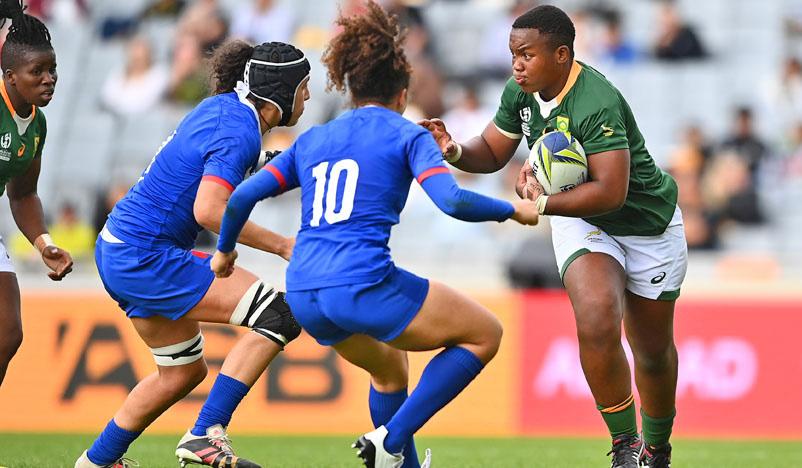
that I m en oying and really gives me hope for what’s to come for those that come after me.
Nothing beats home. Home will always be home but e periencing different environments is always a great challenge for me that I embrace. I think the experience here has made me a better rugby player and perhaps even a better human being.
MC: Where did your love for rugby come from?
BL: I picked up a rugby ball purely by chance it was more of a curiosity than anything hat curiosity then turned to passion, because in that space I found a place where it was acceptable for me to be myself
MC: There will be a lot of people looking up to you, how do you hope to use your position as a role model?
BL: Sports people – more than we realise have very powerful voices I ve made it my life s purpose to use those spaces as much as I can to be a positive role model. Where we come from should never determine our true tra ectory In life we can have
big dreams, and we can make them come true. I want to have a tangible impact on my community through the projects that I’m involved with which specifically target young women
I’m one of the directors of an organisation called the Menstruation oundation and what we do is fight period poverty e have a vending machine that we put in schools to ensure that every young girl has access to sanitary care and products
By doing that we are then able to keep them in school and in sport. y aim is to empower and educate young people including our boys about period poverty and to empower young women by creating safe spaces for them.
MC: What lasting legacy do you hope to leave when your career is over?
BL: I d really like to see myself having played another orld Cup more seasons in the arle uins ersey and be in a position where I can be of better positive in uence or me personally my measure of success would be how I m able to impact a young person s life positively
Presenter Joelah Noble believes England have the talent to win the World Cup.

THE LIONESSES are back in action at the orld Cup this summer as they look to build on their historic Euros victory and bring football home once again.
The tournament will begin on uly and continue right through until ugust when the final will be played in ydney at the ccor stadium.
head of the first match kicking off
The Voice sat down with London-born presenter Joelah Noble to preview the tournament. Joelah, right, was a co-presenter of the Lion’s Den football highlights show during the women’s Euros last summer.
The Voice: How excited are you for the upcoming World Cup?
JN: I’m super excited about it. I think anytime these sort of tournaments come around I m always engrossed I get fully involved I use it as an opportunity to hang out with my friends and get really competitive and also keep an eye on the players from each country I think the World Cup and Euros is a great opportunity to get to know more players I did the ionesses ive show for the Euros for England, so I feel like I’m a part of the England team anyway o I m definitely going to be fully involved in this tournament.
The Voice: What do you feel will be different about this World
Cup compared to the previous editions of the tournament?
JN: After the Euros, people are a lot more interested. I think in terms of numbers, we’ll get higher numbers, more coverage as well, which is good. Just more opportunities surrounding it.
I think we re definitely going to hear a lot more noise than we did the previous World Cup. I think from here on out, we’re just going to get bigger and better to be honest.
The Voice: How amazing is it to be a part of the growth yourself?
JN: It s ama ing honestly it feels a bit like a dream that I was even able to witness that win so close, it’s a beautiful feeling I can only imagine how they
feel hey actually went on the pitch and did it.
The Voice: What are your predictions, winners? Dark horses in the tournament?
JN: I ve got to back my girls the England squad. I spent so much time with them over the summer last year and I feel like I m a part of the team. I’ve gotten to know them on a more personal level, and I’ve been able to see their work ethic and how their mentality really helped them through the Euros. Of course, USA are a great team and I feel like they re definitely going to be the favourites to win. Spain’s also a good team.
The Voice: Some players to keep a close eye out for?

JN: Andrea Medina for Spain, I know she’s hard work. I’m rooting for Lauren James who is going to be in the England squad as well. So, I’m excited to see her in action. Ella Toone and lessia usso also I m really e cited to see how they present themselves on that stage.
The Voice: It felt like women’s football took off to another level after the Euros, do you believe we will see something similar after this World Cup?
JN: One hundred per cent, we won the Euros, so that’s a big deal in itself. From that tournament, a lot more peo-
By Matthew Chadderple have been interested, a lot more brands have been interested as well.
It s only natural that it s ust going to grow. The difference as well in the past with men’s and women’s football was just that we knew a lot
more of the male players e knew their names as more household names. Whereas with the women’s one historically we didn t really have that, but we’re getting there now, and I think we re definitely going to have a lot more of that.











